Sites: news | india | latam | brasil | indonesia
Feeds: news | india | latam | brasil | indonesia
topic: Bioenergy
Social media activity version | Lean version
UK’s Drax targets California forests for two major wood pellet plants
- Golden State Natural Resources (GSNR), a California state-funded nonprofit focused on rural economic development, along with the U.K.’s Drax, a global maker of biomass for energy, have signed an agreement to move ahead on a California project to build two of the biggest wood pellet mills in the United States.
- The mills, if approved by the state, would produce 1 million tons of pellets for export annually to Japan and South Korea, where they would be burned in converted coal power plants. The pellet mills would represent a major expansion of U.S. biomass production outside the U.S. Southeast, where most pellet making has been centered.
- GSNR promotes the pellet mills as providing jobs, preventing wildfires and reducing carbon emissions. California forest advocates say that cutting trees to make pellets —partly within eight national forests — will achieve none of those goals.
- Opponents note that the U.S. pellet industry is highly automated and offers few jobs, while the mills pollute rural communities. Clear-cutting trees, which is largely the model U.S. biomass firms use, does little to prevent fires and reduces carbon storage. Pellet burning also produces more emissions than coal per unit of energy produced.
Study: Burning wood pellets for energy endangers local communities’ health
- A new peer-reviewed study quantifies broadly for the first time the air pollution and public health impacts across the United States from both manufacturing wood pellets and burning them for energy.
- The study, said to be far more extensive than any research by the US Environmental Protection Agency, finds that U.S. biomass-burning facilities emit on average 2.8 times the amount of pollution of power plants that burn coal, oil or natural gas.
- Wood pellet manufacturers maintain that the harvest of forest wood for the purpose of making wood pellets to burn for energy remains a climate-friendly solution. But a host of studies undermine those claims.
- The Southern Environmental Law Center says the study provides new and rigorous science that could become a useful tool in arguing against the expansion of the wood pellet industry in the United States.
Indonesia pushes carbon-intensive ‘false solutions’ in its energy transition
- Indonesia’s newly revised plan for a $20 billion clean energy transition has come under criticism for offering “false solutions” that would effectively cancel out any gains it promises.
- One of its most controversial proposals is to not count emissions from off-grid coal-fired power plants that supply industrial users without feeding into the grid.
- Emissions from these so-called captive plants alone would exceed any emissions reductions projected under the rest of the Just Energy Transition Partnership.
- The plan also puts a heavy emphasis on “false” renewables solutions such as biomass cofiring and replacing diesel generators with natural gas ones.
Enviva, the world’s largest biomass energy company, is near collapse
- The forest biomass energy industry took a major hit this month, as Enviva, the world’s largest producer of wood pellets — burned in former coal power plants to make energy on an industrial scale — saw catastrophic third quarter losses. Enviva’s stock tanked, its CEO was replaced and the company seems near collapse.
- Founded in 2004, Enviva harvests forests in the U.S. Southeast, with its 10 plants key providers of wood pellets to large power plants in the EU, U.K., Japan and South Korea — nations that use a scientifically suspect carbon accounting loophole to count the burning of forest wood as a renewable resource.
- A former manager and whistleblower at Enviva told Mongabay in 2022 that the company’s green claims were fraudulent. Last week, he said that much of Enviva’s downfall is based on its cheaply built factories equipped with faulty machinery and on large-scale fiscal miscalculations regarding wood-procurement costs.
- How the firm’s downfall will impact the global biomass for energy market, and worldwide pellet supply, is unknown. European and Asian nations rely on Enviva pellets to supply their power plants and to meet climate change goals, with the burning of forests to make energy erroneously claimed as producing zero emissions.
Circular economy poised to go beyond outdated oil, gas and coal, experts say
- The exploitation of oil, gas and coal is now destabilizing all nine planetary boundaries and driving a triple crisis of climate change, biodiversity loss and pollution. The solution, experts say, is to move from a hydrocarbon-based linear economy to a diversified circular economy. This is Part 3 of a three-part miniseries.
- To step back from dangerous environmental thresholds, humanity needs to cut its use of fossil fuels, petroleum-based synthetic fertilizers and petrochemicals (especially plastics), with many analysts unequivocal about the unlikelihood of utilizing oil, gas and coal resources to implement a global circular economy.
- To achieve a circular economy, fossil fuels need to be phased out and alternative energy sources put in place. Bio-fertilizers need to be adopted and scaled up, and nitrogen fertilizers must be managed better to prevent overuse. Plastic production needs to be curbed, with a ban of single-use plastics as a start.
- Unfortunately, the world isn’t on target to achieve any of these goals soon, with surging oil and natural gas production by the U.S., Saudi Arabia and Russia expected to push the planet past the maximum 2° C (3.6° F) temperature increase agreed to in the 2015 Paris Accord — putting Earth at risk of climate catastrophe.
Aviation’s climate conundrum: More than sustainable fuels needed
- Critics and researchers caution that pinning aviation’s carbon-cutting hopes on sustainable aviation fuels (SAFs) is problematic. These fuels, derived from liquid biofuels, along with synthetic fuel options such as green hydrogen, have been produced in only miniscule amounts at high cost compared to what’s needed.
- Scaling SAFs up to cover all of the aviation industry’s carbon-reduction goals while avoiding environmental harm will be a mammoth technological and economic challenge, and may not be achievable in the time available as climate change rapidly escalates, say experts.
- Other solutions will almost assuredly be required: Hydrogen-powered or electric planes may be on the horizon for private or short-haul flights. But reducing emissions from commercial, long-haul flights remains a far greater challenge.
- A mixture of technological solutions, increased efficiencies in airplane design, better airport management, and new innovative policies, including controversial ideas to curb customer demand for air travel, are likely needed to cap and significantly bring down commercial aviation’s emissions fast.
Timber harvests to meet global wood demand will bring soaring emissions: Study
- At a time when the world desperately needs to reduce its carbon emissions, global timber harvests to meet soaring demand for wood products — including paper and biomass for energy — could produce more than 10% of total global carbon emissions over coming decades, a new groundbreaking study finds.
- Global wood consumption could grow by 54% between 2010 and 2050, creating a demand for timber that would result in a “clear-cut equivalent” in area roughly the size of the continental U.S., adding 3.5 to 4.2 gigatons of carbon dioxide to the atmosphere annually for years to come.
- The study scientists warn that flawed national climate policies and faulty carbon accounting are failing to accurately forecast these potential carbon emissions resulting from the cutting of natural forests.
- The researchers point out that less natural forests need to be cut to meet the rising global demand for wood products. That demand could partially be met by increasing wood production in already existing plantation forests.
Seas of grass may be dark horse candidate to fuel the planet — or not
- Several kinds of grasses and woody shrubs, such as poplar and willow, have undergone U.S. testing for years to see if they can achieve high productivity as cellulose-based liquid biofuels for cutting greenhouse gas emissions in the global transportation sector. Some of these grasses also would have value as cover crops.
- While these experiments showed promise, the challenges for scaling up production of grass and woody shrub-derived biofuels over the next few decades remain significant. And time is short, as climate change is rapidly accelerating.
- Another roadblock to large-scale production: Millions of acres of land in the U.S. Southeast and Great Plains states would need to be earmarked for grass cultivation to make it economically and commercially viable as a biofuel.
- If many of those millions of acres required conversion of natural lands to agriculture, then deforestation and biodiversity loss due to biofuel monoculture crop expansion could be a major problem. On the plus side, grass biofuel crops likely wouldn’t directly displace food crops, unlike corn to make ethanol, or soy to make biodiesel.
Report: Forest-razing biomass plant in Indonesia got millions in green funds
- An Indonesian oil and gas company is using government money to clear rainforest for a biomass power plant, according to a new report.
- The project has received a total of $9.4 million from two Ministry of Finance agencies, including one tasked with managing environmental protection funds from international donors.
- Criticism of Medco’s activities reflects a broader debate over whether clear-cutting rainforest can ever be considered sustainable, even when done in the name of transitioning a major coal-producing country away from fossil fuels.
Financial downturn at Enviva could mean trouble for biomass energy
- Enviva harvests trees to manufacture millions of tons of wood pellets annually in the U.S. Southeast to supply the biomass energy demands of nations in the EU, U.K., Japan and South Korea. But a host of operational, legal and public relations problems have led to greater-than-expected revenue losses and a drastic fall in stock price.
- These concerns (some of which Mongabay has reported on in the past) raise questions as to whether Enviva can double its projected pellet production from 6 million metric tons annually today to 13 million metric tons by 2027 to meet its contract obligations. Enviva says its problems pose only short-term setbacks.
- While it isn’t possible to connect Enviva’s stock decline, or the company’s downgrading by a top credit ratings agency, with any specific cause, some analysts say that investors may be getting educated as to the financial risk they could face if the EU or other large-scale biomass users eliminate their subsidies to the industry.
- “The financial risk is there, maybe not today, but in the future, where countries may say, ‘This massive [biomass carbon accounting] loophole is making the climate crisis worse. Let’s close it.’ When that happens, Enviva and all other pellet manufacturers are out of business,” and investors would suffer, according to one industry expert.
Sargassum surges in Mexico: From nuisance to new green industry?
- Since 2011, sargassum has worsened as a nuisance — possibly due to an influx of synthetic fertilizers into the Atlantic Ocean — with the brown algae washing up on Caribbean beaches where it rots, stinks like rotten eggs and devastates tourism, including in Mexico where 30 million go for beach holidays annually.
- Sea currents have made the beaches of the Mexican state of Quintana Roo a leading arrival point for the annual surge. So early on, scientists, members of civil society, politicians and businesspeople worked together to find solutions and turn the huge waste problem into an opportunity for new green businesses.
- Once cleaned of heavy metals, microplastics, sand and other detritus, sargassum is finding many uses, particularly as biogas, but also biofertilizer, cellulose packaging and even artificial vegan leather. But a national law regulating sargassum remains elusive, with the issue tangled up in Mexican bureaucracy.
- Debate is ongoing as to who should pay for disposal, for expensive recollection and transport of the algae. As entrepreneurs experiment, Mexico has become a regional leader in creating a sargassum industry, with other Caribbean nations seeking to learn from Mexico’s business mistakes and copying its successes.
From palm oil waste to cellulosic ethanol: Indonesia’s opportunity (commentary)
- Many Indonesian farmers say they haven’t seen benefits from the country’s biofuel program. Cellulosic ethanol could help fix the problem, a new op-ed says.
- Tenny Kristiana of the International Council on Clean Transportation argues Indonesia could develop a domestic cellulosic ethanol industry that would use leftover plant residues such as palm trunks, empty palm fruit bunches and palm press fiber.
- Currently, Indonesia exports these leftovers to countries like Japan, but developing an industry at home could aid local farmers and create new jobs in factories, transportation and plantation work.
- This post is a commentary. The views expressed are those of the author, not necessarily of Mongabay.
Crud-to-crude: The global potential of biofuels made from human waste
- Creating liquid biofuels from human waste shows promise as a way to meet one of alternative energy’s greatest challenges: reducing the transportation sector’s heavy carbon footprint. The good news is there is a steady supply stream where waste is treated.
- Humanity produces millions of tons of sewage sludge annually via wastewater treatment. Existing disposal methods include landfilling, application on agricultural land, and incineration; each with social and environmental consequences.
- Harnessing the carbon-rich potential of sludge as a transportation fuel for planes, ships and trucks is part of a drive toward zero waste and creating a circular economy, say experts. A host of projects are underway to prove the effectiveness of various methods of turning all this crud into biocrude.
- Some techniques show promise in lab and pilot tests, but large-scale industrial plants have yet to be built. Using pollutant-laden sewage sludge as a biofuel comes with its own environmental concerns, but lacking a silver-bullet solution to the human waste problem, it could be part of a suite of best alternatives.
As Exxon bows out, industry takes step toward sustainable algae biofuels
- In February, ExxonMobil gave up its decade-long attempt to cultivate algae as a profitable and scalable feedstock for biofuel — a liquid alternative energy source needed to power aviation, ocean-going ships, and long-distance trucking, while also combating climate change.
- That corporate setback was offset by advances elsewhere in the industry: California-based algae biofuel company Viridos, which lost ExxonMobil as its partner, raised $25 million this year as it gained United Airlines, Chevron and Breakthrough Energy Ventures as investors to keep its algae project moving toward commercialization.
- Also, this year, the U.S. Department of Energy Bioenergy Technologies Office (BETO) funded four major algae biofuel and biomass projects to chart scalable production processes and achieve low-carbon intensity efficiency.
- Several of these algae initiatives are now moving from basic R&D into pilot programs, with scaled-up commercial production possibly just a few years away, according to industry experts. Environmentalists are concerned about future land, energy and fertilizer impacts during production, though say it is too early to assess potential commercialization effects.
Jatropha: The biofuel that bombed seeks a path to redemption
- Earlier this century, jatropha was hailed as a “miracle” biofuel. An unassuming shrubby tree native to Central America, it was wildly promoted as a high-yielding, drought-tolerant biofuel feedstock that could grow on degraded lands across Latin America, Africa and Asia.
- A jatropha rush ensued, with more than 900,000 hectares (2.2 million acres) planted by 2008. But the bubble burst. Low yields led to plantation failures nearly everywhere. The aftermath of the jatropha crash was tainted by accusations of land grabbing, mismanagement, and overblown carbon reduction claims.
- Today, some researchers continue pursuing the evasive promise of high-yielding jatropha. A comeback, they say, is dependent on cracking the yield problem and addressing the harmful land-use issues intertwined with its original failure.
- The sole remaining large jatropha plantation is in Ghana. The plantation owner claims high-yield domesticated varieties have been achieved and a new boom is at hand. But even if this comeback falters, the world’s experience of jatropha holds important lessons for any promising up-and-coming biofuel.
EU woody biomass final policy continues threatening forests and climate: Critics
- The final revisions to the European Union’s Renewable Energy Directive (RED) were reached March 30, with nearly all environmental activists (who had lobbied intensely for changes for years), responding negatively to RED policies in support of forest biomass.
- The policy revisions will continue allowing the burning of the world’s forests to make energy, with emissions from EU powerplant smokestacks not counted. Wood pellets will still be classified as renewable energy on par with zero-carbon wind and solar, even though biomass releases more CO2 than coal, per unit of energy produced.
- While most forest advocates agree that the RED revisions made some small concessions to the environment, they say the biomass regulations include gaping loopholes that will allow the EU to heavily subsidize wood pellets made from trees harvested in Europe, the U.S. and Canada.
- Enviva, the world’s largest wood pellet producer, wrote that it “welcomes [the] REDIII agreement and continued recognition of biomass as 100% renewable.” Forest advocates say they will now shift their campaign strategy against biomass burning from focusing on the EU as a whole to efforts made in individual European nations.
A liquid biofuels primer: Carbon-cutting hopes vs. real-world impacts
- Liquid biofuels are routinely included in national policy pathways to cut carbon emissions and transition to “net-zero.” Biofuels are particularly tasked with reducing emissions from “hard-to-decarbonize” sectors, such as aviation.
- Three generations of biofuel sources — corn, soy, palm oil, organic waste, grasses and other perennial cellulose crops, algae, and more — have been funded, researched and tested as avenues to viable low-carbon liquid fuels. But technological and upscaling challenges have repeatedly frustrated their widespread use.
- Producing biofuels can do major environmental harm, including deforestation and biodiversity loss due to needed cropland expansion, with biofuel crops sometimes displacing important food crops, say critics. In some instances, land use change for biofuels can add to carbon emissions rather than curbing them.
- Some experts suggest that the holy grail of an efficient biofuel is still obtainable, with much to be learned from past experiments. Others say we would be better off abandoning this techno fix, investing instead in electrifying the transportation grid to save energy, and rewilding former biofuel croplands to store more carbon.
Japan, EU & UK biomass emissions standards fall short and are full of loopholes, critics say
- A global biomass boom continues unabated with Japan, the European Union and United Kingdom among those governments providing large subsidies for the burning of wood to make energy.
- All three governments have developed life cycle greenhouse gas emission standards for biomass power plants, but forest advocates say those standards rely on multiple loopholes to avoid any real carbon savings.
- Those loopholes include not counting carbon discharged from power plant smokestacks, the biggest source of emissions in the biomass life cycle, while continuing to erroneously count biomass as carbon neutral, according to industry critics.
- Another loophole grandfathers in existing biomass power plants, not requiring them to meet new greenhouse gas life cycle emission standards and, in Japan’s case, asking those plants to count but not reduce emissions.
France seeks EU okay to fund biomass plants, burn Amazon forest to power Spaceport
- As the European Union finalizes its third Renewable Energy Directive (REDIII), France is seeking an exemption to enable the European Space Agency and French Space Agency to build and operate two biomass power plants in French Guiana. An estimated 5,300 hectares of Amazon rainforest would need to be cut and biomass crops grown on the cleared land to service the power plants.
- The biomass would be burned to help power Europe’s Spaceport in French Guiana. The exemption request — which would allow EU and French public subsidies to flow to a France-based bioenergy plant builder — comes as the EU moves toward banning commodities contributing significantly to global deforestation.
- This latest move by France comes soon after it won an appeal of a 2021 court ruling in French Guiana that blocked massive Amazon clearcutting for croplands to provide liquid biofuels for three new, large power plants to make energy for the Fr. Guiana populace. Decisions on the REDIII exemption and liquid biofuels plan could come in March.
- Environmentalists are decrying the French Guiana biomass plans — and French President Emmanuel Macron’s passive support of them — not only for the Amazon deforestation it will cause, but because biomass burned to produce energy has been scientifically shown to release higher levels of carbon emissions than coal.
The EU banned Russian wood pellet imports; South Korea took them all
- In July 2022, the European Union responded to the war in Ukraine by banning the import of Russian woody biomass used to make energy. At roughly the same time, South Korea drastically upped its Russian woody biomass imports, becoming the sole official importer of Russian wood pellets for industrial energy use.
- The EU has reportedly replaced its Russian supplies of woody biomass by importing wood pellets from the U.S. and Eastern Europe. But others say that trade data and paper trails indicate a violation of the EU ban, with laundered Russian wood pellets possibly flowing through Turkey, Kazakhstan and Kyrgyzstan to multiple EU nations.
- EU pellet imports from Turkey grew from 2,200 tons monthly last spring to 16,000 tons in September. Imports from Kazakhstan and Kyrgyzstan reportedly rose too, even though neither has a forest industry. A large body of scientific evidence shows that woody biomass adds significantly to climate change and biodiversity loss.
- Enviva, the world’s largest woody biomass producer, which operates chiefly in the Southeast U.S., may be the big winner in the Russian biomass ban. Since the war began, Enviva has upped EU shipments, and also announced a 10-year contract with an unnamed European customer to deliver 800,000 metric tons of pellets annually by 2027.
Australia rejects forest biomass in first blow to wood pellet industry
- On December 15, Australia became the first major economy worldwide to reverse itself on its renewable classification for woody biomass burned to make energy. Under the nation’s new policy, wood harvested from native forests and burned to produce energy cannot be classified as a renewable energy source.
- That decision comes as the U.S., Canada, Eastern Europe, Vietnam and other forest nations continue gearing up to harvest their woodlands to make massive amounts of wood pellets, in order to supply biomass-fired power plants in the UK, EU, Japan, South Korea and elsewhere.
- In the EU, forest advocates continue with last-ditch lobbying efforts to have woody biomass stripped of its renewable energy designation, and end the ongoing practice of providing large subsidies to the biomass industry for wood pellets.
- Science has found that biomass burning releases more carbon dioxide emissions per unit of energy produced than coal. Australia’s decision, and the EU’s continued commitment to biomass, creates a conundrum for policymakers: How can major economies have different definitions of renewable energy when it comes to biomass?
As EU finalizes renewable energy plan, forest advocates condemn biomass
- The EU hopes to finalize its revised Renewable Energy Directive (RED) soon, even as forest advocates urge last minute changes to significantly cut the use of woody biomass for energy and make deep reductions in EU subsidies to the wood pellet industry.
- Forest advocates are citing a new commentary published in Nature that argues that the EU’s continued expansive commitment to burning forest biomass for energy will endanger forests in the EU, the U.S. and elsewhere — resulting in a major loss in global carbon storage and biodiversity.
- Changing RED to meet forest advocate recommendations seems unlikely at this point, with some policymakers arguing that woody biomass use is the only way the EU can achieve its 2030 coal reduction target. The woody biomass industry is pressing for sustained biomass use and for continued subsidies.
- Russia’s threat of reducing or cutting off its supply of natural gas to the EU this winter is also at issue. In the EU today, 60% of energy classified as renewable comes from burning biomass. If RED is approved as drafted, bioenergy use is projected to double between 2015 and 2050, according to the just published Nature commentary.
EU’s winter energy crisis intensifies pressure on forests (commentary)
- An energy crisis sparked by the war in Ukraine is intensifying pressure on Europe’s already besieged forests.
- Faced with having to choose whether to heat or eat, demand for firewood has surged as people return to this pre-industrial means of survival to get them through the coming winter. Big companies who burn wood for energy have also been lobbying policymakers to support their industry in the face of fossil fuel shortages.
- “Instead of pumping billions of euros of taxpayers’ money every year into burning biomass…financial support should be redirected towards policies which work: for people, for forests and our climate,” a new op-ed argues.
- This post is a commentary. The views expressed are those of the author, not necessarily Mongabay.
Cooking with the sun: Entrepreneurs help launch Mexico’s solar revolution
- Much of Mexico gets 300 days of sunshine out of the year which is helping make the country a solar energy pioneer. With the current government showing little interest in the clean sustainable technology, a range of entrepreneurs is leading the way, especially in the food industry.
- In the southern state of Oaxaca, Victoria Aguilera studied sustainable energy at the regional university and founded Sazón del Sol, a grassroots project that includes a solar farm, solar restaurant, and solar food processing workplace. She designed and now sells a solar kitchen for use in homes and restaurants.
- In central Mexico’s Hidalgo state, Gregor Schäpers’ company, Trinysol, achieved initial success with solar-powered water heaters. Now he’s experimenting with solar cooking using Scheffler modules — solar dish reflectors to run kitchens in restaurants, hotels, mezcal distilleries and tortilla bakeries.
- In the state of Jalisco, Angel Mejía and Aldo Agraz co-founded Inventive Power in 2010, specializing in thermal solar systems. Local food factories and dairies were their first clients. Since then, Mexican and international companies Nestlé, Barcel, Unilever, and tequila producer José Cuervo have all commissioned projects.
From a nuisance to a benefit, ‘world’s worst weed’ finds new use as biofuel
- A startup in western Kenya has developed a process of making bioethanol from water hyacinths, addressing both the need for a clean fuel alternative to charcoal and fuelwood, and the spread of the invasive hyacinths.
- Proponents say a key advantage of this “second-generation” bioethanol over traditional feedstocks such as sugarcane and corn is that it avoids competition for limited agricultural land.
- But although this new bioethanol relies on a plentiful feedstock and is cheaper to produce than charcoal, it’s still more expensive for end users because of limited distribution and the need to buy a compatible stove.
- Proponents say they’re determined to scale up production and distribution, pointing out that they’re “turning something harmful into something beneficial.”
Old-growth forests of Pacific Northwest could be key to climate action
- Coastal temperate rainforests are among the rarest ecosystems on Earth, with more than a third of their total remaining global area located in a narrow band in the U.S. and Canadian Pacific Northwest. These are some of the most biodiverse, carbon-dense forests outside the tropics, thus crucial to carbon sequestration.
- “The diversity of life that is all around us is incredibly rare,” a forest ecologist tells Mongabay on a hike in Olympic National Park. “It’s all working together. And there’s not much left here on the Olympic Peninsula or just north of us in British Columbia.”
- British Columbia did the unexpected in 2016 by establishing the Great Bear Rainforest Agreement, protecting 6.4 million hectares (15.8 million acres) of coastal old-growth forest. But elsewhere in the province, 97% of all tall, old-growth forest has been felled for timber and wood pellets. In the U.S., protection outside Olympic National Park is scant.
- New protections are promised, but old-growth logging continues apace. The U.N. says the world must aggressively reduce carbon emissions now, as scientists press the Biden administration to create a national Strategic Carbon Reserve to protect a further 20 million hectares (50 million acres) of mature forested federal lands from logging to help meet U.S. carbon-reduction goals by 2030.
Turning Kenya’s problematic invasive plants into useful bioenergy
- The shores of Lake Victoria are clogged with water hyacinth, a South American invasive plant that is hurting Kenya’s freshwater fishery, economy and people’s health. While manual removal is effective, it is labor intensive and can’t keep up with the spreading plant.
- Kenyans are innovating to find ways to reduce water hyacinth by finding practical uses for the invader. In 2018, a program was launched to turn the exotic species into biogas which is then offered to economically vulnerable households to use as a biofuel for cooking.
- One proposal being considered: a scaled up industrial biogas plant that would use water hyacinth as a primary source of raw material. Efforts are also underway to convert another invasive plant, prickly pear into biogas used for cooking. A biocontrol insect is also proving effective, though slow, in dealing with prickly pear.
- These economically viable and sustainable homegrown solutions are chipping away at Kenya’s invasive species problem, though to be truly effective, these various projects would need to be upscaled.
Indonesia bets on biofuels over oil, but EVs could render both moot
- Increased adoption of electric vehicles could render redundant Indonesia’s biofuel infrastructure, which the government is touting as its chosen alternative to fossil fuels.
- A new report projects demand for biofuel more than halving as EVs take hold, even as the government continues to invest heavily in refineries and other infrastructure for producing and distributing palm oil-based biodiesel.
- The report calls for a long-term plan for biofuel that takes into account the rapid development of EVs and that doesn’t rely solely on palm oil for feedstock.
Playing the long game: ExxonMobil gambles on algae biofuel
- Algae biofuel initially looked promising, but a few key problems have thwarted major research efforts, including development of a strain of algae able to produce plentiful cheap fuel, and scaling up to meet global energy demand.
- Other alternative energy solutions, including wind and solar power, are outpacing algae biofuel advances.
- Much more investment in money and time is needed for algae biofuel to become viable, even on an extended timeline out to mid-century. While big players like Shell and Chevron have abandoned the effort, ExxonMobil continues work.
- In 2017, ExxonMobil, with Synthetic Genomics, announced they had used CRISPR gene-editing technology to make an algal strain that could pave the way to a low-carbon fuel and a sustainable future. But many environmentalists met the claim with skepticism, suspecting greenwashing.
Biofuel in Mexico: Uphill battle against bureaucracy, organized crime
- Biofuels based on pressed plant oils, and made especially from used cooking oil, could help Mexico’s public transport sector transition to a cleaner and climate-friendly energy era, according to researchers and industry entrepreneurs.
- But there is a lack of government regulatory support, while the nation’s new president is betting on fossil fuels and neglecting biodiesel options and nature-based climate solutions.
- As a result, small biodiesel producers have to operate in a legal gray zone, while industry entrepreneurs are held back in the development of the technology and the market.
- Mexico isn’t alone: Many nations large and small are struggling with hurdles imposed by fossil fuel-friendly governments and a lack of supportive regulations to create a level playing field for the rapid development and deployment of biodiesel and other climate-friendly alternative energy solutions.
Converting biowaste to biogas could power cleaner, sustainable Earth future
- Biogas made from organic materials — including food and agricultural waste, and animal or human manure — is a renewable, sustainable, affordable and inclusive energy alternative becoming increasingly available to households, farms, municipalities and nations.
- Converting biowaste into biogas, via anaerobic digestion technology, is a strategy that could contribute to multiple U.N. Sustainable Development Goals and the Paris climate agreement. Biodigesters are already in use to meet a range of energy needs around the world.
- Current limiting factors to the sector’s growth include technical and adaptive challenges, lack of awareness in many regions, and unsupportive policy instruments that can discourage biogas adoption.
- Ahead of COP26, the critically important U.N. climate meeting coming this November, the World Biogas Association is urging governments to integrate biogas into their Nationally Determined Contributions — their voluntary emissions reduction targets, as agreed to under the Paris Agreement.
Cleaning up Cambodia’s kitchens could curb deforestation, climate change
- NGOs and companies across Cambodia are taking action in response to the mass use of charcoal and forest biomass in household and restaurant kitchens countrywide. The shift away from these polluting fuel sources to cleaner energy alternatives is being sparked by health and environmental concerns.
- Education is a key strategy for implementing the shift away from charcoal and wood, as their use is ingrained in the culture, with many Cambodians saying food doesn’t taste as good when cooked with other fuels.
- One innovative solution is turning the country’s coconut husks into “green charcoal,” which is already earning the nation recognition for being a global leader within the sustainable charcoal sector.
- Cambodia’s farmers are also moving away from using forest biomass for energy, and are instead utilizing biodigesters to turn household and farm waste into biogas for cooking and to make organic fertilizer.
Rush to turn ‘black diamonds’ into cash eats up Uganda’s forests, fruits
- As recently as 2018, only a little over 42% of Ugandans had access to electricity — many were too poor to afford it. As of 2016-17, 90% of all households burned wood fuel for cooking, with just 15.5% using charcoal in rural areas, but 66.4% of urban households using it.
- Those using charcoal account for roughly 23% of the country’s total population, which means that some 10.7 million citizens in a nation of 46.8 million rely on charcoal to cook their meals, based on recent U.N. data.
- Charcoal producers are working hard to meet this exploding demand, degrading and depleting the nation’s forest reserves, and now buying up fruit trees on private lands to make into briquettes. Many charcoal producers lack the licenses required by the government, so are cutting trees and making charcoal illegally.
- The surging charcoal industry is destroying Uganda’s forests and biodiversity, while briquette burning is also causing respiratory and other health problems, and its carbon emissions are adding significantly to global climate change.
American Forests CEO Jad Daley: ‘We are one nation under trees’
- For nearly 150 years, the group American Forests has been at the forefront of efforts to protect woodlands across the U.S., institute sustainable forestry management, and, more recently, mitigate against increasingly severe wildfires.
- Its president and CEO, Jad Daley, says forests remain a viable solution to contemporary problems ranging from the pandemic-induced economic crisis to social injustice to climate change.
- Investing in forest restoration and urban forestry generates jobs, Daley says, while also contributing to carbon sequestration and providing sustainable timber.
- In this interview with Mongabay founder and CEO Rhett A. Butler, Daley says he wants the forest movement to be “a place that feels relevant and welcoming for everyone.”
Madagascar introduces stoves that burn rice husks instead of forests
- Madagascar’s dependence on fuelwood is contributing significantly to the island’s deforestation.
- To meet demand, charcoal suppliers even take wood from protected areas and dig up tree stumps.
- A program aimed at changing wood consumption habits to alleviate pressure on both forests and household budgets is distributing new stoves that burn rice husks instead of charcoal.
- One million tons of rice husks go to waste in Madagascar each year. The program aims to turn this surplus into a biofuel that is cheaper and more sustainable than wood.
Dodgy science and corporate concessions in Indonesia’s bid for clean palm oil
- Environmental activists and experts have questioned a new initiative by the Indonesian government to clean up the reputation of the country’s palm oil, which they warn could lead to an even less sustainable industry than at present.
- The plan risks permitting the legitimization of illegal plantations inside forests, effectively rewarding environmental violators.
- It also seeks to count palm oil-based biodiesel as a green offset to fossil fuels, despite overwhelming evidence showing that the production of the fuel will lead to greater deforestation and a net increase in carbon emissions.
- The plan also gives mining and other extractives companies an easy way out of their obligation to rehabilitate their degraded concessions, by permitting these areas to be planted with oil palms instead of being reforested.
Colombian town faces earthquakes, pollution, water shortage as industry expands
- Residents of the town of Puerto Gaitán say their water sources are being used for the cultivation of oil palm plantations and the extraction of crude oil.
- Studies have found water quality near the town qualifies as “poor” and water reserves have dropped off for many areas, forcing residents to import water from elsewhere.
- Locals say seismic tremors induced for oil extraction have damaged houses and soil.
- Researchers say wildlife populations have been harmed by agricultural chemicals used for palm oil production and habitat loss caused by expanding plantations.
‘Bring it on,’ EU MP says of trade fight over palm biofuel phase-out
- A European member of parliament says the bloc isn’t concerned about threats by Indonesia and Malaysia to file a trade complaint over an EU policy to phase out palm oil-based biofuels by 2030.
- The two Southeast Asian countries supply 85 percent of the world’s palm oil, and have denounced the EU policy as discriminatory.
- The EU has justified its decision on the environmental impact of palm oil production, notably the large-scale deforestation to clear land for palm plantations.
- Concerns have also been raised that Indonesia’s response of boosting its domestic production of palm-based biodiesel, which a minister calls “green fuel,” could actually result in a net increase in carbon emissions.
Indonesia eyes palm oil export boost to China amid mounting U.S. trade war
- Indonesia has welcomed a move by China to remove palm oil from its import tariff quota management.
- That would allow Indonesia, the world’s biggest producer of palm oil, to increase its exports to China, its No. 3 market.
- A senior Indonesian official said there would be no forest-clearing to support any anticipated increase in exports, with higher yields expected to come from better technology and seeds.
- The move presents a respite for Indonesia, which faces a biofuel phase-out in the EU and a likely increase in duties in India, its top two export markets.
Indonesia calls on palm oil industry, obscured by secrecy, to remain opaque
- The Indonesian government has called on the country’s palm oil companies to refrain from releasing their plantation data, citing national security, privacy and competition reasons.
- The publication of the data is a necessary part of sustainability certification under the Roundtable on Sustainable Palm Oil (RSPO).
- Activists say they fear that withholding the information will further damage the reputation of Indonesia’s palm oil industry, which is already beset by allegations of deforestation, land grabbing, and labor rights abuses.
- The government has for years sent out mixed messages about whether it will make available the plantation data, which activists say is crucial in helping resolve the hundreds of land disputes across Indonesia, most of them involving palm concessions.
Malaysia calls on Southeast Asia to back palm oil against ‘unfair’ claims
- The Malaysian government has called for support from fellow members of the Association of Southeast Asian Nations (ASEAN) to support the region’s palm oil industry in the wake of a European Union policy to stop recognizing the commodity as a biofuel.
- Malaysia and fellow ASEAN member Indonesia supply more than 80 percent of the world’s palm oil, while Singapore, another ASEAN state, is home to some of the world’s biggest palm oil companies and the banks that finance the industry.
- Malaysia’s minister of primary industries, Teresa Kok, says there’s a global campaign to portray the production of palm oil as exceptionally destructive, which she calls “extremely provocative and belittling.”
- While both the Malaysian and Indonesian governments have instated policies to curb the clearing of rainforest for palm plantations, there still remain challenges to ensuring sustainability across the wider industry, environmental activists say.
Indonesia’s threat to exit Paris accord over palm oil seen as cynical ploy
- A top Indonesian minister says the country may consider pulling out of the Paris climate agreement in retaliation for a European policy to phase out palm oil from biofuels by 2030.
- Luhut Pandjaitan, the coordinating minister for maritime affairs, says Indonesia, the world’s biggest producer of palm oil, can follow in the footsteps of the United States, which has declared its withdrawal from the climate pact, and Brazil, which is considering doing the same.
- The threat is the latest escalation in a diplomatic spat that has also seen Indonesia and Malaysia, the No. 2 palm oil producer, threaten retaliatory trade measures against the European Union.
- The EU says its policy is driven by growing consumer concerns about the sustainability of palm oil, which in Indonesia is often grown on plantations for which vast swaths of rainforest have had to be cleared.
Europe, in bid to phase out palm biofuel, leaves fans and foes dismayed
- Both palm oil producers and environmental activists alike have expressed dismay with a move by European officials to phase out palm-oil based biofuel by 2030.
- Officials in Indonesia and Malaysia, which together produce 85 percent of global supply of the commodity, say the move is discriminatory and have vowed a vigorous response, including lobbying EU member states to oppose it, bringing the matter before the WTO, and imposing retaliatory measures on goods from the EU.
- Environmental activists say the policy doesn’t go far enough, leaving loopholes that will allow palm oil produced under certain circumstances to continue being treated as a renewable fuel, thereby allowing for the expansion of palm estates into peat forests.
- They have also criticized the policy’s failure to label soybean oil as high risk, in light of growing evidence that deforestation linked to the cultivation of soy may be just as bad as or worse than that of palm oil.
Indonesian candidates find common ground in support for palm oil
- Indonesia’s two presidential candidates, Joko Widodo and Prabowo Subianto, have both pledged to increase the production and consumption of palm oil should they win the April 17 election.
- Environmental activists and experts have criticized the candidates for not addressing the negative aspects of palm oil production, which both are pushing as a feedstock for biodiesel, in what is seen as a voter-pleasing appeal to resource nationalism.
- Nearly 200 million people in Indonesia, home to the world’s third-largest rainforest and also the biggest producer of palm oil, are eligible to vote in the upcoming election.
COP24: Green groups warn of pitfalls in ‘forests for climate’ deal
- A declaration to protect and use forests as a tool to combat climate change has been lambasted by environmentalists.
- The declaration, initiated by the Polish government during the COP24 climate summit, could promote the burning of wood pellets for bioenergy, the environmentalists warn.
- Wood-based biomass is a controversial and hotly debated topic in climate discussions, with scientists finding it emits up to 50 percent more CO2 than coal. But its proponents, including the U.S. EPA, champion it as a “carbon neutral” source of energy.
Study finds widespread degradation, deforestation in African woodlands
- New research has found that deforestation rates between 2007 and 2010 in the woodlands of southern Africa were five times greater than previously thought.
- Similarly, carbon losses from the region during that time period were three to six times higher.
- The study used radar data, as opposed to visual satellite imagery, to measure the biomass found in southern Africa’s woodlands.
- Around 17 percent of the region’s area was degraded during the time period, the researchers found.
As biomass energy gains traction, southern US forests feel the burn
- An estimated 50 to 80 percent of southern wetland forest is now gone, and that which remains provides ecosystem services totaling $500 billion as well as important wildlife habitat. Logging is considered one of the biggest threats to the 35 million acres of remaining wetland forest in the southern U.S., and conservation organizations are saying this threat is coming largely from the wood pellet biomass industry.
- Touted as a renewable energy source, research shows wood pellets release more carbon dioxide than coal per megawatt of electricity produced and industry critics worry that incentivizing this energy source could actually be accelerating climate change.
- Experts argue that biomass energy effectively acts as a loophole for countries to under-report their carbon emissions and give a false impression of meeting Paris Agreement objectives. Research indicates pellet production plants also have a negative impact on air and water quality.
- But industry proponents say biomass energy is an important component of mitigating climate change and that regulations will ensure its sustainability.
Biofuel boost threatens even greater deforestation in Indonesia, Malaysia: Study
- A new report projects the global demand for palm oil-based biofuel by 2030 will be six times higher than today if existing and proposed policies in Indonesia, China and the aviation industry hold.
- That surge in demand could result in the clearing of 45,000 square kilometers (17,374 square miles) of forest in Indonesia and Malaysia, the world’s biggest palm oil producers, and the release of an additional 7 billion tons of CO2 emissions a year — higher than current annual emissions by the U.S.
- That impact could be tempered to some degree by the European Union, which plans to phase out all use of palm oil in its biofuel over the next three years, citing environmental concerns.
Fighting climate change with bioenergy may do ‘more harm than good’
- A new study finds land-use like grazing and managing forests for resource extraction may have released more carbon than previously thought. Its results indicate the world’s terrestrial vegetation is currently sequestering less than half its full carbon-storage potential.
- Of that missing half, the researchers discovered 42 to 47 percent is attributed to land uses that don’t technically change the vegetation cover type. The researchers say that climate change mitigation strategies often focus on reducing intensive land-use like deforestation, with less-intensive uses that don’t change cover type largely overlooked and under-researched.
- One of these less-intensive uses is managing forests for biomass energy production. Many countries are trying to replace fossil fuels with biomass energy in-line with international climate agreements like the Paris Accord.
- The researchers warn that strategies developed under the assumption that producing biomass energy doesn’t come at a carbon cost could harm efforts to fight climate change. They urge that in addition to stopping deforestation, the protection of forest functions, like carbon stocks, should be moved more into focus when it comes to land-use and climate change planning.
Renewable energy to power 139 countries? Scientists say it’s possible
- The research looked at the impacts of a 100-percent switch to renewable energy in 139 countries by 2050 on the climate, as well as air pollution and the economy.
- They calculated that the transition to wind, solar and hydropower will generate around 24 million net jobs.
- Switching to renewable sources of energy that don’t emit carbon into the atmosphere will also save trillions of dollars in the costs we would otherwise incur due to air pollution and the changing climate.
Adding the voice of forestry to the environmental movement (commentary)
- Addressing climate change and global environmental degradation will require a total rethinking of our relationship with the natural world, including forests.
- However, academics and researchers appear far more open to supporting lobbying from big industries such as bioenergy.
- Academic forestry should consider the impact this imbalance has upon the global sustainability movement.
- This post is a commentary. The views expressed are those of the author, not necessarily Mongabay.
Aggressive forest protection needed to meet US climate goals
- Despite how critical forest protection is to meeting climate goals, it is not currently seen as a climate priority in the U.S.
- In fact, the report notes, some government and forestry industry actors even promote increased logging as a solution to climate change, which has led to the forests of the coastal Southern United States becoming the largest source of wood pellet exports to Europe in recent years.
- Forest disturbance from logging in the Southern U.S. occurs at four times the rate that it does in the rainforests of South America, the authors of the report discovered, which is reducing the ability of the country’s forests to act as carbon sinks by at least 35 percent.
Investors learning to pay heed to community land rights
- Most conflicts besetting private investments in Africa – 63 percent – relate to pushing people off their lands.
- These conflicts affect agriculture, mining, and even green energy investments.
- In Southern Africa, 73 percent of conflicts turned violent and 73 percent halted work on the developments.
These Indonesian villages are powered by locally sourced sustainable energy
- An estimated 1.6 million poor households in Indonesia are not connected to the electricity grid.
- Indonesia’s national energy plan, which targets 35,000 megawatts of new generating capacity, relies primarily on coal and other fossil fuels.
- In rural, off-grid areas, the government has shown more support for renewable energy generation, but progress remains slow.
- In the meantime, villages like Reno on Flores Island have built their own small-scale renewable energy sources.
Amid epic drought, villagers bitter over Zimbabwean ethanol plant
- The Green Fuel plant in Chisumbanje in eastern Zimbabwe became operational in 2011.
- Since then the livelihood of local farming people, already thin, has become dire. Community members and advocacy groups offer a litany of complaints against the company.
- In April, Billy Rautenbach, the owner of the companies with a controlling stake in Green Fuel, was named in the Panama Papers as having offshore accounts, prompting calls for an investigation into his financial dealings that has yet to materialize.
Will Indonesia’s new palm oil subsidy undermine no-deforestation push?
- Questions remain about whether the CPO Fund will carry environmental safeguards and how its resources will be divided between its two main purposes: helping farmers increase their yields and subsidizing biodiesel.
- A senior adviser to the energy minister worries the subsidy, if administered haphazardly, could throw an unfortunate lifeline to the dwindling market for palm oil from deforestation, peatland coversion and land grabbing.
- The man who designed the fund says it’s all about sustainability because it will reduce dependence on foreign petroleum and shore up flagging palm oil prices.
Indonesia to squander fuel savings on biofuel subsidies that may drive deforestation, say groups
 Crude palm oil and palm fruit. Photos by Rhett A. Butler Instead of wisely investing the windfall generated by cutting petrol subsidies, Indonesia is poised to squander funds by increasing subsidies for biofuel production that could exacerbate social conflict and drive deforestation, warn environmental groups. Late last year, newly elected president Joko Widodo, popularly known […]
Crude palm oil and palm fruit. Photos by Rhett A. Butler Instead of wisely investing the windfall generated by cutting petrol subsidies, Indonesia is poised to squander funds by increasing subsidies for biofuel production that could exacerbate social conflict and drive deforestation, warn environmental groups. Late last year, newly elected president Joko Widodo, popularly known […]
Biomass burning accounts for 18% of CO2 emissions, kills a quarter of a million people annually
 Biomass burning takes many forms: wildfires, slash-and-burn agriculture, clearing forests and other vegetation, and even industrialized burning for energy production. Yet this burning—mostly manmade but also natural—takes a massive toll both on human health and the environment, according to a new paper in Journal of Geophysical Research: Atmospheres. “We calculate that 5 to 10 percent […]
Biomass burning takes many forms: wildfires, slash-and-burn agriculture, clearing forests and other vegetation, and even industrialized burning for energy production. Yet this burning—mostly manmade but also natural—takes a massive toll both on human health and the environment, according to a new paper in Journal of Geophysical Research: Atmospheres. “We calculate that 5 to 10 percent […]
Brazil should convert pasture, not cerrado for biofuel crops
 Sugar cane in the tropics. Photo by Rhett A. Butler. If Brazil wants to respect its commitment to reducing greenhouse gas emissions it should target low productivity cattle pasture rather than native cerrado for biofuel crops like sugar cane, argues a new paper published in Nature Climate Change. Brazil already has the world’s largest fleet […]
Sugar cane in the tropics. Photo by Rhett A. Butler. If Brazil wants to respect its commitment to reducing greenhouse gas emissions it should target low productivity cattle pasture rather than native cerrado for biofuel crops like sugar cane, argues a new paper published in Nature Climate Change. Brazil already has the world’s largest fleet […]
Featured video: U.S. forests decimated for ‘green’ bio-energy in Europe
Wetland forests in the southern U.S. are becoming the victims of a drive for so-called green energy in Europe, according to activist group Dogwood Alliance, which has produced a new video highlighting the issue. The activists contend that bio-energy that depends on chopping down forests not only devastates vital ecosystems, but actually emits more greenhouse […]
Logging may destabilize carbon in forest soils
 Logging in temperate zones may release more greenhouse gases than previously thought by destabilizing carbon stored in forest soils, argues a new paper published in the journal Global Change Biology-Bioenergy. The research involved analysis of carbon released from forest management practices in the northeastern United States. It found that while most models assume carbon stored […]
Logging in temperate zones may release more greenhouse gases than previously thought by destabilizing carbon stored in forest soils, argues a new paper published in the journal Global Change Biology-Bioenergy. The research involved analysis of carbon released from forest management practices in the northeastern United States. It found that while most models assume carbon stored […]
Brazil may lift ban on Amazon ethanol expansion
 In coming weeks Brazil will vote on a bill that would lift a ban on sugar cane mills across a large extent of the Amazon region, sparking fears that ethanol production could drive new deforestation and tarnish the country’s image as an attractive source biofuels for environmentally-conscious markets, reports Reuters. New cane plantations in the […]
In coming weeks Brazil will vote on a bill that would lift a ban on sugar cane mills across a large extent of the Amazon region, sparking fears that ethanol production could drive new deforestation and tarnish the country’s image as an attractive source biofuels for environmentally-conscious markets, reports Reuters. New cane plantations in the […]
Southern U.S. logging soars to meet foreign biofuel demand
 In order to meet the European Union’s goal of 20% renewables by 2020, some European utility companies are moving away from coal and replacing it with wood pellet fuel. The idea is simple: trees will regrow and recapture the carbon released in the burning of wood pellets, making the process supposedly carbon-neutral. But just like […]
In order to meet the European Union’s goal of 20% renewables by 2020, some European utility companies are moving away from coal and replacing it with wood pellet fuel. The idea is simple: trees will regrow and recapture the carbon released in the burning of wood pellets, making the process supposedly carbon-neutral. But just like […]
Sugarcane production impacting local climate in Brazil
 Intensification of Brazil’s sugarcane industry in response to rising demand for sugar-based ethanol could have impacts on the regional climate reports a new study by researchers from Arizona State University, Stanford University and the Carnegie Institution for Science. Following the conversion of cerrado grasslands into sugarcane in Brazil, a recent study in Geophysical Research Letters […]
Intensification of Brazil’s sugarcane industry in response to rising demand for sugar-based ethanol could have impacts on the regional climate reports a new study by researchers from Arizona State University, Stanford University and the Carnegie Institution for Science. Following the conversion of cerrado grasslands into sugarcane in Brazil, a recent study in Geophysical Research Letters […]
Nordic energy giant launches ‘no deforestation’ policy
 Neste Oil, a Finnish energy giant, has announced a new “no deforestation” policy [PDF] for sourcing palm oil. The company, which is one of the world’s largest buyers of palm oil, had faced criticism from environmentalists for purchasing palm oil potentially linked to rainforest and peatland destruction in southeast Asia. Under the new policy, Neste […]
Neste Oil, a Finnish energy giant, has announced a new “no deforestation” policy [PDF] for sourcing palm oil. The company, which is one of the world’s largest buyers of palm oil, had faced criticism from environmentalists for purchasing palm oil potentially linked to rainforest and peatland destruction in southeast Asia. Under the new policy, Neste […]
Is hemp the silver bullet for fighting climate change and creating green jobs?
 Though Obama has frequently spoken of the need for more “green jobs,” he has failed to acknowledge the inherent environmental advantages associated with a curious plant called hemp. One of the earliest domesticated crops, hemp is incredibly versatile and can be utilized for everything from food, clothing, rope, paper and plastic to even car parts. […]
Though Obama has frequently spoken of the need for more “green jobs,” he has failed to acknowledge the inherent environmental advantages associated with a curious plant called hemp. One of the earliest domesticated crops, hemp is incredibly versatile and can be utilized for everything from food, clothing, rope, paper and plastic to even car parts. […]
Biofuel boom could lead to life-threatening ozone pollution
 Not long ago biofuels were seen as one of the major tools to combat climate change, but a large number of studies in recent years have shown that many first generation biofuels may have little climate benefit—and some are actually harmful—and are also linked to rising food prices. Now, a new study in Nature Climate […]
Not long ago biofuels were seen as one of the major tools to combat climate change, but a large number of studies in recent years have shown that many first generation biofuels may have little climate benefit—and some are actually harmful—and are also linked to rising food prices. Now, a new study in Nature Climate […]
E.U. OKs biofuels produced from certified palm oil
 Palm fruit. Photo by Rhett Butler. The European Commission has approved palm oil-based biodiesel for the renewable fuels standard provided it is certified under the Roundtable for Sustainable Palm Oil (RSPO), a body that sets social and environmental criteria for palm oil production. The move, which could dramatically boost sales of palm oil in Europe, […]
Palm fruit. Photo by Rhett Butler. The European Commission has approved palm oil-based biodiesel for the renewable fuels standard provided it is certified under the Roundtable for Sustainable Palm Oil (RSPO), a body that sets social and environmental criteria for palm oil production. The move, which could dramatically boost sales of palm oil in Europe, […]
Palm oil industry hires lobbying powerhouse to overturn EPA ruling on biofuels
 Palm oil facility in Sumatra, Indonesia. The palm oil industry has hired lobbying powerhouse Holland & Knight to help overturn the Environmental Protection Agency’s finding that palm oil-based biodiesel fails to meet greenhouse gas emissions targets under the country’s Renewable Fuels Standard, reports The Hill. “Lobbying disclosure records show that the Malaysian Palm Oil Council, […]
Palm oil facility in Sumatra, Indonesia. The palm oil industry has hired lobbying powerhouse Holland & Knight to help overturn the Environmental Protection Agency’s finding that palm oil-based biodiesel fails to meet greenhouse gas emissions targets under the country’s Renewable Fuels Standard, reports The Hill. “Lobbying disclosure records show that the Malaysian Palm Oil Council, […]
Biofuel breakthrough: kelp could power cars
 Scientists have devised a new way to produce ethanol directly from seaweed, offering the potential to generate biofuels that don’t compete with terrestrial food production and won’t suck up scarce freshwater, reports a study published today in Science. Researchers from the Bio Architecture Lab in Berkeley, California engineered E. coli bacterium to digest brown seaweed […]
Scientists have devised a new way to produce ethanol directly from seaweed, offering the potential to generate biofuels that don’t compete with terrestrial food production and won’t suck up scarce freshwater, reports a study published today in Science. Researchers from the Bio Architecture Lab in Berkeley, California engineered E. coli bacterium to digest brown seaweed […]
EU’s biofuel push based on ‘flawed’ science
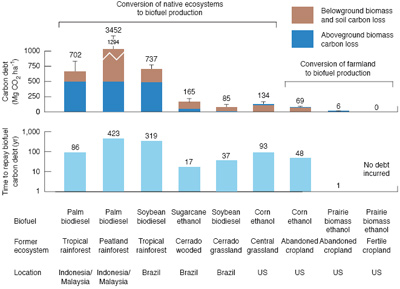 Europe’s biofuel push could exacerbate climate change unless policies are in place to accounts for emissions from indirect land use change, warns a letter signed by more than 100 scientists and economists. The letter, addressed to the European Commission, says the E.U. is deceiving itself and the public by asserting that biofuels are carbon neutral. […]
Europe’s biofuel push could exacerbate climate change unless policies are in place to accounts for emissions from indirect land use change, warns a letter signed by more than 100 scientists and economists. The letter, addressed to the European Commission, says the E.U. is deceiving itself and the public by asserting that biofuels are carbon neutral. […]
Palm oil, poverty, and conservation collide in Cameroon
- Industrial palm oil production is coming to Africa, its ancestral home. And like other places where expansion has occurred rapidly, the crop is spurring hope for economic development while generating controversy over its potential impacts.
- The world’s most productive oil seed has been a boon to southeast Asian economies, but the looming arrival of industrial plantations in Africa is raising fears that some of the same detriments that have plagued leading producers Malaysia and Indonesia—deforestation, greenhouse gas emissions, biodiversity loss, conflicts with local people, social displacement, and poor working conditions—could befall one of the world’s most destitute regions.
- While there is no question that oil palm is a highly lucrative crop that can contribute to economic development, there is also little doubt that conversion of native forests for plantations exacts a heavy toll on the environment.
Could palm oil help save the Amazon? (2011)
 This article is a longer version of story that appeared at Yale e360: In Brazil, Palm Oil Plantations Could Help Preserve Amazon. For years now, environmentalists have become accustomed to associating palm oil with large-scale destruction of rainforests across Malaysia and Indonesia. Campaigners have linked palm oil-containing products like Girl Scout cookies and soap products […]
This article is a longer version of story that appeared at Yale e360: In Brazil, Palm Oil Plantations Could Help Preserve Amazon. For years now, environmentalists have become accustomed to associating palm oil with large-scale destruction of rainforests across Malaysia and Indonesia. Campaigners have linked palm oil-containing products like Girl Scout cookies and soap products […]
Could palm oil help save the Amazon?
- For years now, environmentalists have become accustomed to associating palm oil with large-scale destruction of rainforests across Malaysia and Indonesia.
- Campaigners have linked palm oil-containing products like Girl Scout cookies and soap products to smoldering peatlands and dead orangutans.
- Now with Brazil announcing plans to dramatically scale-up palm oil production in the Amazon, could the same fate befall Earth’s largest rainforest? With this potential there is a frenzy of activity in the Brazilian palm oil sector.
- Yet there is a conspicuous lack of hand wringing by environmentalists in the Amazon. The reason: done right, oil palm could emerge as a key component in the effort to save the Amazon rainforest. Responsible production there could even force changes in other parts of the world.
US southern forests face bleak future, but is sprawl or the paper industry to blame?
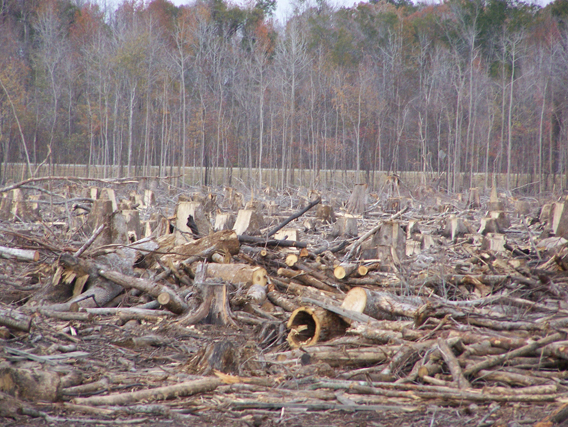 White Marsh Clearcut, outside of the Green Swamp, North Carolina, US. Photo by: Abigail Singer, courtesy of Dogwood Alliance. More people, less forests: that’s the conclusion of a US Forest Service report for forests in the US South. The report predicts that over the next 50 years, the region will lose 23 million acres (9.3 […]
White Marsh Clearcut, outside of the Green Swamp, North Carolina, US. Photo by: Abigail Singer, courtesy of Dogwood Alliance. More people, less forests: that’s the conclusion of a US Forest Service report for forests in the US South. The report predicts that over the next 50 years, the region will lose 23 million acres (9.3 […]
Sugar cane cools climate when it replaces cattle pasture
Converting cattle pasture and cropland in Brazil to sugar cane helps cool local climate reports research published in Nature Climate Change. Scientists with the Carnegie Institutions’s Department of Global Ecology at Stanford University and the University of Montana analyzed temperature, reflectivity, and evapotranspiration from satellite data across 733,000 square miles—an area larger than the state […]
Brazilian mining giant buys Amazon palm oil company
 Vale, a Brazilian mining giant, will buy palm oil producer Biopalma da Amazonia SA Reflorestamento Industria & Comercio, reports Bloomberg. The deal, valued at $173.5 million, will enable the mining company to run more of its operations on palm oil biodiesel. Vale began its palm oil push in 2009 when it formed a partnership with […]
Vale, a Brazilian mining giant, will buy palm oil producer Biopalma da Amazonia SA Reflorestamento Industria & Comercio, reports Bloomberg. The deal, valued at $173.5 million, will enable the mining company to run more of its operations on palm oil biodiesel. Vale began its palm oil push in 2009 when it formed a partnership with […]
Prairie grass-based biofuels could meet half current fuel demand without affecting forests, food
Biofuels could meet up to half the world’s current fuel consumption without affecting food production or forests, argues a study published last month in the journal Environmental Science and Technology. Analyzing the extent of marginal grasslands, including abandoned and degraded grassland, using data on soil, topography, climate and current land use, Ximing Cai of the […]
Dapatkah Biochar Selamatkan Dunia?
 Sebuah wawancara dengan Laurens Rademakers dari Biochar Fund. Biochar – penggunaan arang yang diproduksi dari membakar biomassa untuk pertanian – mungkin merupakan saru dari revolusi lingkungan dan sosial yang terpenting di abad ini. Praktek yang sepertinya sederhana ini – sebuah teknologi yang kembali ke ribuan tahun yang lalu – memiliki potensi untuk membantu mengurangi sebagian […]
Sebuah wawancara dengan Laurens Rademakers dari Biochar Fund. Biochar – penggunaan arang yang diproduksi dari membakar biomassa untuk pertanian – mungkin merupakan saru dari revolusi lingkungan dan sosial yang terpenting di abad ini. Praktek yang sepertinya sederhana ini – sebuah teknologi yang kembali ke ribuan tahun yang lalu – memiliki potensi untuk membantu mengurangi sebagian […]
EU’s biofuels target driving land grabs in Africa, says group
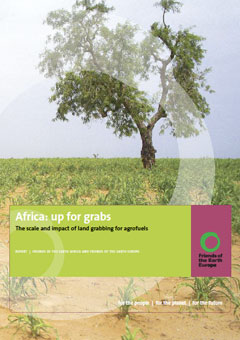 The European Union’s renewable fuels target is driving land grabs in Africa that threaten the environment and local communities, claims a new report from Friends of the Earth (FOE). Africa: up for grabs – The scale and impact of land grabbing for agrofuels [PDF] reviews a series of land deals signed across more than a […]
The European Union’s renewable fuels target is driving land grabs in Africa that threaten the environment and local communities, claims a new report from Friends of the Earth (FOE). Africa: up for grabs – The scale and impact of land grabbing for agrofuels [PDF] reviews a series of land deals signed across more than a […]
Could biochar save the world?
 An interview with Laurens Rademakers of Biochar Fund. Biochar—the agricultural application of charcoal produced from burning biomass—may be one of this century’s most important social and environmental revolutions. This seemingly humble practice—a technology that goes back thousands of years—has the potential to help mitigate a number of entrenched global problems: desperate hunger, lack of soil […]
An interview with Laurens Rademakers of Biochar Fund. Biochar—the agricultural application of charcoal produced from burning biomass—may be one of this century’s most important social and environmental revolutions. This seemingly humble practice—a technology that goes back thousands of years—has the potential to help mitigate a number of entrenched global problems: desperate hunger, lack of soil […]
Australian mammals in steady decline even in large National Park
 Kakadu National Park, one of the Australia’s “largest and best-resourced” protected areas, is experiencing a staggering decline in its small mammal population, according to a new study published in Wildlife Research. Spanning nearly 2 million hectares—larger than Fiji—the park lies in tropical northern Australia. “This decline is catastrophic,” John Woinarski, lead author of the study […]
Kakadu National Park, one of the Australia’s “largest and best-resourced” protected areas, is experiencing a staggering decline in its small mammal population, according to a new study published in Wildlife Research. Spanning nearly 2 million hectares—larger than Fiji—the park lies in tropical northern Australia. “This decline is catastrophic,” John Woinarski, lead author of the study […]
UE amanatkan standar lingkungan biofuel untuk lindungi hutan dan lahan basah
 UE kini bergerak untuk membuat standar lingkungan untuk biofuel yang digunakan di Eropa, mensyaratkan biofuel untuk memberikan “pengurangan substansial” pada emisi gas rumah kaca dan tidak menghasilkan perubahan fungsi hutan atau lahan basah, menurut pernyataan dari Komisi Eropa. Rencana ini meminta industri, pemerintah, dan LSM untuk menyiapkan “skema sukarela” yang memberikan sertifikasi bahwa biofuel yang […]
UE kini bergerak untuk membuat standar lingkungan untuk biofuel yang digunakan di Eropa, mensyaratkan biofuel untuk memberikan “pengurangan substansial” pada emisi gas rumah kaca dan tidak menghasilkan perubahan fungsi hutan atau lahan basah, menurut pernyataan dari Komisi Eropa. Rencana ini meminta industri, pemerintah, dan LSM untuk menyiapkan “skema sukarela” yang memberikan sertifikasi bahwa biofuel yang […]
Foto-foto tunjukkan daerah mirip-surga untuk lokasi pembangkit listrik batu bara di Borneo
 Dengan seluruh perhatian dunia sedang mengarah pada bencana lingkungan di Teluk Meksiko, banyak yang mulai merenungkan kebenaran dari tidak hanya Amerika, tapi ketergantungan dunia akan bahan bakar fossil. Meski begitu proyek-proyek pengadaan energi berbahan bakar fosil skala besar terus berjalan maju, termasuk di kota Sabah, Malaysia di Borneo yang akan membangun 300 MW pembangkit listrik […]
Dengan seluruh perhatian dunia sedang mengarah pada bencana lingkungan di Teluk Meksiko, banyak yang mulai merenungkan kebenaran dari tidak hanya Amerika, tapi ketergantungan dunia akan bahan bakar fossil. Meski begitu proyek-proyek pengadaan energi berbahan bakar fosil skala besar terus berjalan maju, termasuk di kota Sabah, Malaysia di Borneo yang akan membangun 300 MW pembangkit listrik […]
EU mandates biofuel environmental standards to protect forests, wetlands
 The E.U. today moved to establish environmental standards for biofuels used in Europe, requiring biofuels to deliver “substantial reductions” in greenhouse gas emissions and not result in conversion of forests or wetlands, according to a statement from the European Commission. The plan calls for industry, governments and NGOs to set up “voluntary schemes” which certify […]
The E.U. today moved to establish environmental standards for biofuels used in Europe, requiring biofuels to deliver “substantial reductions” in greenhouse gas emissions and not result in conversion of forests or wetlands, according to a statement from the European Commission. The plan calls for industry, governments and NGOs to set up “voluntary schemes” which certify […]
Brazil luncurkan dorongan besar untuk minyak kelapa berkelanjutan di Amazon
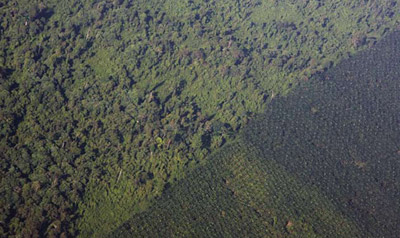 Usaha minyak kelapa “yang berkesinambungan” dapat menekan Malaysia dan Indonesia dalam prestasi di area lingkungan hidup dari minyak sayur yang banyak digunakan. Presiden Brazil Lula da Silva, hari Kamis menjelaskan rencana untuk memperluas produksi minyak kelapa di Amazon sambil meminimalkan resiko di hutan hutan terbesar di dunia, lapor Globo dan Terra Brasil. Rencana ini, disebut […]
Usaha minyak kelapa “yang berkesinambungan” dapat menekan Malaysia dan Indonesia dalam prestasi di area lingkungan hidup dari minyak sayur yang banyak digunakan. Presiden Brazil Lula da Silva, hari Kamis menjelaskan rencana untuk memperluas produksi minyak kelapa di Amazon sambil meminimalkan resiko di hutan hutan terbesar di dunia, lapor Globo dan Terra Brasil. Rencana ini, disebut […]
Photos reveal paradise-like site for coal plant in Borneo
 With the world’s eyes on the environmental catastrophe in the Gulf of Mexico, many are beginning to ponder the rightness of not just America’s, but the world’s dependence on fossil fuels. Yet large-scale fossil-fuel energy projects continue to march ahead, including one in the Malaysian state of Sabah on Borneo to build a 300 MW […]
With the world’s eyes on the environmental catastrophe in the Gulf of Mexico, many are beginning to ponder the rightness of not just America’s, but the world’s dependence on fossil fuels. Yet large-scale fossil-fuel energy projects continue to march ahead, including one in the Malaysian state of Sabah on Borneo to build a 300 MW […]
Brazil launches major push for sustainable palm oil in the Amazon
 “Sustainable” palm oil effort may pressure Malaysia and Indonesia on environmental performance of widely used vegetable oil. Brazilian President Lula da Silva on Thursday laid out plans to expand palm oil production in the Amazon while minimizing risk to Earth’s largest rainforest, reports Globo and Terra Brasil. The plan, called the Program for Sustainable Production […]
“Sustainable” palm oil effort may pressure Malaysia and Indonesia on environmental performance of widely used vegetable oil. Brazilian President Lula da Silva on Thursday laid out plans to expand palm oil production in the Amazon while minimizing risk to Earth’s largest rainforest, reports Globo and Terra Brasil. The plan, called the Program for Sustainable Production […]
Pengembang Minyak Kelapa Merengsek Hingga Perbatasan Terakhir Indonesia: Papua
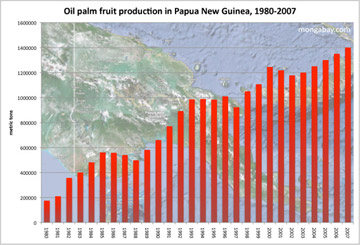 Pengembang minyak kelapa di bagian Indonesia dari Papua Nugini menandatangani perjanjian yang meragukan yang mengeksploitasi masyarakat lokal dan menempatkan ekosistem hutan yang cukup penting beresiko, menurut sebuah laporan baru dari Environmental Investigation Agency (EIA) dan Telapak. Laporan tersebut, “Up for Grabs”, memperingatkan bahwa lima juta hektar dari lahan Papua dan Papua Barat sedang menjadi target […]
Pengembang minyak kelapa di bagian Indonesia dari Papua Nugini menandatangani perjanjian yang meragukan yang mengeksploitasi masyarakat lokal dan menempatkan ekosistem hutan yang cukup penting beresiko, menurut sebuah laporan baru dari Environmental Investigation Agency (EIA) dan Telapak. Laporan tersebut, “Up for Grabs”, memperingatkan bahwa lima juta hektar dari lahan Papua dan Papua Barat sedang menjadi target […]
Amazon rainforest will bear cost of biofuel policies in Brazil
 Business-as-usual agricultural expansion to meet biofuel production targets for 2020 will take a heavy toll on Brazil’s Amazon rainforest in coming years, undermining the potential emissions savings of transitioning from fossil fuels to biofuels, warns a new paper published in the Proceedings of the National Academy of Sciences (PNAS). The research suggests that intensification of […]
Business-as-usual agricultural expansion to meet biofuel production targets for 2020 will take a heavy toll on Brazil’s Amazon rainforest in coming years, undermining the potential emissions savings of transitioning from fossil fuels to biofuels, warns a new paper published in the Proceedings of the National Academy of Sciences (PNAS). The research suggests that intensification of […]
EU: rainforests can be converted to palm oil plantations for biofuel production
 The European Union may be planning to classify oil palm plantations as forests, raising fears among environmental groups of expanded conversion of tropical rainforests for biofuel production, reports the EUobserver, which cites a leaked document from the European Commission. The draft document [PDF] shows that policymakers are considering language that would specifically allow use of […]
The European Union may be planning to classify oil palm plantations as forests, raising fears among environmental groups of expanded conversion of tropical rainforests for biofuel production, reports the EUobserver, which cites a leaked document from the European Commission. The draft document [PDF] shows that policymakers are considering language that would specifically allow use of […]
UK failing to meet biofuel sustainability standard
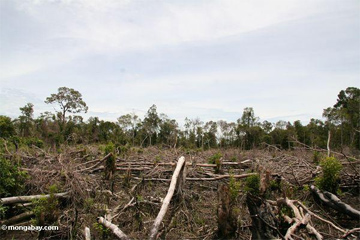 Only 4 percent of biofuel imported for use in the UK — and 20 percent of biofuel used overall — meets the environmental sustainability standard set by the Renewable Transport Fuel Obligation (RFTO), reports a new assessment from the Renewable Fuels Agency. The report found Britain exceeded its overall biofuel target of 2.5 percent of […]
Only 4 percent of biofuel imported for use in the UK — and 20 percent of biofuel used overall — meets the environmental sustainability standard set by the Renewable Transport Fuel Obligation (RFTO), reports a new assessment from the Renewable Fuels Agency. The report found Britain exceeded its overall biofuel target of 2.5 percent of […]
Company seeks to log forest reserve for palm oil in Uganda
 A company in Uganda is pressuring the environment ministry to allow it to log a protected forest reserve to establish a palm oil plantation, reports The New Vision. BIDCO, a Kenyan company, has been lobbying since 2006 to log the forest reserve on Bugala island in Lake Victoria, but has face stiff resistance due to […]
A company in Uganda is pressuring the environment ministry to allow it to log a protected forest reserve to establish a palm oil plantation, reports The New Vision. BIDCO, a Kenyan company, has been lobbying since 2006 to log the forest reserve on Bugala island in Lake Victoria, but has face stiff resistance due to […]
Consumers should help pay the bill for ‘greener’ palm oil
 A version of this article appeared today in the Jakarta Post Palm oil is one of the world’s most traded and versatile agricultural commodities. It can be used as edible vegetable oil, industrial lubricant, raw material in cosmetic and skincare products and feedstock for biofuel production. Growing global demand for palm oil and the ensuing […]
A version of this article appeared today in the Jakarta Post Palm oil is one of the world’s most traded and versatile agricultural commodities. It can be used as edible vegetable oil, industrial lubricant, raw material in cosmetic and skincare products and feedstock for biofuel production. Growing global demand for palm oil and the ensuing […]
Efforts to slow climate change may put indigenous people at risk
 Efforts to slow climate change are putting indigenous people at risk, warns a new report published by Survival International, an indigenous rights’ group. The report, ‘The most inconvenient truth of all: climate change and indigenous people,’ argues that lack of recognition of indigenous land use leaves them vulnerable to displacement and environmental harm by projects […]
Efforts to slow climate change are putting indigenous people at risk, warns a new report published by Survival International, an indigenous rights’ group. The report, ‘The most inconvenient truth of all: climate change and indigenous people,’ argues that lack of recognition of indigenous land use leaves them vulnerable to displacement and environmental harm by projects […]
Palm oil developers push into Indonesia’s last frontier: Papua
 Oil palm developers in the Indonesian half of New Guinea are signing questionable deals that exploit local communities and put important forest ecosystems at risk, alleges a new report from Environmental Investigation Agency (EIA) and Telapak. The report, “Up for Grabs”, warns that five million hectares of land in Papua and West Papua are being […]
Oil palm developers in the Indonesian half of New Guinea are signing questionable deals that exploit local communities and put important forest ecosystems at risk, alleges a new report from Environmental Investigation Agency (EIA) and Telapak. The report, “Up for Grabs”, warns that five million hectares of land in Papua and West Papua are being […]
Carbon accounting must not neglect emissions from bioenergy production and use
 Carbon accounting used in the Kyoto Protocol and other climate legislation currently neglects CO2 emissions from the production of biofuels, a loophole that could drive large-scale destruction of tropical forests and exacerbate global warming, warned researchers writing last week in the journal Science. Jerry Melillo and a dozen co-authors noted that the Kyoto Protocol, the […]
Carbon accounting used in the Kyoto Protocol and other climate legislation currently neglects CO2 emissions from the production of biofuels, a loophole that could drive large-scale destruction of tropical forests and exacerbate global warming, warned researchers writing last week in the journal Science. Jerry Melillo and a dozen co-authors noted that the Kyoto Protocol, the […]
EU biofuels policy undermines governance in Indonesia, alleges report
 Indonesian authorities are failing to prevent illegal logging and conversion of protected areas for oil palm cultivation used to supply the European market with supposedly “green” biofuels, alleges a new report from Milieudefensie (Friends of the Earth Netherlands) and WALHI KalBar (Friends of the Earth Indonesia, West Kalimantan). The report, “Failing governance – Avoiding responsibilities” […]
Indonesian authorities are failing to prevent illegal logging and conversion of protected areas for oil palm cultivation used to supply the European market with supposedly “green” biofuels, alleges a new report from Milieudefensie (Friends of the Earth Netherlands) and WALHI KalBar (Friends of the Earth Indonesia, West Kalimantan). The report, “Failing governance – Avoiding responsibilities” […]
US subsidies of oil and coal more than double the subsidies of renewable energy
 During the fiscal years of 2002-2008 the United States handed out subsidies to fossil fuel industries to a tune of 72 billion dollars, while renewable energy subsidies, during the same period, reached 29 billion dollars. Conducted by the Environmental Law Institute (ELI) in partnership with the Woodrow Wilson International Center for Scholars, the research shows […]
During the fiscal years of 2002-2008 the United States handed out subsidies to fossil fuel industries to a tune of 72 billion dollars, while renewable energy subsidies, during the same period, reached 29 billion dollars. Conducted by the Environmental Law Institute (ELI) in partnership with the Woodrow Wilson International Center for Scholars, the research shows […]
Brazil may ban sugarcane plantations from the Amazon, Pantanal
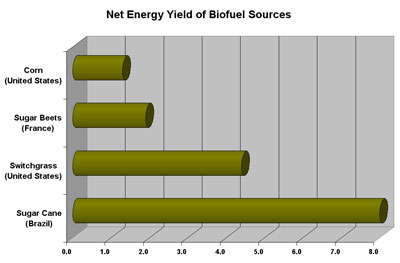 Brazil will restrict sugarcane plantations for ethanol production from the Amazon, the Pantanal, and other ecologically-sensitive areas under a plan announced Thursday by President Luiz Inacio Lula da Silva’s administration, reports the Associated Press. Environment Minister Carlos Minc said the proposal, which will be voted on by Congress next year, would limit sugar growing to […]
Brazil will restrict sugarcane plantations for ethanol production from the Amazon, the Pantanal, and other ecologically-sensitive areas under a plan announced Thursday by President Luiz Inacio Lula da Silva’s administration, reports the Associated Press. Environment Minister Carlos Minc said the proposal, which will be voted on by Congress next year, would limit sugar growing to […]
Will hydrocarbon biofuels replace gasoline and ethanol?
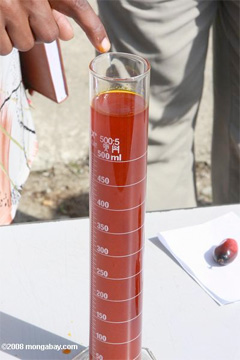 In a Perspectives piece in Science, John R. Regalbuto argues that the world will soon see a revolution in biofuels, but not those made from corn. Instead Regalbuto, program director of Catalysis and Biocatalysis at the National Science Foundation, says that the future of biofuels is in substances that can be converted into liquid hydrocarbons, […]
In a Perspectives piece in Science, John R. Regalbuto argues that the world will soon see a revolution in biofuels, but not those made from corn. Instead Regalbuto, program director of Catalysis and Biocatalysis at the National Science Foundation, says that the future of biofuels is in substances that can be converted into liquid hydrocarbons, […]
Limit palm oil development to lands that store less than 40 tons of carbon/ha – study
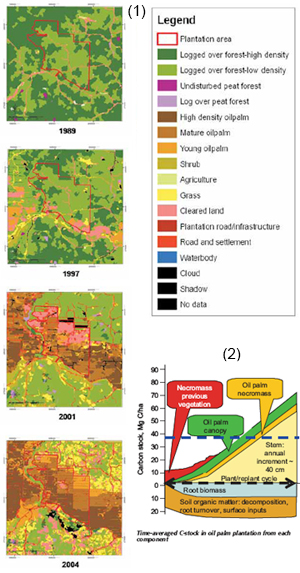 A new study finds oil palm plantations store less carbon than previously believed, suggesting that palm oil produced through the conversion of tropical forests carries a substantial carbon debt. The study, conducted at two sites in Sumatra and Kalimantan by scientists at the World Agroforestry Centre (ICRAF), found that mature oil palm plantations store less […]
A new study finds oil palm plantations store less carbon than previously believed, suggesting that palm oil produced through the conversion of tropical forests carries a substantial carbon debt. The study, conducted at two sites in Sumatra and Kalimantan by scientists at the World Agroforestry Centre (ICRAF), found that mature oil palm plantations store less […]
Beer waste to be used for home biofuel production
Southern California residents will soon be able to produce their own ethanol fuel from beer residue. GreenHouse, an alternative green energy company based in San Diego, California, has teamed with the Karl Strauss Brewing Company, to offer spent beer yeast as a biofuel feedstock for ethanol production in the E-Fuel MicroFueler, a portable ethanol micro-refinery […]
Smart biofuels that don’t hurt people or the environment are possible
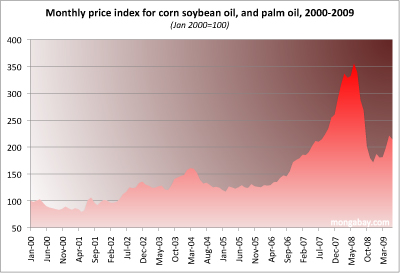 Sustainable biofuels can be a reality but only in combination with reductions in fuel demand and increased productivity on existing agricultural lands, argue researchers writing in the journal Science. Five years ago biofuels were seen as a panacea for the world’s energy hunger and the need to address climate change, but increased production of biofuels […]
Sustainable biofuels can be a reality but only in combination with reductions in fuel demand and increased productivity on existing agricultural lands, argue researchers writing in the journal Science. Five years ago biofuels were seen as a panacea for the world’s energy hunger and the need to address climate change, but increased production of biofuels […]
Brazilian miner Vale signs $500M palm oil deal in the Amazon
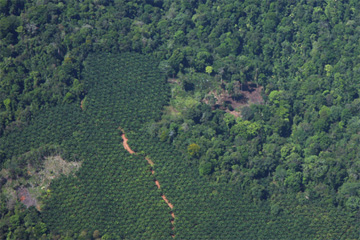 Vale, the world’s largest miner of iron ore, has signed a $500 million joint venture with Biopalma da Amazonia to produce 160,000 metric tons of palm oil-based biodiesel per year, reports Reuters. Vale says the deal will save $150 million in fuel costs starting in 2014, with palm oil biodiesel replacing up to 20 percent […]
Vale, the world’s largest miner of iron ore, has signed a $500 million joint venture with Biopalma da Amazonia to produce 160,000 metric tons of palm oil-based biodiesel per year, reports Reuters. Vale says the deal will save $150 million in fuel costs starting in 2014, with palm oil biodiesel replacing up to 20 percent […]
Congo biochar initiative will reduce poverty, protect forests, slow climate change
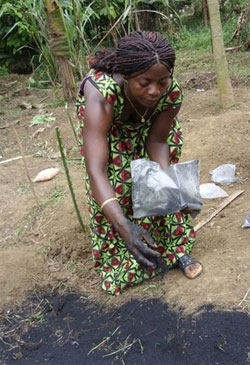 Congo biochar initiative wins critical funding to support poverty alleviation, climate change mitigation An initiative using soil carbon enrichment techniques to boost agricultural yields, alleviate poverty, and protect endangered forests in Central Africa was today selected as one of six projects to win funding under the Congo Basin Forest Fund (CBFF). The scientific committee of […]
Congo biochar initiative wins critical funding to support poverty alleviation, climate change mitigation An initiative using soil carbon enrichment techniques to boost agricultural yields, alleviate poverty, and protect endangered forests in Central Africa was today selected as one of six projects to win funding under the Congo Basin Forest Fund (CBFF). The scientific committee of […]
Bioelectricity bests ethanol on two fronts: land use and global warming
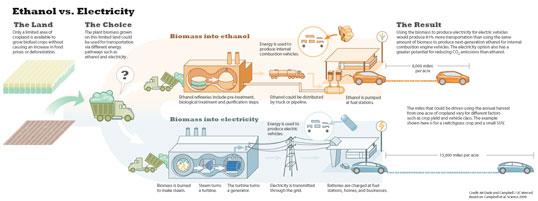 Yesterday the Obama Administration established a Biofuels Interagency Working Group to oversee implementation of new rules and research regarding biofuels. On the group’s first day they would do well to look at a new study in Science Magazine comparing the efficacy of ethanol versus bioelectricity. Researchers compared ethanol and bioelectricity in terms of miles per […]
Yesterday the Obama Administration established a Biofuels Interagency Working Group to oversee implementation of new rules and research regarding biofuels. On the group’s first day they would do well to look at a new study in Science Magazine comparing the efficacy of ethanol versus bioelectricity. Researchers compared ethanol and bioelectricity in terms of miles per […]
Biochar and its Role in Mitigating Climate Change
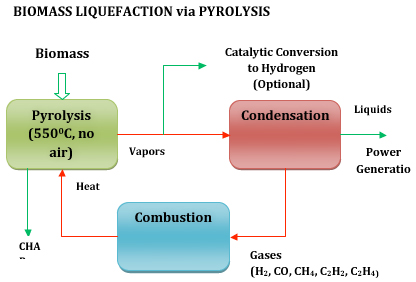 The growing concerns about climate change have brought biochar, a charcoal produced from biomass combustion, into limelight.
The growing concerns about climate change have brought biochar, a charcoal produced from biomass combustion, into limelight.
Finland, Sweden push for loophole that would drive destruction of peatlands around the world
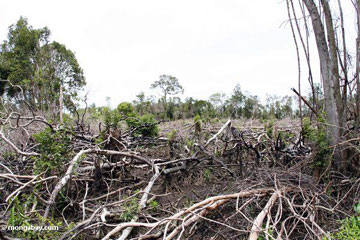 Finland, Sweden push for loophole that would drive destruction of peatlands around the world Finland, Sweden push for loophole that would drive destruction of peatlands around the world mongabay.com December 9, 2008
Finland, Sweden push for loophole that would drive destruction of peatlands around the world Finland, Sweden push for loophole that would drive destruction of peatlands around the world mongabay.com December 9, 2008
Cheetah conservationist awarded for renewable energy product that helps wildlife
 Cheetah conservationist wins award for renewable energy product that helps wildlife Cheetah conservationist awarded for renewable energy product that helps wildlife mongabay.com November 14, 2008
Cheetah conservationist wins award for renewable energy product that helps wildlife Cheetah conservationist awarded for renewable energy product that helps wildlife mongabay.com November 14, 2008
Biodiversity of rainforests should not be compared with oil palm plantations says palm oil council chief
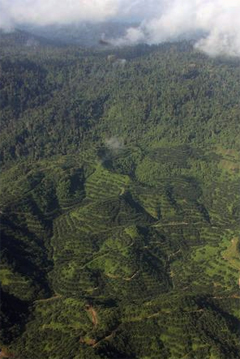 Scientists should not compare biodiversity of rainforests with oil palm plantations says palm oil council chief Biodiversity of rainforests should not be compared with oil palm plantations says palm oil council chief mongabay.com November 11, 2008 Dr. Yusof Basiron, the controversial CEO of the Malaysian Palm Oil Council (MPOC), blogs about the sustainability of palm […]
Scientists should not compare biodiversity of rainforests with oil palm plantations says palm oil council chief Biodiversity of rainforests should not be compared with oil palm plantations says palm oil council chief mongabay.com November 11, 2008 Dr. Yusof Basiron, the controversial CEO of the Malaysian Palm Oil Council (MPOC), blogs about the sustainability of palm […]
First RSPO-certified (“eco-friendly”) palm oil shipment to arrive in Europe
 First RSPO-certified (“eco-friendly”) palm oil shipment to arrive in Europe First RSPO-certified (“eco-friendly”) palm oil shipment to arrive in Europe mongabay.com November 10, 2008
First RSPO-certified (“eco-friendly”) palm oil shipment to arrive in Europe First RSPO-certified (“eco-friendly”) palm oil shipment to arrive in Europe mongabay.com November 10, 2008
EU’s sustainable biofuels push angers Malaysia, Brazil
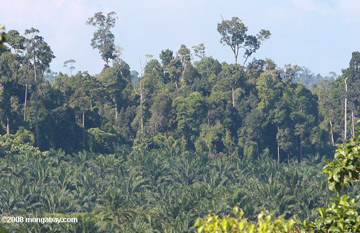 EU’s sustainable biofuels push angers Malaysia, Brazil EU’s sustainable biofuels push angers Malaysia, Brazil mongabay.com November 7, 2008
EU’s sustainable biofuels push angers Malaysia, Brazil EU’s sustainable biofuels push angers Malaysia, Brazil mongabay.com November 7, 2008
Air travel may be powered by biofuels in 3-5 years
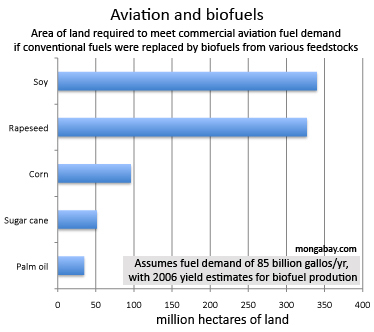 Air travel may be powered by biofuels in 3-5 years Air travel may be powered by biofuels in 3-5 years mongabay.com October 27, 2008 Boeing says biofuel-powered planes are only three-to-five years away from being a reality, reports The Guardian. “The certification will happen much sooner than anybody thought,” Darrin Morgan, Boeing’s director of environmental […]
Air travel may be powered by biofuels in 3-5 years Air travel may be powered by biofuels in 3-5 years mongabay.com October 27, 2008 Boeing says biofuel-powered planes are only three-to-five years away from being a reality, reports The Guardian. “The certification will happen much sooner than anybody thought,” Darrin Morgan, Boeing’s director of environmental […]
Cellulosic biofuels endanger old-growth forests in the southern U.S.
 Cellulosic biofuels endanger old-growth forests in the southern U.S. An interview with Scot Quandra of the Dogwood Alliance:Cellulosic biofuels endanger old-growth forests in the southern U.S. Jeremy Hance, mongabay.com October 16, 2008
Cellulosic biofuels endanger old-growth forests in the southern U.S. An interview with Scot Quandra of the Dogwood Alliance:Cellulosic biofuels endanger old-growth forests in the southern U.S. Jeremy Hance, mongabay.com October 16, 2008
U.S. needs environmental standards for biofuels
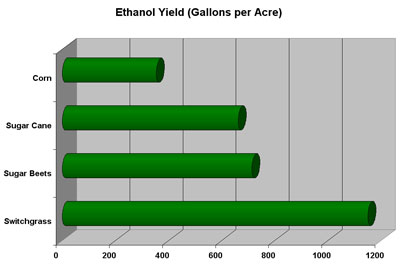 U.S. needs environmental standards for biofuels U.S. needs environmental standards for biofuels mongabay.com October 2, 2008
U.S. needs environmental standards for biofuels U.S. needs environmental standards for biofuels mongabay.com October 2, 2008
U.S. Congress passes legislation to boost solar, wind, and geothermal energy
U.S. Congress passes legislation to boost solar, wind, and geothermal energy U.S. Congress passes legislation to boost solar, wind, and geothermal energy mongabay.com September 24, 2008 Tuesday the U.S. Senate passed a bill that will extend tax credits on solar power installations through 2016. The House approved the measure Wednesday. The $17 billion package will […]
11 species of monkeys discovered in West African biodiversity hotspot
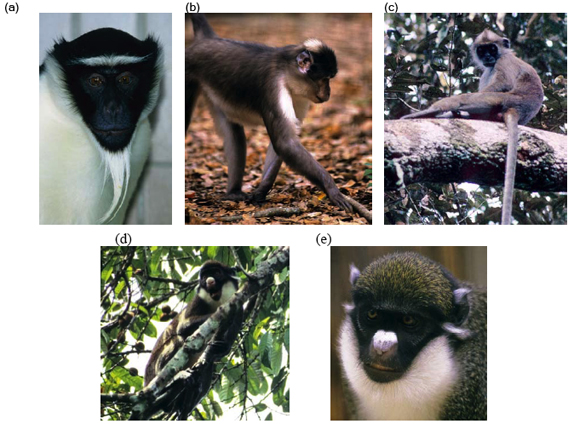 11 species of monkeys discovered in West African biodiversity hotspot 11 species of monkeys discovered in West African biodiversity hotspot mongabay.com September 15, 2008 Urgent conservation measures are needed to protect some of the world's most endangered primates from the hunting, logging, and oil palm development in a region that has only recently emerged from […]
11 species of monkeys discovered in West African biodiversity hotspot 11 species of monkeys discovered in West African biodiversity hotspot mongabay.com September 15, 2008 Urgent conservation measures are needed to protect some of the world's most endangered primates from the hunting, logging, and oil palm development in a region that has only recently emerged from […]
New rainforest sanctuary in Cameroon already at risk from plantations, hunting
 New rainforest sanctuary in Cameroon already at risk from plantations, hunting New rainforest sanctuary in Cameroon already at risk from plantations, hunting mongabay.com September 15, 2008 The forests of southern Cameroon bordering Gabon are biodiversity-rich and harbor important populations of gorillas, chimpanzees, and elephants. In 1998 the government of Cameroon established the Mengamé Gorilla Sanctuary […]
New rainforest sanctuary in Cameroon already at risk from plantations, hunting New rainforest sanctuary in Cameroon already at risk from plantations, hunting mongabay.com September 15, 2008 The forests of southern Cameroon bordering Gabon are biodiversity-rich and harbor important populations of gorillas, chimpanzees, and elephants. In 1998 the government of Cameroon established the Mengamé Gorilla Sanctuary […]
Europe cuts biofuel targets to 4% in 2015, 6% in 2020
 Europe cuts biofuel targets to 4% in 2015, 6% in 2020 Europe cuts biofuel targets to 4% in 2015, 6% in 2020 mongabay.com September 12, 2008 The European Union significantly reduces targets for biofuels produced from food sources, while boosting goals for other renewables The E.U. voted to relax biofuels targets following widespread criticism of […]
Europe cuts biofuel targets to 4% in 2015, 6% in 2020 Europe cuts biofuel targets to 4% in 2015, 6% in 2020 mongabay.com September 12, 2008 The European Union significantly reduces targets for biofuels produced from food sources, while boosting goals for other renewables The E.U. voted to relax biofuels targets following widespread criticism of […]
Falling palm oil price makes palm biodiesel viable, may offer target for NGOs
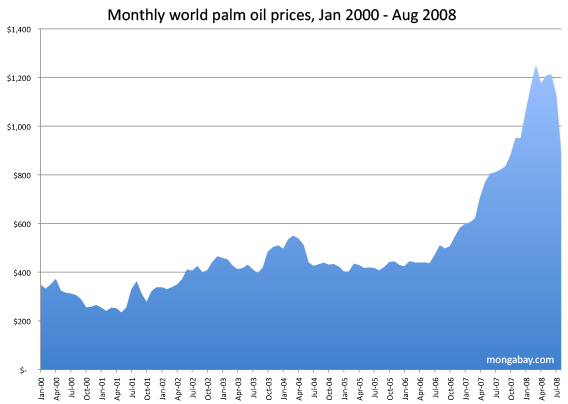 Falling palm oil price makes palm biodiesel viable, may offer target for NGOs Falling palm oil price makes palm biodiesel viable, may offer target for NGOs Commentary Rhett A. Butler, mongabay.com September 10, 2008 Plunging palm oil prices are increasing its attractiveness as a biofuel feedstock and thereby helping buoy demand for the oilseed, reports […]
Falling palm oil price makes palm biodiesel viable, may offer target for NGOs Falling palm oil price makes palm biodiesel viable, may offer target for NGOs Commentary Rhett A. Butler, mongabay.com September 10, 2008 Plunging palm oil prices are increasing its attractiveness as a biofuel feedstock and thereby helping buoy demand for the oilseed, reports […]
Palm oil producers in Indonesia reject moratorium on forest destruction
 Palm oil producers in Indonesia reject moratorium on forest destruction Palm oil producers in Indonesia reject moratorium on forest destruction mongabay.com August 28, 2008 Palm oil companies operating in Indonesia have rejected a proposed moratorium on clearing forests and peatlands for oil palm plantations, reports the Jakarta Post. The Indonesian Palm Oil Producers Association (GAPKI) […]
Palm oil producers in Indonesia reject moratorium on forest destruction Palm oil producers in Indonesia reject moratorium on forest destruction mongabay.com August 28, 2008 Palm oil companies operating in Indonesia have rejected a proposed moratorium on clearing forests and peatlands for oil palm plantations, reports the Jakarta Post. The Indonesian Palm Oil Producers Association (GAPKI) […]
Biofuels 200 times more expensive than forest conservation for global warming mitigation
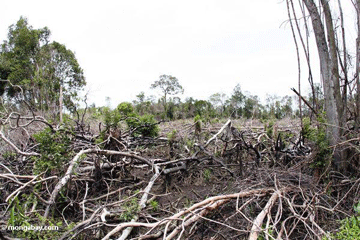 Biofuels up to 200 times more expensive than forest conservation for global warming mitigation Biofuels 200 times more expensive than forest conservation for global warming mitigation mongabay.com August 27, 2008 The British government should end subsidies for biofuels and instead use the funds to slow destruction of rainforests and tropical peatlands argues a new report […]
Biofuels up to 200 times more expensive than forest conservation for global warming mitigation Biofuels 200 times more expensive than forest conservation for global warming mitigation mongabay.com August 27, 2008 The British government should end subsidies for biofuels and instead use the funds to slow destruction of rainforests and tropical peatlands argues a new report […]
Biofuel production in Brazil may not hurt Amazon, food supply
Biofuel production in Brazil may not hurt Amazon, food supply Biofuel production in Brazil may not hurt Amazon, food supply mongabay.com August 21, 2008 Biofuel production in Brazil will not affect food production or the Amazon rainforest in coming years, claimed a study released Tuesday by an economist in Sao Paulo. Fábio Silveira of Brazil’s […]
Brazil to establish oil palm plantations on degraded Amazon rainforest lands
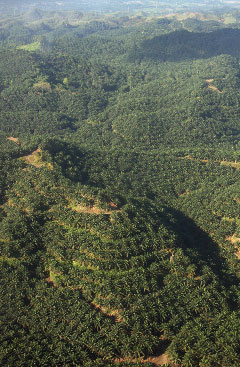 Brazil to establish oil palm plantations on degraded Amazon rainforest lands Brazil to establish oil palm plantations on degraded Amazon rainforest lands mongabay.com August 20, 2008 Brazil to compete with Malaysia in palm oil production but environmentalists worry redrawing of forest reserve law will hurt biodiversity conservation efforts. Brazil will allow the establishment of oil […]
Brazil to establish oil palm plantations on degraded Amazon rainforest lands Brazil to establish oil palm plantations on degraded Amazon rainforest lands mongabay.com August 20, 2008 Brazil to compete with Malaysia in palm oil production but environmentalists worry redrawing of forest reserve law will hurt biodiversity conservation efforts. Brazil will allow the establishment of oil […]
Algae could yield 30 times more biofuel than soybeans, while cleaning the environment
Algae could yield 30 times more biofuel than soybeans, while cleaning the environment Algae could yield 30 times more biofuel than soybeans, while cleaning the environment mongabay.com August 15, 2008 Algae could be used as a biofuel while simultaneously cleaning up the environment, report researchers at the University of Virginia. By feeding algae extra carbon […]
Brazil may ban new sugar cane cultivation in the Pantanal
 Brazil may ban new sugar cane cultivation in the Pantanal Brazil may ban new sugar cane cultivation in the Pantanal mongabay.com August 6, 2008 Brazil would restrict sugar cane cultivation in the world’s largest tropical wetland under a proposed plan to protect the Pantanal, reports Reuters. The proposal would ban new ethanol plants in the […]
Brazil may ban new sugar cane cultivation in the Pantanal Brazil may ban new sugar cane cultivation in the Pantanal mongabay.com August 6, 2008 Brazil would restrict sugar cane cultivation in the world’s largest tropical wetland under a proposed plan to protect the Pantanal, reports Reuters. The proposal would ban new ethanol plants in the […]
Facing criticism, biofuels industry forms new lobby group to influence lawmakers
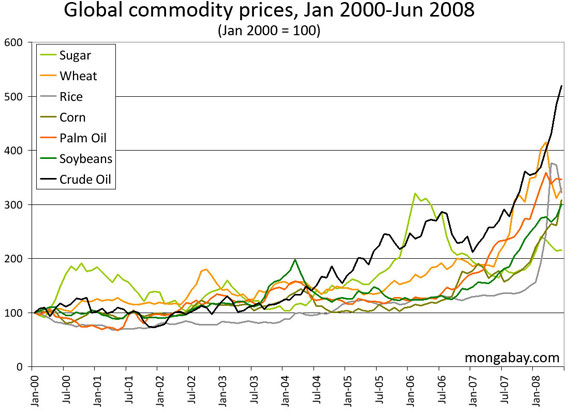 Facing criticism, biofuels industry forms new lobby group to influence lawmakers Facing criticism, biofuels industry forms new lobby group to influence lawmakers mongabay.com July 25, 2008 Under attack by politicians, aid groups, and environmentalists for driving up food prices and fueling destruction of ecologically sensitive habitats, some of the world’s largest agroindustrial firms have formed […]
Facing criticism, biofuels industry forms new lobby group to influence lawmakers Facing criticism, biofuels industry forms new lobby group to influence lawmakers mongabay.com July 25, 2008 Under attack by politicians, aid groups, and environmentalists for driving up food prices and fueling destruction of ecologically sensitive habitats, some of the world’s largest agroindustrial firms have formed […]
Biofuels can reduce emissions, but not when grown in place of rainforests
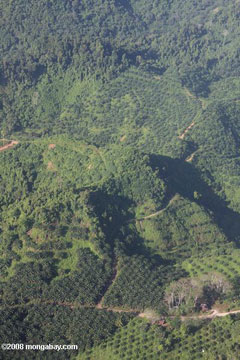 Biofuels can reduce emissions, but not when grown in place of rainforests Biofuels can reduce emissions, but not when grown in place of rainforests mongabay.com July 22, 2008 Biofuels meant to help alleviate greenhouse gas emissions may be in fact contributing to climate change when grown on converted tropical forest lands, warns a comprehensive study […]
Biofuels can reduce emissions, but not when grown in place of rainforests Biofuels can reduce emissions, but not when grown in place of rainforests mongabay.com July 22, 2008 Biofuels meant to help alleviate greenhouse gas emissions may be in fact contributing to climate change when grown on converted tropical forest lands, warns a comprehensive study […]
Beyond high food prices, little to show for $11B/yr in biofuel support, says OECD report
 Beyond high food prices, little to show for $11B/yr in biofuel support, says OECD report Beyond high food prices, little to show for $11B/yr in biofuel support, says OECD report mongabay.com July 17, 2008 Government support of biofuel production in rich countries is squandering vast amounts of amounts of money while exacerbating the global food […]
Beyond high food prices, little to show for $11B/yr in biofuel support, says OECD report Beyond high food prices, little to show for $11B/yr in biofuel support, says OECD report mongabay.com July 17, 2008 Government support of biofuel production in rich countries is squandering vast amounts of amounts of money while exacerbating the global food […]
Britain urges ‘cautious approach’ on biofuels
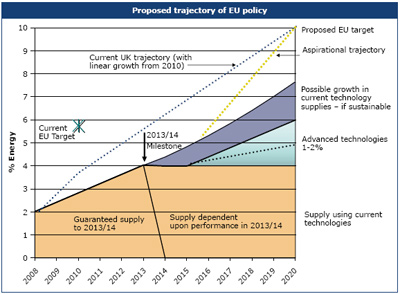 Britain urges ‘cautious approach’ on biofuels Britain urges ‘cautious approach’ on biofuels mongabay.com July 7, 2008 Britain and the E.U. should exercise caution in pushing for wider use of biofuels, warns a new study commissioned by the U.K. government. The report — dubbed the “Gallagher review” [PDF] for Ed Gallagher, the chair of the government’s […]
Britain urges ‘cautious approach’ on biofuels Britain urges ‘cautious approach’ on biofuels mongabay.com July 7, 2008 Britain and the E.U. should exercise caution in pushing for wider use of biofuels, warns a new study commissioned by the U.K. government. The report — dubbed the “Gallagher review” [PDF] for Ed Gallagher, the chair of the government’s […]
Sarawak to continue logging forests for oil palm plantations
 Sarawak to continue logging forests for oil palm plantations Sarawak to continue logging forests for oil palm plantations mongabay.com June 30, 2008 Despite a prime minister’s directive banning conversion of forest reserves for oil palm plantations, the Malaysian state of Sarawak will continue to open up forest land for oil palm plantations, reports the New […]
Sarawak to continue logging forests for oil palm plantations Sarawak to continue logging forests for oil palm plantations mongabay.com June 30, 2008 Despite a prime minister’s directive banning conversion of forest reserves for oil palm plantations, the Malaysian state of Sarawak will continue to open up forest land for oil palm plantations, reports the New […]
Brazil signs sustainable ethanol deal with Sweden
Brazil signs sustainable ethanol deal with Sweden Brazil signs sustainable ethanol deal with Sweden mongabay.com June 27, 2008 A group of Brazilian ethanol producers has signed the first deal to export certified sustainable ethanol, reports Reuters. Four firms — Cosan, Guarani, NovAmerica and Alcoeste — will sell 115 million liters of anhydrous ethanol certified to […]
Malaysian government says no more forest clearing for oil palm plantations
 Malaysia says no more clearing of forest reserves for oil palm plantations Malaysia says no more clearing of forest reserves for oil palm plantations mongabay.com June 26, 2008 Update: Sarawak to continue logging forests for oil palm plantations The Malaysian government said it will prohibit forest clearing for the establishment of oil palm plantations. Only […]
Malaysia says no more clearing of forest reserves for oil palm plantations Malaysia says no more clearing of forest reserves for oil palm plantations mongabay.com June 26, 2008 Update: Sarawak to continue logging forests for oil palm plantations The Malaysian government said it will prohibit forest clearing for the establishment of oil palm plantations. Only […]
Sarawak to continue logging forests for oil palm plantations
 Sarawak to continue logging forests for oil palm plantations Sarawak to continue logging forests for oil palm plantations mongabay.com June 30, 2008 Despite a prime minister’s directive banning conversion of forest reserves for oil palm plantations, the Malaysian state of Sarawak will continue to open up forest land for oil palm plantations, reports the New […]
Sarawak to continue logging forests for oil palm plantations Sarawak to continue logging forests for oil palm plantations mongabay.com June 30, 2008 Despite a prime minister’s directive banning conversion of forest reserves for oil palm plantations, the Malaysian state of Sarawak will continue to open up forest land for oil palm plantations, reports the New […]
Kenya to convert 20,000 ha of key wetland for ethanol production
Kenya to convert 20,000 ha of key wetland for ethanol production Kenya to convert 20,000 ha of key wetland for ethanol production mongabay.com June 25, 2008 The Kenyan government will allow more than 20,000 ha (50,000 acres) of ecologically-sensitive wetland to be converted into a sugar cane plantation for biofuel production, reports The Guardian. Environmentalists […]
Biofuel production on abandoned lands could meet 8% of global energy needs
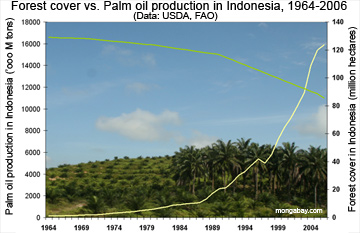 Biofuel production on abandoned lands could meet 20% of global oil demand Biofuel production on abandoned lands could meet 20% of global oil demand mongabay.com June 23, 2008 Using abandoned agricultural lands for biofuel production will meet only a small fraction of global energy needs without compromising food supplies or diminishing biologically-rich habitats, reports a […]
Biofuel production on abandoned lands could meet 20% of global oil demand Biofuel production on abandoned lands could meet 20% of global oil demand mongabay.com June 23, 2008 Using abandoned agricultural lands for biofuel production will meet only a small fraction of global energy needs without compromising food supplies or diminishing biologically-rich habitats, reports a […]
U.S. may allow corn farming on conservation land
U.S. may allow corn farming on conservation land U.S. may allow corn farming on conservation land mongabay.com June 23, 2008 The U.S. Department of Agriculture may allow farmers to plant corn on million of acres of conservation land to bolster the food supply in response to flooding in the Midwest and record high prices spurred […]
Rainforests face array of emerging threats
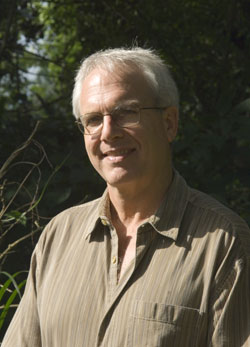 Emerging threats to rainforests Rainforests face array of emerging threats Rhett Butler, mongabay.com June 15, 2008 Tropical forests face a number of emerging threats said a leading biologist speaking at a scientific conference in Paramaribo, Suriname. William F. Laurance, a researcher at the Smithsonian Tropical Research Center (STRI), told the annual meeting of the Association […]
Emerging threats to rainforests Rainforests face array of emerging threats Rhett Butler, mongabay.com June 15, 2008 Tropical forests face a number of emerging threats said a leading biologist speaking at a scientific conference in Paramaribo, Suriname. William F. Laurance, a researcher at the Smithsonian Tropical Research Center (STRI), told the annual meeting of the Association […]
Nestle Chairman: Biofuels are “ethically indefensible”
 Is global drying a higher priority than global warming? Nestle Chairman: Biofuels are “ethically indefensible” mongabay.com June 14, 2008 The emergence and expansion of biofuels produced from food crops has exacerabted world’s agriculture and water crisis and is a bigger short-term threat than global warming, argued Peter Brabeck-Letmathe in an editorial published Thursday in the […]
Is global drying a higher priority than global warming? Nestle Chairman: Biofuels are “ethically indefensible” mongabay.com June 14, 2008 The emergence and expansion of biofuels produced from food crops has exacerabted world’s agriculture and water crisis and is a bigger short-term threat than global warming, argued Peter Brabeck-Letmathe in an editorial published Thursday in the […]
Cellulosic biofuels may be viable alternative to gas within 5 years
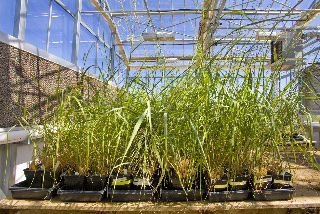 Cellulosic biofuels may be viable alternative to gas within 5 years High fuel prices to make cellulosic biofuels increasingly competitive with gas Madolyn Rogers, special to mongabay.com June 2, 2008 A new institute in the San Francisco Bay Area is seeking to make cellulosic biofuel an economically viable alternative to corn ethanol and gasoline within […]
Cellulosic biofuels may be viable alternative to gas within 5 years High fuel prices to make cellulosic biofuels increasingly competitive with gas Madolyn Rogers, special to mongabay.com June 2, 2008 A new institute in the San Francisco Bay Area is seeking to make cellulosic biofuel an economically viable alternative to corn ethanol and gasoline within […]
Biofuels expansion in Africa may impact rainforests, wetlands
Biofuels expansion in Africa may impact rainforests, wetlands Biofuels expansion in Africa may impact rainforests, wetlands mongabay.com May 28, 2008 Biofuel feedstock expansion in Africa will likely come at the expense of ecologically-sensitive lands, reports a new analysis presented by Wetlands International at the Convention of Biological Diversity in Bonn. The study, titled Biofuel production […]
Global ban on biofuels would lead to immediate decline in food prices
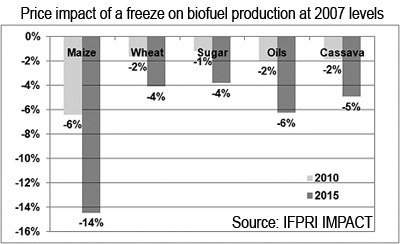 Global ban on biofuels would lead to immediate decline in food prices Global ban on biofuels would lead to immediate decline in food prices mongabay.com May 16, 2008 A global moratorium on biofuels produced from food crops would result in a significant decline in the price of corn, sugar, cassava and wheat by 2010, according […]
Global ban on biofuels would lead to immediate decline in food prices Global ban on biofuels would lead to immediate decline in food prices mongabay.com May 16, 2008 A global moratorium on biofuels produced from food crops would result in a significant decline in the price of corn, sugar, cassava and wheat by 2010, according […]
Indonesian palm oil firms pledge to stop clearing rainforests
 Palm oil firms pledge to stop clearing rainforests in Indonesia Palm oil firms pledge to stop clearing rainforests in Indonesia mongabay.com May 13, 2008 Palm oil companies operating in Indonesia pledged to stop clearing forests for new plantations, reports The Jakarta Post. The move is a response to growing criticism that oil palm expansion is […]
Palm oil firms pledge to stop clearing rainforests in Indonesia Palm oil firms pledge to stop clearing rainforests in Indonesia mongabay.com May 13, 2008 Palm oil companies operating in Indonesia pledged to stop clearing forests for new plantations, reports The Jakarta Post. The move is a response to growing criticism that oil palm expansion is […]
46% of Brazil’s energy comes from renewable sources
46% of Brazil’s energy comes from renewable sources 46% of Brazil’s energy comes from renewable sources mongabay.com May 13, 2008 Preliminary data from Brazil’s energy ministry shows that bioenergy derived from sugar cane surpassed hydroelectric power as Brazil’s secondary largest source of energy in 2007, reports Biopact. The annual National Energy Balance report produced by […]
Sustainability conference reveals a rift in the Malaysian Palm Oil Council
 Sustainability conference reveals a rift in the Malaysian Palm Oil Council Sustainability conference reveals a rift in the Malaysian Palm Oil Council Rhett Butler, mongabay.com May 1, 2008 Last month’s sustainability conference sponsored by the Malaysian Palm Oil Council (MPOC) revealed a rift between some planters and the industry marketing organization. Speaking on the condition […]
Sustainability conference reveals a rift in the Malaysian Palm Oil Council Sustainability conference reveals a rift in the Malaysian Palm Oil Council Rhett Butler, mongabay.com May 1, 2008 Last month’s sustainability conference sponsored by the Malaysian Palm Oil Council (MPOC) revealed a rift between some planters and the industry marketing organization. Speaking on the condition […]
High palm oil prices kill the biodiesel market for Asia
 High palm oil prices kill the biodiesel market for Asia High palm oil prices kill the biodiesel market for Asia mongabay.com May 1, 2008 High palm oil prices have forced investors to shelve plans for biodiesel refineries, according to The Wall Street Journal. With the feedstock accounting for as much as 80 percent of the […]
High palm oil prices kill the biodiesel market for Asia High palm oil prices kill the biodiesel market for Asia mongabay.com May 1, 2008 High palm oil prices have forced investors to shelve plans for biodiesel refineries, according to The Wall Street Journal. With the feedstock accounting for as much as 80 percent of the […]
Unilever calls for ban on rainforest destruction for palm oil
 Unilever calls for ban on rainforest destruction for palm oil Unilever calls for ban on rainforest destruction for palm oil mongabay.com May 1, 2008 Unilever, the world’s largest consumer good company, will start using palm oil from certified sustainable sources this year and aims to have all its palm oil certified by 2015, according to […]
Unilever calls for ban on rainforest destruction for palm oil Unilever calls for ban on rainforest destruction for palm oil mongabay.com May 1, 2008 Unilever, the world’s largest consumer good company, will start using palm oil from certified sustainable sources this year and aims to have all its palm oil certified by 2015, according to […]
Unilever admits it can’t trace origin of palm oil used in its products
 Unilever admits it can’t trace origin of palm oil used in its products Unilever admits it can’t trace origin of palm oil used in its products mongabay.com April 21, 2008 Unilever has admitted to Greenpeace that it can’t trace the origin of palm oil supplied by firms operating in Indonesia. The revelation suggests that efforts […]
Unilever admits it can’t trace origin of palm oil used in its products Unilever admits it can’t trace origin of palm oil used in its products mongabay.com April 21, 2008 Unilever has admitted to Greenpeace that it can’t trace the origin of palm oil supplied by firms operating in Indonesia. The revelation suggests that efforts […]
Malaysian palm oil industry puts sustainability in the spotlight
 Malaysian palm oil industry puts sustainability in the spotlight Malaysian palm oil industry puts sustainability in the spotlight Rhett Butler, mongabay.com April 17, 2008 Seeking to differentiate its palm oil from that produced less responsibly in other countries, the Malaysian Palm Oil Council (MPOC) sponsored a three-day meeting this week in Kota Kinabalu, on the […]
Malaysian palm oil industry puts sustainability in the spotlight Malaysian palm oil industry puts sustainability in the spotlight Rhett Butler, mongabay.com April 17, 2008 Seeking to differentiate its palm oil from that produced less responsibly in other countries, the Malaysian Palm Oil Council (MPOC) sponsored a three-day meeting this week in Kota Kinabalu, on the […]
Mutant algae may fuel cars
Mutant algae may fuel cars Mutant algae may fuel cars mongabay.com April 2, 2008 Chemically-modified algae may become key to the production of hydrogen gas which seen by researchers as a next-generation fuel source. “We believe there is a fundamental advantage in looking at the production of hydrogen by photosynthesis as a renewable fuel,” said […]
Global warming solutions are harming indigenous people, says U.N.
 Global warming solutions are hurting indigenous people, says U.N. Global warming solutions are hurting indigenous people, says U.N. mongabay.com April 2, 2008 Large-scale solutions intended to help mitigate global warming are harming the very indigenous people who are likely to bear the brunt of climate change, warned the United Nations University (UNU) at a conference […]
Global warming solutions are hurting indigenous people, says U.N. Global warming solutions are hurting indigenous people, says U.N. mongabay.com April 2, 2008 Large-scale solutions intended to help mitigate global warming are harming the very indigenous people who are likely to bear the brunt of climate change, warned the United Nations University (UNU) at a conference […]
Cellulosic energy may trigger dramatic collapse in the Amazon
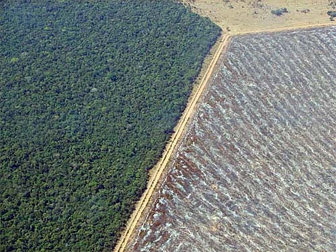 Cellulosic energy may trigger dramatic change in the Amazon Cellulosic energy may trigger dramatic collapse in the Amazon Rhett A. Butler, mongabay.com March 11, 2008 Next generation biofuels may trigger the ecological collapse of the Amazon frontier and could have profoundly unexpected economic consequences for the region, warns a paper published in Philosophical Transactions of […]
Cellulosic energy may trigger dramatic change in the Amazon Cellulosic energy may trigger dramatic collapse in the Amazon Rhett A. Butler, mongabay.com March 11, 2008 Next generation biofuels may trigger the ecological collapse of the Amazon frontier and could have profoundly unexpected economic consequences for the region, warns a paper published in Philosophical Transactions of […]
Biochar fund to fight hunger, energy poverty, deforestation, and global warming
 Biochar fund to fight hunger, energy poverty, deforestation, and global warming The biochar revolution begins Biochar fund to fight hunger, energy poverty, deforestation, and global warming mongabay.com March 10, 2008 Biopact, a leading bioenergy web site, has announced the creation of a “Biochar Fund” to help poor farmers improve their quality of life without hurting […]
Biochar fund to fight hunger, energy poverty, deforestation, and global warming The biochar revolution begins Biochar fund to fight hunger, energy poverty, deforestation, and global warming mongabay.com March 10, 2008 Biopact, a leading bioenergy web site, has announced the creation of a “Biochar Fund” to help poor farmers improve their quality of life without hurting […]
Corn ethanol is worsening the Gulf dead zone
 Corn ethanol is worsening the Gulf dead zone Corn ethanol is worsening the Gulf dead zone mongabay.com March 10, 2008 Proposed legislation that will expand corn-ethanol production in the United States will worsen the growing “dead zone” in the Gulf of Mexico and hurt marine fisheries, report researchers writing in the Proceedings of the National […]
Corn ethanol is worsening the Gulf dead zone Corn ethanol is worsening the Gulf dead zone mongabay.com March 10, 2008 Proposed legislation that will expand corn-ethanol production in the United States will worsen the growing “dead zone” in the Gulf of Mexico and hurt marine fisheries, report researchers writing in the Proceedings of the National […]
World fertilizer prices surge 200% in 2007, hurting the poor
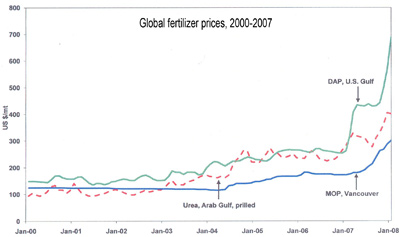 World fertilizer prices surge 200% in 2007, hurting the poor World fertilizer prices surge 200% in 2007 mongabay.com February 20, 2008 The world’s poor lose as fertilizer price rise World fertilizer prices surged by more than 200 percent in 2007, as farmers sought to maximize corn production for ethanol, according to the International Center for […]
World fertilizer prices surge 200% in 2007, hurting the poor World fertilizer prices surge 200% in 2007 mongabay.com February 20, 2008 The world’s poor lose as fertilizer price rise World fertilizer prices surged by more than 200 percent in 2007, as farmers sought to maximize corn production for ethanol, according to the International Center for […]
UN: biofuels are starving the poor by driving up food prices
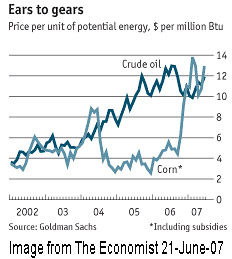 UN: biofuels are starving the poor by driving up food prices UN: biofuels are starving the poor by driving up food prices mongabay.com February 14, 2008 Echoing sentiments increasingly expressed by politicians, scientists, and advocates for the poor, the U.N. Food and Agriculture Organization warned that the world’s poorest people are suffering as a result […]
UN: biofuels are starving the poor by driving up food prices UN: biofuels are starving the poor by driving up food prices mongabay.com February 14, 2008 Echoing sentiments increasingly expressed by politicians, scientists, and advocates for the poor, the U.N. Food and Agriculture Organization warned that the world’s poorest people are suffering as a result […]
Biofuels are worsening global warming
 Biofuels are worsening global warming Biofuels are worsening global warming Rhett Butler, mongabay.com February 7, 2008 Converting native ecosystems for production of biofuel feed stocks is worsening the greenhouse gas emissions they are intended to mitigate, reports a pair of studies published in the journal Science. The studies follow a series of reports that have […]
Biofuels are worsening global warming Biofuels are worsening global warming Rhett Butler, mongabay.com February 7, 2008 Converting native ecosystems for production of biofuel feed stocks is worsening the greenhouse gas emissions they are intended to mitigate, reports a pair of studies published in the journal Science. The studies follow a series of reports that have […]
Sustainability mandated for biofuels used in the EU
Sustainability mandated for biofuels used in the EU Sustainability mandated for biofuels used in the EU mongabay.com January 24, 2008 Biofuels used in the European Union will have meet strict environmental requirements said the head of the E.U.’s energy program on Wednesday. At a news conference in Brussels, European Energy Commissioner Andris Piebalgs said the […]
Palm oil industry prepares green initiative to counter criticism
Global food and consumer goods giants are backing a plan to certify that palm oil is produced in a way that doesn’t drive destruction of tropical rainforests, reports The Wall Street Journal. The move comes as the palm industry is facing increasing scrutiny — and consumer backlash — for its practices which scientists say are […]
U.S. biofuels policy drives deforestation in Indonesia, the Amazon
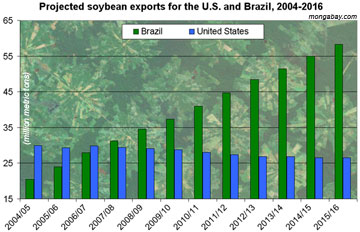 U.S. biofuels policy drives deforestation in Indonesia, the Amazon U.S. biofuels policy drives deforestation in Indonesia, the Amazon Rhett A. Butler, mongabay.com January 17, 2008 U.S. incentives for biofuel production are promoting deforestation in southeast Asia and the Amazon by driving up crop prices and displacing energy feedstock production, say researchers. William Laurance, a senior […]
U.S. biofuels policy drives deforestation in Indonesia, the Amazon U.S. biofuels policy drives deforestation in Indonesia, the Amazon Rhett A. Butler, mongabay.com January 17, 2008 U.S. incentives for biofuel production are promoting deforestation in southeast Asia and the Amazon by driving up crop prices and displacing energy feedstock production, say researchers. William Laurance, a senior […]
Cellulosic ethanol production could fight Gulf Dead Zone, help fisheries
 Cellulosic ethanol production could fight Gulf Dead Zone, help fisheries Cellulosic ethanol production could fight Gulf Dead Zone, help fisheries Rhett A. Butler, mongabay.com January 16, 2008 Feedstocks for cellulosic ethanol production could help fight the massive “dead zone” that forms each year in the Gulf of Mexico as a result of current farming practices, […]
Cellulosic ethanol production could fight Gulf Dead Zone, help fisheries Cellulosic ethanol production could fight Gulf Dead Zone, help fisheries Rhett A. Butler, mongabay.com January 16, 2008 Feedstocks for cellulosic ethanol production could help fight the massive “dead zone” that forms each year in the Gulf of Mexico as a result of current farming practices, […]
DR Congo has great potential for biofuels says U.N. official
 DR Congo has great potential for biofuels says U.N. official DR Congo has great potential for biofuels says U.N. official mongabay.com January 9, 2008 A UN economist is touting the potential of DR Congo for industrial biofuels production, reports Reuters. In a telephone interview, Dr Schmidhuber said the worn-torn country could devote millions of acres […]
DR Congo has great potential for biofuels says U.N. official DR Congo has great potential for biofuels says U.N. official mongabay.com January 9, 2008 A UN economist is touting the potential of DR Congo for industrial biofuels production, reports Reuters. In a telephone interview, Dr Schmidhuber said the worn-torn country could devote millions of acres […]
Switchgrass a better biofuel source than corn
 Switchgrass a better biofuel source than corn Switchgrass a better biofuel source than corn Rhett A. Butler, mongabay.com January 7, 2008 Switchgrass yields more than 540 percent more energy than the energy needed to produce and convert it to ethanol, making the grassy weed a far superior source for biofuels than corn ethanol, reports a […]
Switchgrass a better biofuel source than corn Switchgrass a better biofuel source than corn Rhett A. Butler, mongabay.com January 7, 2008 Switchgrass yields more than 540 percent more energy than the energy needed to produce and convert it to ethanol, making the grassy weed a far superior source for biofuels than corn ethanol, reports a […]
Leading biofuels wreak environmental havoc
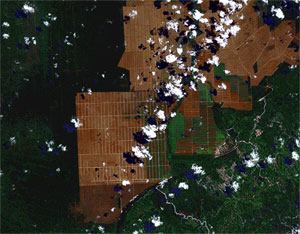 Leading biofuels wreak environmental havoc Leading biofuels wreak environmental havoc mongabay.com January 3, 2008 Leading biofuels may be worse for environment than fossils fuels Biofuels made from world’s dominant energy crops — including corn, soy, and oil palm — may have worse environment impacts than conventional fossil fuels, reports a study published in the journal […]
Leading biofuels wreak environmental havoc Leading biofuels wreak environmental havoc mongabay.com January 3, 2008 Leading biofuels may be worse for environment than fossils fuels Biofuels made from world’s dominant energy crops — including corn, soy, and oil palm — may have worse environment impacts than conventional fossil fuels, reports a study published in the journal […]
New process turns chicken fat into biodiesel
 New process turns chicken fat into biodiesel New process turns chicken fat into biodiesel mongabay.com December 20, 2007 Chemical engineers at the University of Arkansas have devised a way to convert chicken fat into biodiesel fuel. The process advances efforts to “develop commercially viable fuel out of plentiful, accessible and low-cost feedstocks and other agricultural […]
New process turns chicken fat into biodiesel New process turns chicken fat into biodiesel mongabay.com December 20, 2007 Chemical engineers at the University of Arkansas have devised a way to convert chicken fat into biodiesel fuel. The process advances efforts to “develop commercially viable fuel out of plentiful, accessible and low-cost feedstocks and other agricultural […]
Will carbon credits-for-forests scheme be undermined by carbon negative bioenergy?
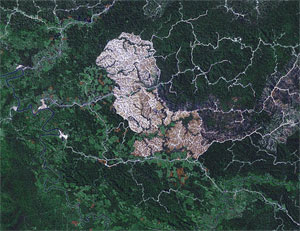 Will carbon credits-for-forests scheme be undermined by carbon negative bioenergy? Will carbon credits-for-forests scheme be undermined by carbon negative bioenergy? mongabay.com December 18, 2007 The Indonesian government has signed an agreement with energy giant Total E&P Indonesia on a carbon capture and storage scheme that could eventually lead to the development of carbon negative bioenergy […]
Will carbon credits-for-forests scheme be undermined by carbon negative bioenergy? Will carbon credits-for-forests scheme be undermined by carbon negative bioenergy? mongabay.com December 18, 2007 The Indonesian government has signed an agreement with energy giant Total E&P Indonesia on a carbon capture and storage scheme that could eventually lead to the development of carbon negative bioenergy […]
U.S. corn subsidies drive Amazon destruction
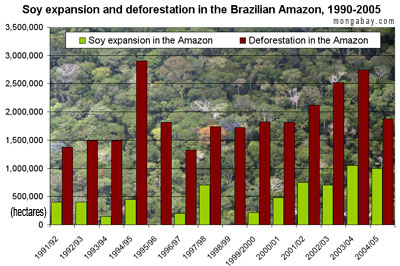 U.S. corn subsidies drive Amazon destruction U.S. corn subsidies drive Amazon destruction Rhett A. Butler, mongabay.com December 13, 2007 U.S. corn subsidies for ethanol production are contributing to deforestation of the Amazon rainforest, reports a tropical forest scientist writing in this week’s issue of the journal Science. Dr. William Laurance, of the Smithsonian Tropical Research […]
U.S. corn subsidies drive Amazon destruction U.S. corn subsidies drive Amazon destruction Rhett A. Butler, mongabay.com December 13, 2007 U.S. corn subsidies for ethanol production are contributing to deforestation of the Amazon rainforest, reports a tropical forest scientist writing in this week’s issue of the journal Science. Dr. William Laurance, of the Smithsonian Tropical Research […]
Kyoto pact ignores CO2 emissions from biofuels
 Kyoto pact ignores CO2 emissions from biofuels Kyoto pact ignores CO2 emissions from biofuels Rhett Butler, mongabay.com December 5, 2007 The Kyoto climate pact, as it currently stands, ignores millions of tons of carbon dioxide emissions from the drainage of peat lands for palm oil production in Indonesia and Malaysia, warned Wetlands International, an international […]
Kyoto pact ignores CO2 emissions from biofuels Kyoto pact ignores CO2 emissions from biofuels Rhett Butler, mongabay.com December 5, 2007 The Kyoto climate pact, as it currently stands, ignores millions of tons of carbon dioxide emissions from the drainage of peat lands for palm oil production in Indonesia and Malaysia, warned Wetlands International, an international […]
Is the oil-palm industry using global warming to mislead the public?
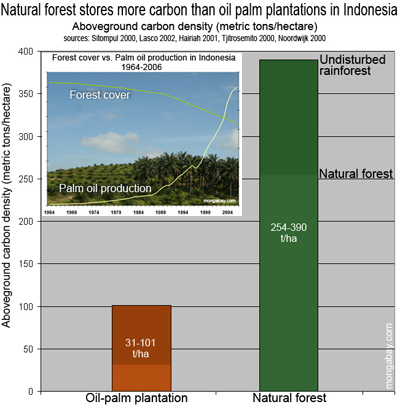 Is the oil-palm industry using global warming to mislead the public? Is the oil-palm industry using global warming to mislead the public? Rhett A Butler, mongabay.com November 23, 2007 This is the pre-edited version of an editorial that appeared November 23, 2007 in THE JAKARTA POST. The final piece was titled Is the palm oil […]
Is the oil-palm industry using global warming to mislead the public? Is the oil-palm industry using global warming to mislead the public? Rhett A Butler, mongabay.com November 23, 2007 This is the pre-edited version of an editorial that appeared November 23, 2007 in THE JAKARTA POST. The final piece was titled Is the palm oil […]
Termites may produce cleaner biofuels
 ? Termites may produce cleaner biofuels Termites may produce cleaner biofuels mongabay.com November 23, 2007 Termites may be the key to greener, more effective biofuels, report scientists writing in the November 22 edition of the journal Nature. Termites harbor stomach microbes that produce enzymes which may be useful in converting wood or waste biomass to […]
? Termites may produce cleaner biofuels Termites may produce cleaner biofuels mongabay.com November 23, 2007 Termites may be the key to greener, more effective biofuels, report scientists writing in the November 22 edition of the journal Nature. Termites harbor stomach microbes that produce enzymes which may be useful in converting wood or waste biomass to […]
Greenwashing the palm oil industry
 Greenwashing the palm oil industry Deceit and global warming: Greenwashing the palm oil industry mongabay.com November 12, 2007 A new report from Greenpeace alleges that members of the Roundtable on Sustainable Palm Oil — an industry-driven initiative to clean up palm oil production — are using palm oil derived by clearing endangered rainforests and draining […]
Greenwashing the palm oil industry Deceit and global warming: Greenwashing the palm oil industry mongabay.com November 12, 2007 A new report from Greenpeace alleges that members of the Roundtable on Sustainable Palm Oil — an industry-driven initiative to clean up palm oil production — are using palm oil derived by clearing endangered rainforests and draining […]
Planned logging of Woodlark Island for biofuels opposed by islanders and scientists
- On Woodlark Island, one-hundred and seventy miles from Papua New Guinea, a struggle is occurring between islanders and biofuel company Vitroplant Ltd.
- The company is planning to clear much of the island’s forest for oil palm plantations to produce biofuels.
- Vitorplant Ltd.’s contract specifies that they would deforest 60,000 hectares of land for plantations; Woodlark Island is 85,000 hectares in total, meaning over 70% of the island would be converted.
- Last week, one hundred islanders (out of a total population of 6,000) traveled to the capital of Milne Bay Province, Alotau, to voice their concern over the plans to turn their forested island into plantations.
Oil palm does not store more carbon than forests
 Oil palm does not store more carbon than forests Indonesian palm oil industry tries disinformation campaign Rhett A. Butler, mongabay.com November 8, 2007 Officials from the Indonesian ministry of agriculture and the palm oil industry are distributing materials that misrepresent the carbon balance oil palm plantations, according to accounts from people who have seen presentations […]
Oil palm does not store more carbon than forests Indonesian palm oil industry tries disinformation campaign Rhett A. Butler, mongabay.com November 8, 2007 Officials from the Indonesian ministry of agriculture and the palm oil industry are distributing materials that misrepresent the carbon balance oil palm plantations, according to accounts from people who have seen presentations […]
Carbon-negative bioenergy to cut global warming could drive deforestation
 Carbon-negative bioenergy to cut global warming could drive deforestation Carbon-negative bioenergy to cut global warming could drive deforestation: An interview on BECS with Biopact’s Laurens Rademakers mongabay.com November 6, 2007 A proposed mechanism for generating carbon-negative bioenergy — an energy source that reduces atmospheric carbon dioxide levels — could drive large-scale deforestation in the tropics […]
Carbon-negative bioenergy to cut global warming could drive deforestation Carbon-negative bioenergy to cut global warming could drive deforestation: An interview on BECS with Biopact’s Laurens Rademakers mongabay.com November 6, 2007 A proposed mechanism for generating carbon-negative bioenergy — an energy source that reduces atmospheric carbon dioxide levels — could drive large-scale deforestation in the tropics […]
Does palm oil alleviate rural poverty in Malaysia?
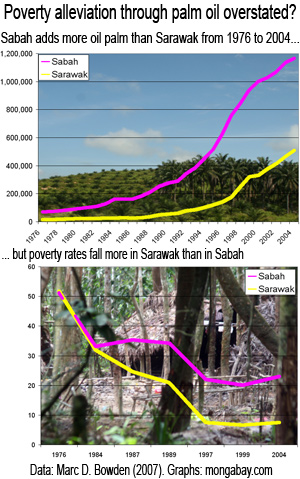 Are the economic benefits of palm oil exaggerated? Does palm oil alleviate rural poverty in Malaysia? Rhett A. Butler, mongabay.com October 24, 2007 While it is often argued that the economic benefits of oil palm plantations outweigh the environmental costs of converting biodiverse ecosystems to monocultures, new analysis suggests that the role of plantations in […]
Are the economic benefits of palm oil exaggerated? Does palm oil alleviate rural poverty in Malaysia? Rhett A. Butler, mongabay.com October 24, 2007 While it is often argued that the economic benefits of oil palm plantations outweigh the environmental costs of converting biodiverse ecosystems to monocultures, new analysis suggests that the role of plantations in […]
Environmentalists and palm oil producers should work together
 Environmentalists and palm oil producers should work together Environmentalists and palm oil producers should work together Rhett A. Butler, mongabay.com September 25, 2007 This editorial was pubished in the Jakarta Post on September 25, 2007 It was titled “How green is palm oil?”. Environmentalists and palm-oil producers are increasingly at odds. Greens groups say palm […]
Environmentalists and palm oil producers should work together Environmentalists and palm oil producers should work together Rhett A. Butler, mongabay.com September 25, 2007 This editorial was pubished in the Jakarta Post on September 25, 2007 It was titled “How green is palm oil?”. Environmentalists and palm-oil producers are increasingly at odds. Greens groups say palm […]
China urged to join sustainable soy efforts in the Amazon
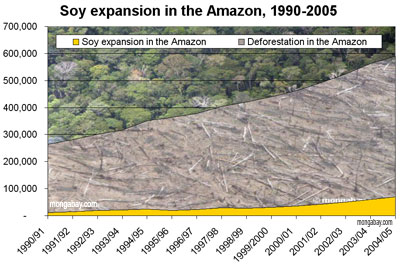 China urged to join sustainable soy efforts in the Amazon China urged to join sustainable soy efforts in the Amazon mongabay.com September 12, 2007 Brazilian soy crushers have urged China to join an alliance to promote sustainable soybean production in the Amazon, according to Reuters. “Sustainability is a huge issue,” Robert Broeska, president of International […]
China urged to join sustainable soy efforts in the Amazon China urged to join sustainable soy efforts in the Amazon mongabay.com September 12, 2007 Brazilian soy crushers have urged China to join an alliance to promote sustainable soybean production in the Amazon, according to Reuters. “Sustainability is a huge issue,” Robert Broeska, president of International […]
Investigation finds evidence of Borneo forest clearing for palm oil
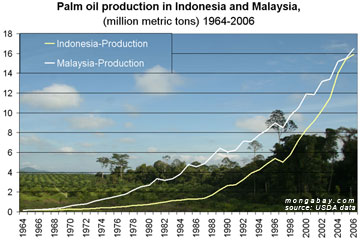 Investigation finds destruction of orangutan habitat for oil palm in Borneo Investigation finds destruction of orangutan habitat for oil palm in Borneo mongabay.com September 2, 2007 Chart showing annual palm oil production by Malaysia and Indonesia from 1964-2006. Click to enlarge. An Associated Press investigation found evidence of workers opening up rainforest land for new […]
Investigation finds destruction of orangutan habitat for oil palm in Borneo Investigation finds destruction of orangutan habitat for oil palm in Borneo mongabay.com September 2, 2007 Chart showing annual palm oil production by Malaysia and Indonesia from 1964-2006. Click to enlarge. An Associated Press investigation found evidence of workers opening up rainforest land for new […]
Guidelines to ensure biofuels production won’t hurt the environment
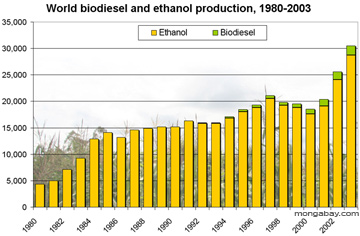 Guidelines to ensure biofuels production won’t hurt the environment Guidelines to ensure biofuels production won’t hurt the environment mongabay.com August 30, 2007 Environmentalists have long seen biofuels as a means to improve the sustainability of transportation and energy use since they are a renewable source of energy that can be replenished on an ongoing basis. […]
Guidelines to ensure biofuels production won’t hurt the environment Guidelines to ensure biofuels production won’t hurt the environment mongabay.com August 30, 2007 Environmentalists have long seen biofuels as a means to improve the sustainability of transportation and energy use since they are a renewable source of energy that can be replenished on an ongoing basis. […]
How private equity can profit from carbon offsets in Indonesia
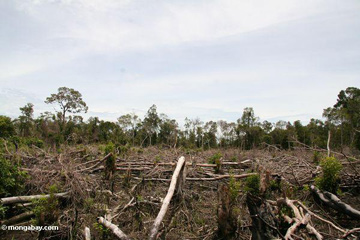 How private equity can profit from carbon offsets in Indonesia How private equity can profit from carbon offsets in Indonesia Rhett Butler, mongabay.com editorial August 29, 2007 The emerging carbon market for avoided deforestation presents unprecedented opportunities for private equity to make profitable investments that also help protect the environment. Indeed, for the first time, […]
How private equity can profit from carbon offsets in Indonesia How private equity can profit from carbon offsets in Indonesia Rhett Butler, mongabay.com editorial August 29, 2007 The emerging carbon market for avoided deforestation presents unprecedented opportunities for private equity to make profitable investments that also help protect the environment. Indeed, for the first time, […]
NGOs should use palm oil to drive conservation
 NGOs should use palm oil to drive conservation NGOs should use palm oil to drive conservation Rhett A. Butler, mongabay.com August 29, 2007 Environmentalists view the expansion of oil palm plantations in southeast Asia as one of the greatest threats to the region’s forests and biodiversity. Campaigners say oil palm is driving the conversion of […]
NGOs should use palm oil to drive conservation NGOs should use palm oil to drive conservation Rhett A. Butler, mongabay.com August 29, 2007 Environmentalists view the expansion of oil palm plantations in southeast Asia as one of the greatest threats to the region’s forests and biodiversity. Campaigners say oil palm is driving the conversion of […]
Indonesia’s peatlands may offer U.S. firms global warming offsets
 Indonesia’s peatlands may offer U.S. firms global warming offsets Indonesia’s peatlands may offer U.S. firms global warming offsets How to Convince a Company to Protect Peatlands and Climate Rhett A. Butler, mongabay.com August 29, 2007 The following is modified version of a letter I’ve used to pitch U.S. companies on the concept of carbon finance […]
Indonesia’s peatlands may offer U.S. firms global warming offsets Indonesia’s peatlands may offer U.S. firms global warming offsets How to Convince a Company to Protect Peatlands and Climate Rhett A. Butler, mongabay.com August 29, 2007 The following is modified version of a letter I’ve used to pitch U.S. companies on the concept of carbon finance […]
With Corn ethanol more costly than oil, is Jatropha a better biofuel?
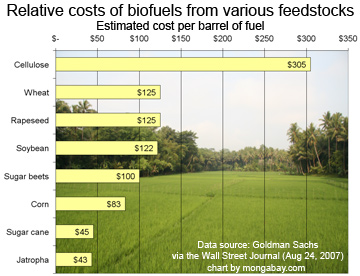 With Corn ethanol more expensive than oil, is Jatropha the solution? With Corn ethanol more costly than oil, is Jatropha a better biofuel? mongabay.com August 24, 2007 Jatropha may be a more economic biofuel than corn-based ethanol, reported the The Wall Street Journal on Friday, citing research from Goldman Sachs. Analysis of the bioenergy market […]
With Corn ethanol more expensive than oil, is Jatropha the solution? With Corn ethanol more costly than oil, is Jatropha a better biofuel? mongabay.com August 24, 2007 Jatropha may be a more economic biofuel than corn-based ethanol, reported the The Wall Street Journal on Friday, citing research from Goldman Sachs. Analysis of the bioenergy market […]
Could peatlands conservation be more profitable than palm oil?
 Could peatlands conservation be more profitable than palm oil? Could peatlands conservation be more profitable than palm oil? Rhett Butler and Sarah Conway mongabay.com August 22, 2007 On August 22, 2007 an edited version of this editorial appeared in the Jakarta Post. What follows is the original version. This past June, World Bank published a […]
Could peatlands conservation be more profitable than palm oil? Could peatlands conservation be more profitable than palm oil? Rhett Butler and Sarah Conway mongabay.com August 22, 2007 On August 22, 2007 an edited version of this editorial appeared in the Jakarta Post. What follows is the original version. This past June, World Bank published a […]
Biofuels driving destruction of Brazilian cerrado
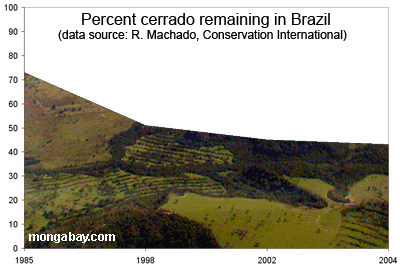 Biofuels driving destruction of Cerrado savanna in Brazil Biofuels driving destruction of Brazilian cerrado Rhett Butler, mongabay.com August 21, 2007 Demand for biofuels is driving the destruction of Brazil’s cerrado, one of the planet’s most biodiverse savanna ecosystems. The cerrado, wooded grassland in Brazil that once covered an area half the size of Europe, is […]
Biofuels driving destruction of Cerrado savanna in Brazil Biofuels driving destruction of Brazilian cerrado Rhett Butler, mongabay.com August 21, 2007 Demand for biofuels is driving the destruction of Brazil’s cerrado, one of the planet’s most biodiverse savanna ecosystems. The cerrado, wooded grassland in Brazil that once covered an area half the size of Europe, is […]
conservation more effective than biofuels for fighting global warming
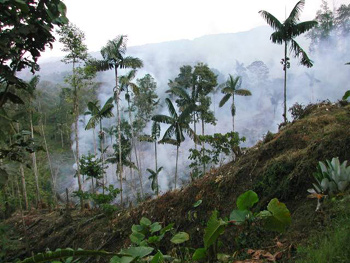 Conservation more effective than biofuels for fighting global warming Conservation more effective than biofuels for fighting global warming mongabay.com August 15, 2007 Conserving forests and grasslands may be a more effective land-use strategy for fighting climate change than growing biofuel crops argues a new paper published in the journal Science. Comparing emissions from various fuel […]
Conservation more effective than biofuels for fighting global warming Conservation more effective than biofuels for fighting global warming mongabay.com August 15, 2007 Conserving forests and grasslands may be a more effective land-use strategy for fighting climate change than growing biofuel crops argues a new paper published in the journal Science. Comparing emissions from various fuel […]
Economics of next generation biofuels
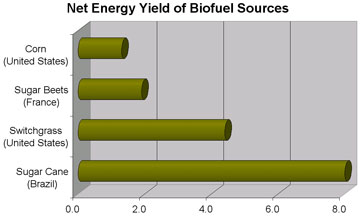 Economics of next generation biofuels Economics of next generation biofuels John Wiley & Sons August 8, 2007 Production costs of advanced biofuels is similar to grain-ethanol Second generation’ biorefineries — those making biofuel from lignocellulosic feedstocks like straw, grasses and wood — have long been touted as the successor to today’s grain ethanol plants, but […]
Economics of next generation biofuels Economics of next generation biofuels John Wiley & Sons August 8, 2007 Production costs of advanced biofuels is similar to grain-ethanol Second generation’ biorefineries — those making biofuel from lignocellulosic feedstocks like straw, grasses and wood — have long been touted as the successor to today’s grain ethanol plants, but […]
Corn ethanol is not the solution to energy independence
 Corn ethanol is not solution to energy independence Corn ethanol is not solution to energy independence mongabay.com July 18, 2007 A new report claims that corn ethanol will not significantly offset U.S. fossil fuel consumption without “unacceptable” environmental and economic consequences. The report, The Rush to Ethanol: Not all BioFuels are Equal, reviews recent scientific […]
Corn ethanol is not solution to energy independence Corn ethanol is not solution to energy independence mongabay.com July 18, 2007 A new report claims that corn ethanol will not significantly offset U.S. fossil fuel consumption without “unacceptable” environmental and economic consequences. The report, The Rush to Ethanol: Not all BioFuels are Equal, reviews recent scientific […]
Is peat swamp worth more than palm oil plantations?
 Is peat swamp worth more than palm oil plantations? Is peat swamp worth more than palm oil plantations? Rhett A. Butler, mongabay.com July 16, 2007 [Jakarta Post version published Aug 22] Jump to the results Could peat swamp be worth more intact for their carbon value than palm oil plantations for their oil? Quick analysis […]
Is peat swamp worth more than palm oil plantations? Is peat swamp worth more than palm oil plantations? Rhett A. Butler, mongabay.com July 16, 2007 [Jakarta Post version published Aug 22] Jump to the results Could peat swamp be worth more intact for their carbon value than palm oil plantations for their oil? Quick analysis […]
US says Brazilian ethanol doesn’t increase food prices, destroy Amazon rainforest
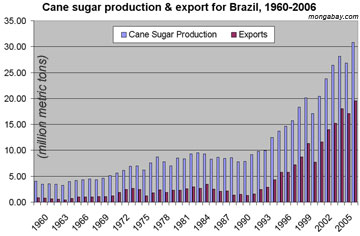 U.S. says Brazilian ethanol doesn’t increase food prices, destroy Amazon rainforest U.S. defends Brazilian ethanol: Energy official claims biofuel does not increase food prices, destroy Amazon rainforest mongabay.com July 13, 2007 Brazil’s surging ethanol production does not put the Amazon rainforest at risk and is not fueling higher food prices, claimed a U.S. energy official […]
U.S. says Brazilian ethanol doesn’t increase food prices, destroy Amazon rainforest U.S. defends Brazilian ethanol: Energy official claims biofuel does not increase food prices, destroy Amazon rainforest mongabay.com July 13, 2007 Brazil’s surging ethanol production does not put the Amazon rainforest at risk and is not fueling higher food prices, claimed a U.S. energy official […]
Miscanthus bests switchgrass as biofuel source
 Miscanthus bests switchgrass as biofuel source Miscanthus bests switchgrass as biofuel source mongabay.com July 11, 2007 In a side-by-side comparison, miscanthus (Miscanthus x giganteus) grass has been shown to be a more productive bioenergy source than switchgrass (Panicum virgatum), according to research presented at the annual meeting of the American Society of Plant Biologists in […]
Miscanthus bests switchgrass as biofuel source Miscanthus bests switchgrass as biofuel source mongabay.com July 11, 2007 In a side-by-side comparison, miscanthus (Miscanthus x giganteus) grass has been shown to be a more productive bioenergy source than switchgrass (Panicum virgatum), according to research presented at the annual meeting of the American Society of Plant Biologists in […]
Cuba Energy Crisis Solved
 Cuban Energy Crisis Solved Cuba Energy Crisis Solved By Joshua S Hill July 5, 2007 Cuba may be overcoming its intermittent energy crisis, according to a top U.N. official. Power shortages and brownouts have long been a problem in the small communist island nation, but it was daily 16 hour-electricity cuts in 2004 that finally […]
Cuban Energy Crisis Solved Cuba Energy Crisis Solved By Joshua S Hill July 5, 2007 Cuba may be overcoming its intermittent energy crisis, according to a top U.N. official. Power shortages and brownouts have long been a problem in the small communist island nation, but it was daily 16 hour-electricity cuts in 2004 that finally […]
$100 billion invested in renewable energy in 2006
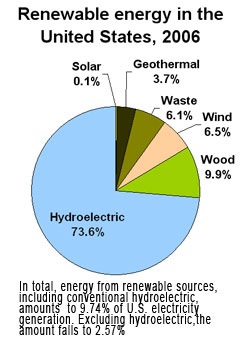 $100 billion invested in renewable energy in 2006 $100 billion invested in renewable energy in 2006 mongabay.com June 20, 2007 $100 billion poured into renewable energy and energy efficiency in 2006, a 25 percent jump from 2005, reports a new analysis by the UN Environment Programme (UNEP). UNEP anticipates the trend will slow to $85 […]
$100 billion invested in renewable energy in 2006 $100 billion invested in renewable energy in 2006 mongabay.com June 20, 2007 $100 billion poured into renewable energy and energy efficiency in 2006, a 25 percent jump from 2005, reports a new analysis by the UN Environment Programme (UNEP). UNEP anticipates the trend will slow to $85 […]
98% of orangutan habitat gone in next 15 years
 UN: 98% of Indonesia’s rainforests gone in next 15 years 98% of orangutan habitat gone in next 15 years Rhett A. Butler, mongabay.com June 11, 2007 Indonesia is losing more than 2.1 million hectares (5.2 million acres) of forest a year to illegal loggers, states a new report from the U.N. Environment Program (UNEP). The […]
UN: 98% of Indonesia’s rainforests gone in next 15 years 98% of orangutan habitat gone in next 15 years Rhett A. Butler, mongabay.com June 11, 2007 Indonesia is losing more than 2.1 million hectares (5.2 million acres) of forest a year to illegal loggers, states a new report from the U.N. Environment Program (UNEP). The […]
Nobel prize winner debates future of nuclear power
 Nobel prize winner debates future of nuclear power Nobel prize winner debates future of nuclear power Rhett A. Butler, mongabay.com June 7, 2007 Two renowned energy experts sparred in a debate over nuclear energy Wednesday afternoon at Stanford University. Amory Lovins, Chairman and Chief Scientist of the Rocky Mountain Institute, an energy think tank, argued […]
Nobel prize winner debates future of nuclear power Nobel prize winner debates future of nuclear power Rhett A. Butler, mongabay.com June 7, 2007 Two renowned energy experts sparred in a debate over nuclear energy Wednesday afternoon at Stanford University. Amory Lovins, Chairman and Chief Scientist of the Rocky Mountain Institute, an energy think tank, argued […]
Indonesia: No more rainforest clearing for palm oil
 Indonesia: No more rainforest clearing for palm oil Indonesia: No more rainforest clearing for palm oil mongabay.com June 5, 2007 Indonesian Minister for Environment Rachmat Witoelar said Indonesia will not allow palm oil producers to clear primary forests for establishing plantations, reports Bloomberg. “Expansion of palm oil plantations will not be allowed to sacrifice natural […]
Indonesia: No more rainforest clearing for palm oil Indonesia: No more rainforest clearing for palm oil mongabay.com June 5, 2007 Indonesian Minister for Environment Rachmat Witoelar said Indonesia will not allow palm oil producers to clear primary forests for establishing plantations, reports Bloomberg. “Expansion of palm oil plantations will not be allowed to sacrifice natural […]
Globalization could save the Amazon rainforest
 Globalization could save the Amazon rainforest An interview with Dr. Daniel Nepstad: Amazon rainforest at a tipping point But globalization could help save it Rhett A. Butler, mongabay.com June 4, 2007 The Amazon basin is home to the world’s largest rainforest, an ecosystem that supports perhaps 30 percent of the world’s terrestrial species, stores vast […]
Globalization could save the Amazon rainforest An interview with Dr. Daniel Nepstad: Amazon rainforest at a tipping point But globalization could help save it Rhett A. Butler, mongabay.com June 4, 2007 The Amazon basin is home to the world’s largest rainforest, an ecosystem that supports perhaps 30 percent of the world’s terrestrial species, stores vast […]
EU will demand sustainable biofuel production
 EU will demand sustainable biofuel production EU will demand sustainable biofuel production mongabay.com May 24, 2007 The European Commission is planning new criteria to ensure that biofuels are produced in an environmentally-friendly manner, reports Reuters. The move comes a month after the Dutch issued voluntary guidelines for biofuel production. “We want to define a minimum […]
EU will demand sustainable biofuel production EU will demand sustainable biofuel production mongabay.com May 24, 2007 The European Commission is planning new criteria to ensure that biofuels are produced in an environmentally-friendly manner, reports Reuters. The move comes a month after the Dutch issued voluntary guidelines for biofuel production. “We want to define a minimum […]
Sugar could power hydrogen fuel cars says VTU researcher
Sugar could power hydrogen fuel cars says VTU researcher Sugar could power hydrogen fuel cars says VTU researcher mongabay.com May 22, 2007 Sugary carbohydrates could be used to produce low-cost hydrogen to power fuel cells report researchers writing in the May 23 issue of PLoS ONE, the online, open-access journal from the Public Library of […]
U.S. ethanol may drive Amazon deforestation
 U.S. ethanol may drive Amazon deforestation U.S. ethanol may drive Amazon deforestation mongabay.com May 17, 2007 Ethanol production in the United States may be contributing to deforestation in the Brazilian rainforest said a leading expert on the Amazon. Dr. Daniel Nepstad of the Woods Hole Research Center said the growing demand for corn ethanol means […]
U.S. ethanol may drive Amazon deforestation U.S. ethanol may drive Amazon deforestation mongabay.com May 17, 2007 Ethanol production in the United States may be contributing to deforestation in the Brazilian rainforest said a leading expert on the Amazon. Dr. Daniel Nepstad of the Woods Hole Research Center said the growing demand for corn ethanol means […]
Ancient Amazonian technology could save the world
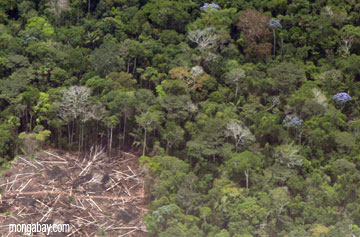 Ancient Amazonian technology could save the world Ancient Amazonian technology could save the world mongabay.com May 17, 2007 Terra preta, the ancient charcoal-based soil used by ancient Amazonians to create permanently fertile agricultural lands in the rainforest, is getting serious consideration as a means to fight global warming and meet domestic energy demand, reports an […]
Ancient Amazonian technology could save the world Ancient Amazonian technology could save the world mongabay.com May 17, 2007 Terra preta, the ancient charcoal-based soil used by ancient Amazonians to create permanently fertile agricultural lands in the rainforest, is getting serious consideration as a means to fight global warming and meet domestic energy demand, reports an […]
Biofuels displace indigenous people
 Biofuels displace indigenous people Biofuels displace indigenous people Justin Bergman Associated Press May 15, 2007 Indigenous people are being pushed off their lands to make way for an expansion of biofuel crops around the world, threatening to destroy their cultures by forcing them into big cities, the head of a U.N. panel said Monday. Victoria […]
Biofuels displace indigenous people Biofuels displace indigenous people Justin Bergman Associated Press May 15, 2007 Indigenous people are being pushed off their lands to make way for an expansion of biofuel crops around the world, threatening to destroy their cultures by forcing them into big cities, the head of a U.N. panel said Monday. Victoria […]
Environmental concerns mount as palm oil production grows
 Environmental concerns mount as palm oil production surges Environmental concerns mount as palm oil production surges Key points on the environmental impact of palm oil Rhett A. Butler, mongabay.com May 15, 2007 The booming market for palm oil is driving record production but fueling rising concerns over the environmental impact of the supposedly “green” bioenergy […]
Environmental concerns mount as palm oil production surges Environmental concerns mount as palm oil production surges Key points on the environmental impact of palm oil Rhett A. Butler, mongabay.com May 15, 2007 The booming market for palm oil is driving record production but fueling rising concerns over the environmental impact of the supposedly “green” bioenergy […]
UN warns on dangers of bioenergy
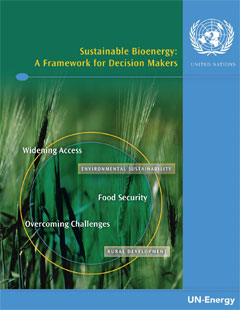 UN warns on dangers of bioenergy UN warns on dangers of bioenergy mongabay.com May 9, 2007 Biofuels offer “an extraordinary opportunity” to reduce greenhouse gas emissions but could make “substantial demands on the world’s land and water resources at a time when demand for both food and forest products is also rising rapidly,” said the […]
UN warns on dangers of bioenergy UN warns on dangers of bioenergy mongabay.com May 9, 2007 Biofuels offer “an extraordinary opportunity” to reduce greenhouse gas emissions but could make “substantial demands on the world’s land and water resources at a time when demand for both food and forest products is also rising rapidly,” said the […]
Dutch plan restricts biofuels that damage environment
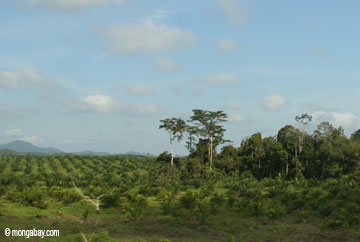 Dutch plan restricts biofuels that damage environment Dutch plan restricts biofuels that damage environment mongabay.com April 29, 2007 The Netherlands has proposed a system to reduce the environmental impact of biofuels production. The country becomes the first in the world to establish such guidelines. Environmentalists have expressed increasing concern for the establishment of energy crops […]
Dutch plan restricts biofuels that damage environment Dutch plan restricts biofuels that damage environment mongabay.com April 29, 2007 The Netherlands has proposed a system to reduce the environmental impact of biofuels production. The country becomes the first in the world to establish such guidelines. Environmentalists have expressed increasing concern for the establishment of energy crops […]
Dutch will demand rainforest-friendly palm oil
 Dutch will demand rainforest-friendly palm oil Dutch will demand rainforest-friendly palm oil mongabay.com April 27, 2007 In a report scheduled to be released today, the Dutch government will outline criteria for growing biofuels in a more sustainable manner. The guidelines will be closely watched by the rest of Europe, which is currently struggling with the […]
Dutch will demand rainforest-friendly palm oil Dutch will demand rainforest-friendly palm oil mongabay.com April 27, 2007 In a report scheduled to be released today, the Dutch government will outline criteria for growing biofuels in a more sustainable manner. The guidelines will be closely watched by the rest of Europe, which is currently struggling with the […]
Biodiesel may worsen global warming relative to petroleum diesel
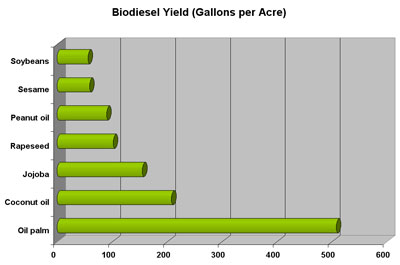 Biodiesel may worsen global warming relative to petroleum diesel Biodiesel may worsen global warming relative to petroleum diesel mongabay.com April 23, 2007 Biodiesel and petroleum diesel have similar environmental impact Biodiesel made from rapeseed could increase rather than reduce greenhouse emissions compared to conventional diesel fuels, reports a new study published in the journal Chemistry […]
Biodiesel may worsen global warming relative to petroleum diesel Biodiesel may worsen global warming relative to petroleum diesel mongabay.com April 23, 2007 Biodiesel and petroleum diesel have similar environmental impact Biodiesel made from rapeseed could increase rather than reduce greenhouse emissions compared to conventional diesel fuels, reports a new study published in the journal Chemistry […]
Ethanol may be greener but have higher health cost
 Ethanol may be greener but have higher health cost Ethanol may be greener but have higher health cost Rhett A. Butler, mongabay.com April 18, 2007 Widespread burning of ethanol as fuel may increase the number of respiratory-related deaths and hospitalizations relative to gasoline, according to a new study by Stanford University atmospheric scientist Mark Z. […]
Ethanol may be greener but have higher health cost Ethanol may be greener but have higher health cost Rhett A. Butler, mongabay.com April 18, 2007 Widespread burning of ethanol as fuel may increase the number of respiratory-related deaths and hospitalizations relative to gasoline, according to a new study by Stanford University atmospheric scientist Mark Z. […]
Palm oil doesn’t have to be bad for the environment
 Palm oil doesn’t have to be bad for the environment Palm oil doesn’t have to be bad for the environment Rhett A. Butler, mongabay.com April 4, 2007 [part 1 | part 2] As traditionally practiced in Southeast Asia, oil-palm cultivation is responsible for widespread deforestation that reduces biodiversity, degrades important ecological services, worsens climate change, […]
Palm oil doesn’t have to be bad for the environment Palm oil doesn’t have to be bad for the environment Rhett A. Butler, mongabay.com April 4, 2007 [part 1 | part 2] As traditionally practiced in Southeast Asia, oil-palm cultivation is responsible for widespread deforestation that reduces biodiversity, degrades important ecological services, worsens climate change, […]
Eco-friendly palm oil could help alleviate poverty in Indonesia
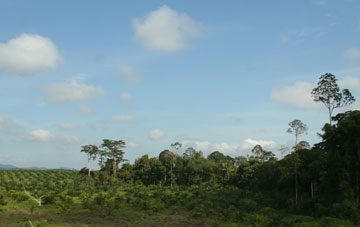 Eco-friendly palm oil could help poverty alleviation in Indonesia Eco-friendly palm oil could help alleviate poverty in Indonesia Palm oil is not a failure as a biofuel Rhett A. Butler mongabay.com editorial [part 1 | part 2] April 4, 2007 The Associated Press (AP) recently quoted Marcel Silvius, a renowned climate expert at Wetlands International […]
Eco-friendly palm oil could help poverty alleviation in Indonesia Eco-friendly palm oil could help alleviate poverty in Indonesia Palm oil is not a failure as a biofuel Rhett A. Butler mongabay.com editorial [part 1 | part 2] April 4, 2007 The Associated Press (AP) recently quoted Marcel Silvius, a renowned climate expert at Wetlands International […]
New green biofuels process could meet all U.S. transportation needs
 New green biofuels process could meet all U.S. transportation needs New green biofuels process could meet all U.S. transportation needs New biofuels process promises to meet all U.S. transportation needs By Emil Venere, Purdue University March 14, 2007 Purdue University chemical engineers have proposed a new environmentally friendly process for producing liquid fuels from plant […]
New green biofuels process could meet all U.S. transportation needs New green biofuels process could meet all U.S. transportation needs New biofuels process promises to meet all U.S. transportation needs By Emil Venere, Purdue University March 14, 2007 Purdue University chemical engineers have proposed a new environmentally friendly process for producing liquid fuels from plant […]
Government pledges $385M for cellulosic ethanol
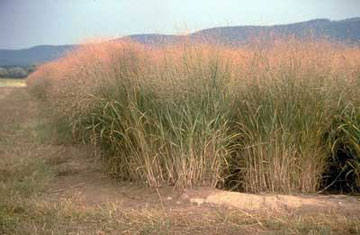 Government pledges $385M for cellulosic ethanol Government pledges $385M for cellulosic ethanol mongabay.com March 8, 2007 The U.S. Department of Energy (DOE) announced it will invest up to $385 million over the next four years for six biorefinery projects capable of producing more than 130 million gallons of cellulosic ethanol annually. “These biorefineries will play […]
Government pledges $385M for cellulosic ethanol Government pledges $385M for cellulosic ethanol mongabay.com March 8, 2007 The U.S. Department of Energy (DOE) announced it will invest up to $385 million over the next four years for six biorefinery projects capable of producing more than 130 million gallons of cellulosic ethanol annually. “These biorefineries will play […]
Weedy grass could free U.S. of foreign oil dependence says biologist
 Weedy grass could free U.S. of foreign oil says biologist Weedy grass could free U.S. of foreign oil dependence says biologist mongabay.com February 16, 2007 A weedy grass may hold the key to domestic energy security and mitigating emissions of greenhouse gasese, said a Stanford University plant biologist speaking Friday at the annual meeting of […]
Weedy grass could free U.S. of foreign oil says biologist Weedy grass could free U.S. of foreign oil dependence says biologist mongabay.com February 16, 2007 A weedy grass may hold the key to domestic energy security and mitigating emissions of greenhouse gasese, said a Stanford University plant biologist speaking Friday at the annual meeting of […]
Ethanol always not as green as some believe
 Ethanol always not as green as some believe Ethanol not always as green as some believe mongabay.com February 16, 2007 Ethanol is generally not as green as some people believe says Bruce Dale, Michigan State University professor of chemical engineering and materials science. Speaking at the American Association for the Advancement of Science annual meeting […]
Ethanol always not as green as some believe Ethanol not always as green as some believe mongabay.com February 16, 2007 Ethanol is generally not as green as some people believe says Bruce Dale, Michigan State University professor of chemical engineering and materials science. Speaking at the American Association for the Advancement of Science annual meeting […]
Biofuels, logging may spur deforestation in Guyana
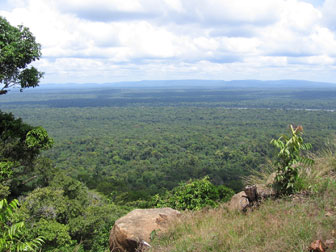 Biofuels, logging may spur deforestation in Guyana Biofuels, logging may spur deforestation in Guyana mongabay.com February 15, 2007 Growing timber exports and rising interest in biofuels are raising concerns that deforestation could accelerate in the South American country of Guyana. Guyana is a small, lightly populated country on the north coast of South America. About […]
Biofuels, logging may spur deforestation in Guyana Biofuels, logging may spur deforestation in Guyana mongabay.com February 15, 2007 Growing timber exports and rising interest in biofuels are raising concerns that deforestation could accelerate in the South American country of Guyana. Guyana is a small, lightly populated country on the north coast of South America. About […]
98% of orangutan habitat in Borneo, Sumatra gone by 2022
 98% of orangutan habitat in Borneo, Sumatra gone by 2022 98% of orangutan habitat in Borneo, Sumatra gone by 2022 mongabay.com February 6, 2007 A report from the United Nations Environment Programme (UNEP) today warns that illegal logging is rapidly destroying the last remaining habitat for orangutans in Borneo and Sumatra. The report says that […]
98% of orangutan habitat in Borneo, Sumatra gone by 2022 98% of orangutan habitat in Borneo, Sumatra gone by 2022 mongabay.com February 6, 2007 A report from the United Nations Environment Programme (UNEP) today warns that illegal logging is rapidly destroying the last remaining habitat for orangutans in Borneo and Sumatra. The report says that […]
Brazil calls out rich countries on global warming
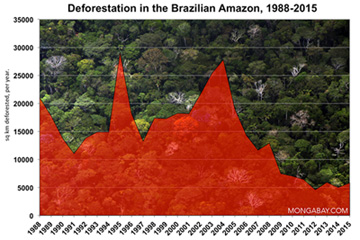 Brazil calls out rich countries on global warming Brazil calls out rich countries on global warming mongabay.com February 6, 2007 Reuters reports that Brazilian President Luiz Inacio Lula da Silva criticized wealthy countries for their contributions to global warming and told them to stay out of Brazil’s business when it comes to the fate of […]
Brazil calls out rich countries on global warming Brazil calls out rich countries on global warming mongabay.com February 6, 2007 Reuters reports that Brazilian President Luiz Inacio Lula da Silva criticized wealthy countries for their contributions to global warming and told them to stay out of Brazil’s business when it comes to the fate of […]
Industrial waste dump becomes biofuel source
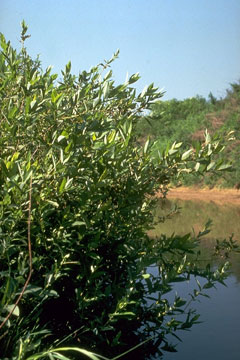 Industrial waste dump becomes biofuel source Industrial waste dump becomes biofuel source mongabay.com February 1, 2007 Shrub willows growing on land that was once considered an industrial waste site will be used to produce green energy according to researchers at the SUNY College of Environmental Science and Forestry (ESF). “We’re using society’s castoffs, residuals such […]
Industrial waste dump becomes biofuel source Industrial waste dump becomes biofuel source mongabay.com February 1, 2007 Shrub willows growing on land that was once considered an industrial waste site will be used to produce green energy according to researchers at the SUNY College of Environmental Science and Forestry (ESF). “We’re using society’s castoffs, residuals such […]
Biofuels could decimate environment, stymie developing countries, says report
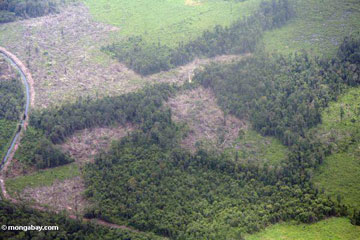 Biofuels could damage environment, stymie developing countries, says report Biofuels could damage environment, stymie development, says report Rhett A. Butler, mongabay.com January 25, 2007 In his State of the Union Address Tuesday night, U.S. President George W. Bush highlighted ethanol fuel production as a means to improve domestic security by reducing dependence on foreign oil […]
Biofuels could damage environment, stymie developing countries, says report Biofuels could damage environment, stymie development, says report Rhett A. Butler, mongabay.com January 25, 2007 In his State of the Union Address Tuesday night, U.S. President George W. Bush highlighted ethanol fuel production as a means to improve domestic security by reducing dependence on foreign oil […]
China invests in $5.5B biofuels project in Borneo, New Guinea
 China invests in $5.5B biofuels project in Borneo, New Guinea China invests in $5.5B biofuels project in Borneo, New Guinea Rhett A. Butler, mongabay.com January 18, 2007 China has agreed to invest in a $5.5 billion biofuels project on the islands of New Guinea and Borneo. The plan promises to be controversial among environmentalists who […]
China invests in $5.5B biofuels project in Borneo, New Guinea China invests in $5.5B biofuels project in Borneo, New Guinea Rhett A. Butler, mongabay.com January 18, 2007 China has agreed to invest in a $5.5 billion biofuels project on the islands of New Guinea and Borneo. The plan promises to be controversial among environmentalists who […]
Are biofuels good or bad for the environment?
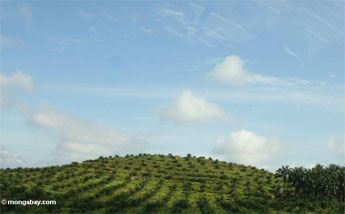 Are biofuels good or bad for the environment? Are biofuels good or bad for the environment? mongabay.com December 14, 2006 Sometimes hailed as a savior from global warming and foreign oil dependence, biofuels are as often criticized for deforestation and pollution. So, are biofuels good or bad for the environment? Grist, an independent online environmental […]
Are biofuels good or bad for the environment? Are biofuels good or bad for the environment? mongabay.com December 14, 2006 Sometimes hailed as a savior from global warming and foreign oil dependence, biofuels are as often criticized for deforestation and pollution. So, are biofuels good or bad for the environment? Grist, an independent online environmental […]
Biomimicry of native prairie yields more bioenergy than corn ethanol
 Biomimicry of native prairie yields more bioenergy than corn ethanol Biomimicry of native prairie yields more bioenergy than corn ethanol mongabay.com December 7, 2006 Diverse mixtures of plants that mimic the native prairie ecosystem are a better source of biofuels than corn grain ethanol or soybean biodiesel according to a new paper published in the […]
Biomimicry of native prairie yields more bioenergy than corn ethanol Biomimicry of native prairie yields more bioenergy than corn ethanol mongabay.com December 7, 2006 Diverse mixtures of plants that mimic the native prairie ecosystem are a better source of biofuels than corn grain ethanol or soybean biodiesel according to a new paper published in the […]
Switchgrass-based ethanol could cost $1 per gallon, reduce foreign oil dependence
 Switchgrass-based ethanol could cost $1 per gallon, reduce foreign oil dependence Switchgrass-based ethanol could cost $1 per gallon, reduce foreign oil dependence mongabay.com December 5, 2006 Genetic engineering of switchgrass, a native prairie plant, could reduce the price of ethanol to $1 per gallon according to a plant geneticist at the University of Rhode Island. […]
Switchgrass-based ethanol could cost $1 per gallon, reduce foreign oil dependence Switchgrass-based ethanol could cost $1 per gallon, reduce foreign oil dependence mongabay.com December 5, 2006 Genetic engineering of switchgrass, a native prairie plant, could reduce the price of ethanol to $1 per gallon according to a plant geneticist at the University of Rhode Island. […]
Add invasive species status to list of biofuel concerns
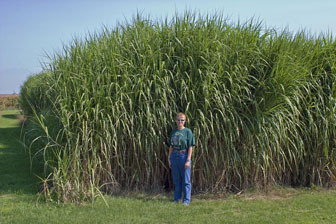 Add invasive species status to list of biofuel concerns Add invasive species status to list of biofuel concerns mongabay.com September 22, 2006 [Updated Sept. 23, 2006] High energy prices over the past couple years have fueled interest in biofuels, which proponents say are less damaging to the environment and provide energy security not afforded by […]
Add invasive species status to list of biofuel concerns Add invasive species status to list of biofuel concerns mongabay.com September 22, 2006 [Updated Sept. 23, 2006] High energy prices over the past couple years have fueled interest in biofuels, which proponents say are less damaging to the environment and provide energy security not afforded by […]
Genetically modified tree could be used for cellulosic ethanol biofuel
 GM tree could be used for cellulosic ethanol GM tree could be used for cellulosic ethanol Fast-Growing Trees Could Take Root as Future Energy Source Purdue University August 24, 2006 A tree that can reach 90 feet in six years and be grown as a row crop on fallow farmland could represent a major replacement […]
GM tree could be used for cellulosic ethanol GM tree could be used for cellulosic ethanol Fast-Growing Trees Could Take Root as Future Energy Source Purdue University August 24, 2006 A tree that can reach 90 feet in six years and be grown as a row crop on fallow farmland could represent a major replacement […]
Biodiesel Moves to the Energy Mainstream
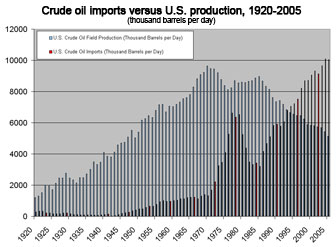 Biodiesel Moves to the Energy Mainstream Biodiesel Moves to the Energy Mainstream Mississippi State University August 14, 2006 Country music legend Willie Nelson and biological engineer San Fernando have a lot in common. The common link between the singer and the Mississippi State University professor is biodiesel, a fuel for diesel engines produced by blending […]
Biodiesel Moves to the Energy Mainstream Biodiesel Moves to the Energy Mainstream Mississippi State University August 14, 2006 Country music legend Willie Nelson and biological engineer San Fernando have a lot in common. The common link between the singer and the Mississippi State University professor is biodiesel, a fuel for diesel engines produced by blending […]
Biofuels can lead to deforestation says Unilever executive
 Amazon drought extends into second year Amazon drought extends into second year mongabay.com August 11, 2006 The drought in the Amazon rainforest looks to be extending into a second year. Last week Brazil’s government declared a state of emergency across more than 250 towns in the region due to lack of rainfall. Scene from the […]
Amazon drought extends into second year Amazon drought extends into second year mongabay.com August 11, 2006 The drought in the Amazon rainforest looks to be extending into a second year. Last week Brazil’s government declared a state of emergency across more than 250 towns in the region due to lack of rainfall. Scene from the […]
Cellulosic ethanol fuels environmental concerns
 Cellulosic ethanol fuels environmental concerns Cellulosic ethanol fuels environmental concerns mongabay.com August 6, 2006 In recent months, high fuel prices and national security concerns have sparked interest in biofuels. Cellulosic ethanol, which can be derived from virtually any plant matter including farm waste, looks particularly promising. The U.S. Department of Energy projects that cellulosic conversion […]
Cellulosic ethanol fuels environmental concerns Cellulosic ethanol fuels environmental concerns mongabay.com August 6, 2006 In recent months, high fuel prices and national security concerns have sparked interest in biofuels. Cellulosic ethanol, which can be derived from virtually any plant matter including farm waste, looks particularly promising. The U.S. Department of Energy projects that cellulosic conversion […]
Corn waste potentially useful for more than ethanol
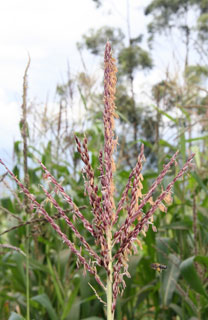 Corn waste potentially useful for more than ethanol Corn waste potentially useful for more than ethanol Penn State July 19, 2006 After the corn harvest, whether for cattle feed or corn on the cob, farmers usually leave the stalks and stems in the field, but now, a team of Penn State researchers think corn stover […]
Corn waste potentially useful for more than ethanol Corn waste potentially useful for more than ethanol Penn State July 19, 2006 After the corn harvest, whether for cattle feed or corn on the cob, farmers usually leave the stalks and stems in the field, but now, a team of Penn State researchers think corn stover […]
Soybean biodiesel has higher net energy benefit than corn ethanol
 Soybean biodiesel has higher net energy benefit than corn ethanol – study Soybean biodiesel has higher net energy benefit than corn ethanol – study But neither can do much to meet U.S. energy demand University of Minnesota July 11, 2006 The first comprehensive analysis of the full life cycles of soybean biodiesel and corn grain […]
Soybean biodiesel has higher net energy benefit than corn ethanol – study Soybean biodiesel has higher net energy benefit than corn ethanol – study But neither can do much to meet U.S. energy demand University of Minnesota July 11, 2006 The first comprehensive analysis of the full life cycles of soybean biodiesel and corn grain […]
New process makes fuel from simple sugar
 New process makes fuel from simple sugar New process makes fuel from simple sugar University of Wisconsin-Madison June 29, 2006 The soaring prices of oil and natural gas have sparked a race to make transportation fuels from plant matter instead of petroleum. Both biodiesel and gasoline containing ethanol are starting to make an impact on […]
New process makes fuel from simple sugar New process makes fuel from simple sugar University of Wisconsin-Madison June 29, 2006 The soaring prices of oil and natural gas have sparked a race to make transportation fuels from plant matter instead of petroleum. Both biodiesel and gasoline containing ethanol are starting to make an impact on […]
Congress deals blow to bioenergy market
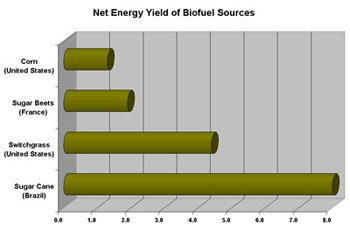 U.S. House deals blow to bioenergy market Congress deals blow to bioenergy market mongabay.com May 16, 2006 In a set back to the growing biofuels market and American energy consumers, House Majority Leader John Boehner said Monday he will not push legislation to reduce the U.S. tariff on ethanol imports. Thus, the United States will […]
U.S. House deals blow to bioenergy market Congress deals blow to bioenergy market mongabay.com May 16, 2006 In a set back to the growing biofuels market and American energy consumers, House Majority Leader John Boehner said Monday he will not push legislation to reduce the U.S. tariff on ethanol imports. Thus, the United States will […]
US has low-cost alternatives to oil; peak oil frenzy and human-induced climate change avoidable says Columbia University
 US has low-cost alternatives to oil; peak oil frenzy and human-induced climate change avoidable says Columbia University report US has low-cost alternatives to oil; peak oil frenzy and human-induced climate change avoidable says Columbia University report mongabay.com May 14, 2006 Surging oil prices have fueled calls for the United States to develop new sources of […]
US has low-cost alternatives to oil; peak oil frenzy and human-induced climate change avoidable says Columbia University report US has low-cost alternatives to oil; peak oil frenzy and human-induced climate change avoidable says Columbia University report mongabay.com May 14, 2006 Surging oil prices have fueled calls for the United States to develop new sources of […]
Carbon savings from biofuels quantified
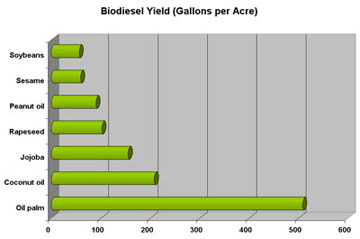 Carbon savings from biofuels quantified Carbon savings from biofuels quantified mongabay.com May 12, 2006 A British fuels company has quantified carbon dioxide emission savings made through the sale of biofuels. Greenergy Fuels Ltd, which supplies biofuels retailed through supermarket forecourts, said it supplied 17.1 million liters of bioethanol and biodiesel, saving more than 40,000 tons […]
Carbon savings from biofuels quantified Carbon savings from biofuels quantified mongabay.com May 12, 2006 A British fuels company has quantified carbon dioxide emission savings made through the sale of biofuels. Greenergy Fuels Ltd, which supplies biofuels retailed through supermarket forecourts, said it supplied 17.1 million liters of bioethanol and biodiesel, saving more than 40,000 tons […]
High oil prices fuel bioenergy push
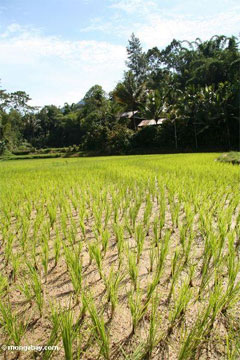 High oil prices fuel bioenergy push High oil prices fuel bioenergy push Rhett A. Butler, mongabay.com May 9, 2006 High oil prices and growing concerns over climate change are driving investment and innovation in the biofuels sector as countries and industry increasingly look towards renewable bioenergy to replace fossil fuels. Bill Gates, the world’s richest […]
High oil prices fuel bioenergy push High oil prices fuel bioenergy push Rhett A. Butler, mongabay.com May 9, 2006 High oil prices and growing concerns over climate change are driving investment and innovation in the biofuels sector as countries and industry increasingly look towards renewable bioenergy to replace fossil fuels. Bill Gates, the world’s richest […]
Scientists closer to understanding key to cellulosic biofuels
 Scientists closer to understanding key to cellulosic biofuels Scientists closer to understanding key to cellulosic biofuels Carnegie Institution April 20, 2006 Cellulose — a fibrous molecule found in all plants — is the most abundant biological material on Earth. It is also a favored target of renewable, plant-based biofuels research. Despite overwhelming interest, scientists know […]
Scientists closer to understanding key to cellulosic biofuels Scientists closer to understanding key to cellulosic biofuels Carnegie Institution April 20, 2006 Cellulose — a fibrous molecule found in all plants — is the most abundant biological material on Earth. It is also a favored target of renewable, plant-based biofuels research. Despite overwhelming interest, scientists know […]
Biofuels can replace about 30 percent of fuel needs
 Biofuels can replace about 30 percent of fuel needs Biofuels can replace about 30 percent of fuel needs Georgia Institute of Technology February 1, 2006 With world oil demand growing, supplies dwindling and the potential for weather- and conflict-related supply interruptions, other types of fuels and technologies are needed to help pick up the slack. […]
Biofuels can replace about 30 percent of fuel needs Biofuels can replace about 30 percent of fuel needs Georgia Institute of Technology February 1, 2006 With world oil demand growing, supplies dwindling and the potential for weather- and conflict-related supply interruptions, other types of fuels and technologies are needed to help pick up the slack. […]
Ethanol more energy-efficient than oil, finds study
 Ethanol more energy-efficient than oil, finds study Ethanol more energy-efficient than oil, finds study Rhett A. Butler, mongabay.com January 26, 2006 Using ethanol — alcohol produced from corn or other plants — instead of gasoline is more energy-efficient than oil say researchers at the University of California, Berkeley In a study published in Friday’s issue […]
Ethanol more energy-efficient than oil, finds study Ethanol more energy-efficient than oil, finds study Rhett A. Butler, mongabay.com January 26, 2006 Using ethanol — alcohol produced from corn or other plants — instead of gasoline is more energy-efficient than oil say researchers at the University of California, Berkeley In a study published in Friday’s issue […]
Eco-friendly palm oil coming soon, criteria could result in cleaner biofuels
Eco-friendly palm oil coming soon, criteria could result in cleaner biofuels Eco-friendly palm oil coming soon, criteria could result in cleaner biofuels WWF news release November 23, 2005 Singapore Consumers can soon enjoy soap, shampoos and many other products containing palm oil with a clean conscience following overwhelmingly acceptance by the Roundtable for Sustainable […]
Biofuels threaten rainforests as important European Commission decision lies ahead
Biofuels threaten rainforests as important European Commission decision lies ahead Biofuels threaten rainforests as important European Commission decision lies ahead Action Alert from Forests.org by Dr. Glenn Barry October 1, 2005 Dr. Glenn Barry, the activist behind Forests.org and ClimateArk, sent out an Action Alert calling for the European Commission to reject a plan to […]
High oil prices make Asia pursue green energy
 High oil prices make Asia pursue green energy High oil prices make Asia pursue green energy By David Fogarty Reuters September 9, 2005 For energy-hungry Asian governments, the answer could literally be blowing in the wind. Across the region, renewable energy such as solar, wind and geothermal power is gaining ever greater credence as a […]
High oil prices make Asia pursue green energy High oil prices make Asia pursue green energy By David Fogarty Reuters September 9, 2005 For energy-hungry Asian governments, the answer could literally be blowing in the wind. Across the region, renewable energy such as solar, wind and geothermal power is gaining ever greater credence as a […]
China funds massive palm oil plantation in rainforest of Borneo
 China funds massive palm oil plantation in rainforest of Borneo China funds massive palm oil plantation in rainforest of Borneo World Wildlife Fund release August 12, 2005 Orangutan. Orangutans are still found in the wilds of Borneo, though their numbers are dwindling.Photo by Jen Caldwell. WASHINGTON, Aug. 12 — Plans to create the world’s largest […]
China funds massive palm oil plantation in rainforest of Borneo China funds massive palm oil plantation in rainforest of Borneo World Wildlife Fund release August 12, 2005 Orangutan. Orangutans are still found in the wilds of Borneo, though their numbers are dwindling.Photo by Jen Caldwell. WASHINGTON, Aug. 12 — Plans to create the world’s largest […]
Renewable energy in China, a strategic future?
 Renewable energy in China, a strategic future? Renewable energy in China, a strategic future? Rhett Butler August 2, 2005 With a host of environmental and domestic social concerns — and potential future international conflict — China could be well suited to pursue renewable energy sources. China’s failed bid for American petroleum firm Unocal may prompt […]
Renewable energy in China, a strategic future? Renewable energy in China, a strategic future? Rhett Butler August 2, 2005 With a host of environmental and domestic social concerns — and potential future international conflict — China could be well suited to pursue renewable energy sources. China’s failed bid for American petroleum firm Unocal may prompt […]
Feeds: news | india | latam | brasil | indonesia
 Biomass burning takes many forms: wildfires, slash-and-burn agriculture, clearing forests and other vegetation, and even industrialized burning for energy production. Yet this burning—mostly manmade but also natural—takes a massive toll both on human health and the environment, according to a new paper in Journal of Geophysical Research: Atmospheres. “We calculate that 5 to 10 percent […]
Biomass burning takes many forms: wildfires, slash-and-burn agriculture, clearing forests and other vegetation, and even industrialized burning for energy production. Yet this burning—mostly manmade but also natural—takes a massive toll both on human health and the environment, according to a new paper in Journal of Geophysical Research: Atmospheres. “We calculate that 5 to 10 percent […] Sugar cane in the tropics. Photo by Rhett A. Butler. If Brazil wants to respect its commitment to reducing greenhouse gas emissions it should target low productivity cattle pasture rather than native cerrado for biofuel crops like sugar cane, argues a new paper published in Nature Climate Change. Brazil already has the world’s largest fleet […]
Sugar cane in the tropics. Photo by Rhett A. Butler. If Brazil wants to respect its commitment to reducing greenhouse gas emissions it should target low productivity cattle pasture rather than native cerrado for biofuel crops like sugar cane, argues a new paper published in Nature Climate Change. Brazil already has the world’s largest fleet […] Logging in temperate zones may release more greenhouse gases than previously thought by destabilizing carbon stored in forest soils, argues a new paper published in the journal Global Change Biology-Bioenergy. The research involved analysis of carbon released from forest management practices in the northeastern United States. It found that while most models assume carbon stored […]
Logging in temperate zones may release more greenhouse gases than previously thought by destabilizing carbon stored in forest soils, argues a new paper published in the journal Global Change Biology-Bioenergy. The research involved analysis of carbon released from forest management practices in the northeastern United States. It found that while most models assume carbon stored […] In coming weeks Brazil will vote on a bill that would lift a ban on sugar cane mills across a large extent of the Amazon region, sparking fears that ethanol production could drive new deforestation and tarnish the country’s image as an attractive source biofuels for environmentally-conscious markets, reports Reuters. New cane plantations in the […]
In coming weeks Brazil will vote on a bill that would lift a ban on sugar cane mills across a large extent of the Amazon region, sparking fears that ethanol production could drive new deforestation and tarnish the country’s image as an attractive source biofuels for environmentally-conscious markets, reports Reuters. New cane plantations in the […] In order to meet the European Union’s goal of 20% renewables by 2020, some European utility companies are moving away from coal and replacing it with wood pellet fuel. The idea is simple: trees will regrow and recapture the carbon released in the burning of wood pellets, making the process supposedly carbon-neutral. But just like […]
In order to meet the European Union’s goal of 20% renewables by 2020, some European utility companies are moving away from coal and replacing it with wood pellet fuel. The idea is simple: trees will regrow and recapture the carbon released in the burning of wood pellets, making the process supposedly carbon-neutral. But just like […] Intensification of Brazil’s sugarcane industry in response to rising demand for sugar-based ethanol could have impacts on the regional climate reports a new study by researchers from Arizona State University, Stanford University and the Carnegie Institution for Science. Following the conversion of cerrado grasslands into sugarcane in Brazil, a recent study in Geophysical Research Letters […]
Intensification of Brazil’s sugarcane industry in response to rising demand for sugar-based ethanol could have impacts on the regional climate reports a new study by researchers from Arizona State University, Stanford University and the Carnegie Institution for Science. Following the conversion of cerrado grasslands into sugarcane in Brazil, a recent study in Geophysical Research Letters […] Neste Oil, a Finnish energy giant, has announced a new “no deforestation” policy [PDF] for sourcing palm oil. The company, which is one of the world’s largest buyers of palm oil, had faced criticism from environmentalists for purchasing palm oil potentially linked to rainforest and peatland destruction in southeast Asia. Under the new policy, Neste […]
Neste Oil, a Finnish energy giant, has announced a new “no deforestation” policy [PDF] for sourcing palm oil. The company, which is one of the world’s largest buyers of palm oil, had faced criticism from environmentalists for purchasing palm oil potentially linked to rainforest and peatland destruction in southeast Asia. Under the new policy, Neste […] Though Obama has frequently spoken of the need for more “green jobs,” he has failed to acknowledge the inherent environmental advantages associated with a curious plant called hemp. One of the earliest domesticated crops, hemp is incredibly versatile and can be utilized for everything from food, clothing, rope, paper and plastic to even car parts. […]
Though Obama has frequently spoken of the need for more “green jobs,” he has failed to acknowledge the inherent environmental advantages associated with a curious plant called hemp. One of the earliest domesticated crops, hemp is incredibly versatile and can be utilized for everything from food, clothing, rope, paper and plastic to even car parts. […] Not long ago biofuels were seen as one of the major tools to combat climate change, but a large number of studies in recent years have shown that many first generation biofuels may have little climate benefit—and some are actually harmful—and are also linked to rising food prices. Now, a new study in Nature Climate […]
Not long ago biofuels were seen as one of the major tools to combat climate change, but a large number of studies in recent years have shown that many first generation biofuels may have little climate benefit—and some are actually harmful—and are also linked to rising food prices. Now, a new study in Nature Climate […] Palm fruit. Photo by Rhett Butler. The European Commission has approved palm oil-based biodiesel for the renewable fuels standard provided it is certified under the Roundtable for Sustainable Palm Oil (RSPO), a body that sets social and environmental criteria for palm oil production. The move, which could dramatically boost sales of palm oil in Europe, […]
Palm fruit. Photo by Rhett Butler. The European Commission has approved palm oil-based biodiesel for the renewable fuels standard provided it is certified under the Roundtable for Sustainable Palm Oil (RSPO), a body that sets social and environmental criteria for palm oil production. The move, which could dramatically boost sales of palm oil in Europe, […] Palm oil facility in Sumatra, Indonesia. The palm oil industry has hired lobbying powerhouse Holland & Knight to help overturn the Environmental Protection Agency’s finding that palm oil-based biodiesel fails to meet greenhouse gas emissions targets under the country’s Renewable Fuels Standard, reports The Hill. “Lobbying disclosure records show that the Malaysian Palm Oil Council, […]
Palm oil facility in Sumatra, Indonesia. The palm oil industry has hired lobbying powerhouse Holland & Knight to help overturn the Environmental Protection Agency’s finding that palm oil-based biodiesel fails to meet greenhouse gas emissions targets under the country’s Renewable Fuels Standard, reports The Hill. “Lobbying disclosure records show that the Malaysian Palm Oil Council, […] Scientists have devised a new way to produce ethanol directly from seaweed, offering the potential to generate biofuels that don’t compete with terrestrial food production and won’t suck up scarce freshwater, reports a study published today in Science. Researchers from the Bio Architecture Lab in Berkeley, California engineered E. coli bacterium to digest brown seaweed […]
Scientists have devised a new way to produce ethanol directly from seaweed, offering the potential to generate biofuels that don’t compete with terrestrial food production and won’t suck up scarce freshwater, reports a study published today in Science. Researchers from the Bio Architecture Lab in Berkeley, California engineered E. coli bacterium to digest brown seaweed […] Europe’s biofuel push could exacerbate climate change unless policies are in place to accounts for emissions from indirect land use change, warns a letter signed by more than 100 scientists and economists. The letter, addressed to the European Commission, says the E.U. is deceiving itself and the public by asserting that biofuels are carbon neutral. […]
Europe’s biofuel push could exacerbate climate change unless policies are in place to accounts for emissions from indirect land use change, warns a letter signed by more than 100 scientists and economists. The letter, addressed to the European Commission, says the E.U. is deceiving itself and the public by asserting that biofuels are carbon neutral. […] This article is a longer version of story that appeared at Yale e360: In Brazil, Palm Oil Plantations Could Help Preserve Amazon. For years now, environmentalists have become accustomed to associating palm oil with large-scale destruction of rainforests across Malaysia and Indonesia. Campaigners have linked palm oil-containing products like Girl Scout cookies and soap products […]
This article is a longer version of story that appeared at Yale e360: In Brazil, Palm Oil Plantations Could Help Preserve Amazon. For years now, environmentalists have become accustomed to associating palm oil with large-scale destruction of rainforests across Malaysia and Indonesia. Campaigners have linked palm oil-containing products like Girl Scout cookies and soap products […] White Marsh Clearcut, outside of the Green Swamp, North Carolina, US. Photo by: Abigail Singer, courtesy of Dogwood Alliance. More people, less forests: that’s the conclusion of a US Forest Service report for forests in the US South. The report predicts that over the next 50 years, the region will lose 23 million acres (9.3 […]
White Marsh Clearcut, outside of the Green Swamp, North Carolina, US. Photo by: Abigail Singer, courtesy of Dogwood Alliance. More people, less forests: that’s the conclusion of a US Forest Service report for forests in the US South. The report predicts that over the next 50 years, the region will lose 23 million acres (9.3 […] Vale, a Brazilian mining giant, will buy palm oil producer Biopalma da Amazonia SA Reflorestamento Industria & Comercio, reports Bloomberg. The deal, valued at $173.5 million, will enable the mining company to run more of its operations on palm oil biodiesel. Vale began its palm oil push in 2009 when it formed a partnership with […]
Vale, a Brazilian mining giant, will buy palm oil producer Biopalma da Amazonia SA Reflorestamento Industria & Comercio, reports Bloomberg. The deal, valued at $173.5 million, will enable the mining company to run more of its operations on palm oil biodiesel. Vale began its palm oil push in 2009 when it formed a partnership with […] Sebuah wawancara dengan Laurens Rademakers dari Biochar Fund. Biochar – penggunaan arang yang diproduksi dari membakar biomassa untuk pertanian – mungkin merupakan saru dari revolusi lingkungan dan sosial yang terpenting di abad ini. Praktek yang sepertinya sederhana ini – sebuah teknologi yang kembali ke ribuan tahun yang lalu – memiliki potensi untuk membantu mengurangi sebagian […]
Sebuah wawancara dengan Laurens Rademakers dari Biochar Fund. Biochar – penggunaan arang yang diproduksi dari membakar biomassa untuk pertanian – mungkin merupakan saru dari revolusi lingkungan dan sosial yang terpenting di abad ini. Praktek yang sepertinya sederhana ini – sebuah teknologi yang kembali ke ribuan tahun yang lalu – memiliki potensi untuk membantu mengurangi sebagian […] The European Union’s renewable fuels target is driving land grabs in Africa that threaten the environment and local communities, claims a new report from Friends of the Earth (FOE). Africa: up for grabs – The scale and impact of land grabbing for agrofuels [PDF] reviews a series of land deals signed across more than a […]
The European Union’s renewable fuels target is driving land grabs in Africa that threaten the environment and local communities, claims a new report from Friends of the Earth (FOE). Africa: up for grabs – The scale and impact of land grabbing for agrofuels [PDF] reviews a series of land deals signed across more than a […] An interview with Laurens Rademakers of Biochar Fund. Biochar—the agricultural application of charcoal produced from burning biomass—may be one of this century’s most important social and environmental revolutions. This seemingly humble practice—a technology that goes back thousands of years—has the potential to help mitigate a number of entrenched global problems: desperate hunger, lack of soil […]
An interview with Laurens Rademakers of Biochar Fund. Biochar—the agricultural application of charcoal produced from burning biomass—may be one of this century’s most important social and environmental revolutions. This seemingly humble practice—a technology that goes back thousands of years—has the potential to help mitigate a number of entrenched global problems: desperate hunger, lack of soil […] Kakadu National Park, one of the Australia’s “largest and best-resourced” protected areas, is experiencing a staggering decline in its small mammal population, according to a new study published in Wildlife Research. Spanning nearly 2 million hectares—larger than Fiji—the park lies in tropical northern Australia. “This decline is catastrophic,” John Woinarski, lead author of the study […]
Kakadu National Park, one of the Australia’s “largest and best-resourced” protected areas, is experiencing a staggering decline in its small mammal population, according to a new study published in Wildlife Research. Spanning nearly 2 million hectares—larger than Fiji—the park lies in tropical northern Australia. “This decline is catastrophic,” John Woinarski, lead author of the study […] UE kini bergerak untuk membuat standar lingkungan untuk biofuel yang digunakan di Eropa, mensyaratkan biofuel untuk memberikan “pengurangan substansial” pada emisi gas rumah kaca dan tidak menghasilkan perubahan fungsi hutan atau lahan basah, menurut pernyataan dari Komisi Eropa. Rencana ini meminta industri, pemerintah, dan LSM untuk menyiapkan “skema sukarela” yang memberikan sertifikasi bahwa biofuel yang […]
UE kini bergerak untuk membuat standar lingkungan untuk biofuel yang digunakan di Eropa, mensyaratkan biofuel untuk memberikan “pengurangan substansial” pada emisi gas rumah kaca dan tidak menghasilkan perubahan fungsi hutan atau lahan basah, menurut pernyataan dari Komisi Eropa. Rencana ini meminta industri, pemerintah, dan LSM untuk menyiapkan “skema sukarela” yang memberikan sertifikasi bahwa biofuel yang […] Dengan seluruh perhatian dunia sedang mengarah pada bencana lingkungan di Teluk Meksiko, banyak yang mulai merenungkan kebenaran dari tidak hanya Amerika, tapi ketergantungan dunia akan bahan bakar fossil. Meski begitu proyek-proyek pengadaan energi berbahan bakar fosil skala besar terus berjalan maju, termasuk di kota Sabah, Malaysia di Borneo yang akan membangun 300 MW pembangkit listrik […]
Dengan seluruh perhatian dunia sedang mengarah pada bencana lingkungan di Teluk Meksiko, banyak yang mulai merenungkan kebenaran dari tidak hanya Amerika, tapi ketergantungan dunia akan bahan bakar fossil. Meski begitu proyek-proyek pengadaan energi berbahan bakar fosil skala besar terus berjalan maju, termasuk di kota Sabah, Malaysia di Borneo yang akan membangun 300 MW pembangkit listrik […] The E.U. today moved to establish environmental standards for biofuels used in Europe, requiring biofuels to deliver “substantial reductions” in greenhouse gas emissions and not result in conversion of forests or wetlands, according to a statement from the European Commission. The plan calls for industry, governments and NGOs to set up “voluntary schemes” which certify […]
The E.U. today moved to establish environmental standards for biofuels used in Europe, requiring biofuels to deliver “substantial reductions” in greenhouse gas emissions and not result in conversion of forests or wetlands, according to a statement from the European Commission. The plan calls for industry, governments and NGOs to set up “voluntary schemes” which certify […] Usaha minyak kelapa “yang berkesinambungan” dapat menekan Malaysia dan Indonesia dalam prestasi di area lingkungan hidup dari minyak sayur yang banyak digunakan. Presiden Brazil Lula da Silva, hari Kamis menjelaskan rencana untuk memperluas produksi minyak kelapa di Amazon sambil meminimalkan resiko di hutan hutan terbesar di dunia, lapor Globo dan Terra Brasil. Rencana ini, disebut […]
Usaha minyak kelapa “yang berkesinambungan” dapat menekan Malaysia dan Indonesia dalam prestasi di area lingkungan hidup dari minyak sayur yang banyak digunakan. Presiden Brazil Lula da Silva, hari Kamis menjelaskan rencana untuk memperluas produksi minyak kelapa di Amazon sambil meminimalkan resiko di hutan hutan terbesar di dunia, lapor Globo dan Terra Brasil. Rencana ini, disebut […] With the world’s eyes on the environmental catastrophe in the Gulf of Mexico, many are beginning to ponder the rightness of not just America’s, but the world’s dependence on fossil fuels. Yet large-scale fossil-fuel energy projects continue to march ahead, including one in the Malaysian state of Sabah on Borneo to build a 300 MW […]
With the world’s eyes on the environmental catastrophe in the Gulf of Mexico, many are beginning to ponder the rightness of not just America’s, but the world’s dependence on fossil fuels. Yet large-scale fossil-fuel energy projects continue to march ahead, including one in the Malaysian state of Sabah on Borneo to build a 300 MW […] “Sustainable” palm oil effort may pressure Malaysia and Indonesia on environmental performance of widely used vegetable oil. Brazilian President Lula da Silva on Thursday laid out plans to expand palm oil production in the Amazon while minimizing risk to Earth’s largest rainforest, reports Globo and Terra Brasil. The plan, called the Program for Sustainable Production […]
“Sustainable” palm oil effort may pressure Malaysia and Indonesia on environmental performance of widely used vegetable oil. Brazilian President Lula da Silva on Thursday laid out plans to expand palm oil production in the Amazon while minimizing risk to Earth’s largest rainforest, reports Globo and Terra Brasil. The plan, called the Program for Sustainable Production […] Pengembang minyak kelapa di bagian Indonesia dari Papua Nugini menandatangani perjanjian yang meragukan yang mengeksploitasi masyarakat lokal dan menempatkan ekosistem hutan yang cukup penting beresiko, menurut sebuah laporan baru dari Environmental Investigation Agency (EIA) dan Telapak. Laporan tersebut, “Up for Grabs”, memperingatkan bahwa lima juta hektar dari lahan Papua dan Papua Barat sedang menjadi target […]
Pengembang minyak kelapa di bagian Indonesia dari Papua Nugini menandatangani perjanjian yang meragukan yang mengeksploitasi masyarakat lokal dan menempatkan ekosistem hutan yang cukup penting beresiko, menurut sebuah laporan baru dari Environmental Investigation Agency (EIA) dan Telapak. Laporan tersebut, “Up for Grabs”, memperingatkan bahwa lima juta hektar dari lahan Papua dan Papua Barat sedang menjadi target […] Business-as-usual agricultural expansion to meet biofuel production targets for 2020 will take a heavy toll on Brazil’s Amazon rainforest in coming years, undermining the potential emissions savings of transitioning from fossil fuels to biofuels, warns a new paper published in the Proceedings of the National Academy of Sciences (PNAS). The research suggests that intensification of […]
Business-as-usual agricultural expansion to meet biofuel production targets for 2020 will take a heavy toll on Brazil’s Amazon rainforest in coming years, undermining the potential emissions savings of transitioning from fossil fuels to biofuels, warns a new paper published in the Proceedings of the National Academy of Sciences (PNAS). The research suggests that intensification of […] The European Union may be planning to classify oil palm plantations as forests, raising fears among environmental groups of expanded conversion of tropical rainforests for biofuel production, reports the EUobserver, which cites a leaked document from the European Commission. The draft document [PDF] shows that policymakers are considering language that would specifically allow use of […]
The European Union may be planning to classify oil palm plantations as forests, raising fears among environmental groups of expanded conversion of tropical rainforests for biofuel production, reports the EUobserver, which cites a leaked document from the European Commission. The draft document [PDF] shows that policymakers are considering language that would specifically allow use of […] Only 4 percent of biofuel imported for use in the UK — and 20 percent of biofuel used overall — meets the environmental sustainability standard set by the Renewable Transport Fuel Obligation (RFTO), reports a new assessment from the Renewable Fuels Agency. The report found Britain exceeded its overall biofuel target of 2.5 percent of […]
Only 4 percent of biofuel imported for use in the UK — and 20 percent of biofuel used overall — meets the environmental sustainability standard set by the Renewable Transport Fuel Obligation (RFTO), reports a new assessment from the Renewable Fuels Agency. The report found Britain exceeded its overall biofuel target of 2.5 percent of […] A company in Uganda is pressuring the environment ministry to allow it to log a protected forest reserve to establish a palm oil plantation, reports The New Vision. BIDCO, a Kenyan company, has been lobbying since 2006 to log the forest reserve on Bugala island in Lake Victoria, but has face stiff resistance due to […]
A company in Uganda is pressuring the environment ministry to allow it to log a protected forest reserve to establish a palm oil plantation, reports The New Vision. BIDCO, a Kenyan company, has been lobbying since 2006 to log the forest reserve on Bugala island in Lake Victoria, but has face stiff resistance due to […] A version of this article appeared today in the Jakarta Post Palm oil is one of the world’s most traded and versatile agricultural commodities. It can be used as edible vegetable oil, industrial lubricant, raw material in cosmetic and skincare products and feedstock for biofuel production. Growing global demand for palm oil and the ensuing […]
A version of this article appeared today in the Jakarta Post Palm oil is one of the world’s most traded and versatile agricultural commodities. It can be used as edible vegetable oil, industrial lubricant, raw material in cosmetic and skincare products and feedstock for biofuel production. Growing global demand for palm oil and the ensuing […] Efforts to slow climate change are putting indigenous people at risk, warns a new report published by Survival International, an indigenous rights’ group. The report, ‘The most inconvenient truth of all: climate change and indigenous people,’ argues that lack of recognition of indigenous land use leaves them vulnerable to displacement and environmental harm by projects […]
Efforts to slow climate change are putting indigenous people at risk, warns a new report published by Survival International, an indigenous rights’ group. The report, ‘The most inconvenient truth of all: climate change and indigenous people,’ argues that lack of recognition of indigenous land use leaves them vulnerable to displacement and environmental harm by projects […] Oil palm developers in the Indonesian half of New Guinea are signing questionable deals that exploit local communities and put important forest ecosystems at risk, alleges a new report from Environmental Investigation Agency (EIA) and Telapak. The report, “Up for Grabs”, warns that five million hectares of land in Papua and West Papua are being […]
Oil palm developers in the Indonesian half of New Guinea are signing questionable deals that exploit local communities and put important forest ecosystems at risk, alleges a new report from Environmental Investigation Agency (EIA) and Telapak. The report, “Up for Grabs”, warns that five million hectares of land in Papua and West Papua are being […] Carbon accounting used in the Kyoto Protocol and other climate legislation currently neglects CO2 emissions from the production of biofuels, a loophole that could drive large-scale destruction of tropical forests and exacerbate global warming, warned researchers writing last week in the journal Science. Jerry Melillo and a dozen co-authors noted that the Kyoto Protocol, the […]
Carbon accounting used in the Kyoto Protocol and other climate legislation currently neglects CO2 emissions from the production of biofuels, a loophole that could drive large-scale destruction of tropical forests and exacerbate global warming, warned researchers writing last week in the journal Science. Jerry Melillo and a dozen co-authors noted that the Kyoto Protocol, the […] Indonesian authorities are failing to prevent illegal logging and conversion of protected areas for oil palm cultivation used to supply the European market with supposedly “green” biofuels, alleges a new report from Milieudefensie (Friends of the Earth Netherlands) and WALHI KalBar (Friends of the Earth Indonesia, West Kalimantan). The report, “Failing governance – Avoiding responsibilities” […]
Indonesian authorities are failing to prevent illegal logging and conversion of protected areas for oil palm cultivation used to supply the European market with supposedly “green” biofuels, alleges a new report from Milieudefensie (Friends of the Earth Netherlands) and WALHI KalBar (Friends of the Earth Indonesia, West Kalimantan). The report, “Failing governance – Avoiding responsibilities” […] During the fiscal years of 2002-2008 the United States handed out subsidies to fossil fuel industries to a tune of 72 billion dollars, while renewable energy subsidies, during the same period, reached 29 billion dollars. Conducted by the Environmental Law Institute (ELI) in partnership with the Woodrow Wilson International Center for Scholars, the research shows […]
During the fiscal years of 2002-2008 the United States handed out subsidies to fossil fuel industries to a tune of 72 billion dollars, while renewable energy subsidies, during the same period, reached 29 billion dollars. Conducted by the Environmental Law Institute (ELI) in partnership with the Woodrow Wilson International Center for Scholars, the research shows […] Brazil will restrict sugarcane plantations for ethanol production from the Amazon, the Pantanal, and other ecologically-sensitive areas under a plan announced Thursday by President Luiz Inacio Lula da Silva’s administration, reports the Associated Press. Environment Minister Carlos Minc said the proposal, which will be voted on by Congress next year, would limit sugar growing to […]
Brazil will restrict sugarcane plantations for ethanol production from the Amazon, the Pantanal, and other ecologically-sensitive areas under a plan announced Thursday by President Luiz Inacio Lula da Silva’s administration, reports the Associated Press. Environment Minister Carlos Minc said the proposal, which will be voted on by Congress next year, would limit sugar growing to […] In a Perspectives piece in Science, John R. Regalbuto argues that the world will soon see a revolution in biofuels, but not those made from corn. Instead Regalbuto, program director of Catalysis and Biocatalysis at the National Science Foundation, says that the future of biofuels is in substances that can be converted into liquid hydrocarbons, […]
In a Perspectives piece in Science, John R. Regalbuto argues that the world will soon see a revolution in biofuels, but not those made from corn. Instead Regalbuto, program director of Catalysis and Biocatalysis at the National Science Foundation, says that the future of biofuels is in substances that can be converted into liquid hydrocarbons, […] A new study finds oil palm plantations store less carbon than previously believed, suggesting that palm oil produced through the conversion of tropical forests carries a substantial carbon debt. The study, conducted at two sites in Sumatra and Kalimantan by scientists at the World Agroforestry Centre (ICRAF), found that mature oil palm plantations store less […]
A new study finds oil palm plantations store less carbon than previously believed, suggesting that palm oil produced through the conversion of tropical forests carries a substantial carbon debt. The study, conducted at two sites in Sumatra and Kalimantan by scientists at the World Agroforestry Centre (ICRAF), found that mature oil palm plantations store less […] Sustainable biofuels can be a reality but only in combination with reductions in fuel demand and increased productivity on existing agricultural lands, argue researchers writing in the journal Science. Five years ago biofuels were seen as a panacea for the world’s energy hunger and the need to address climate change, but increased production of biofuels […]
Sustainable biofuels can be a reality but only in combination with reductions in fuel demand and increased productivity on existing agricultural lands, argue researchers writing in the journal Science. Five years ago biofuels were seen as a panacea for the world’s energy hunger and the need to address climate change, but increased production of biofuels […] Vale, the world’s largest miner of iron ore, has signed a $500 million joint venture with Biopalma da Amazonia to produce 160,000 metric tons of palm oil-based biodiesel per year, reports Reuters. Vale says the deal will save $150 million in fuel costs starting in 2014, with palm oil biodiesel replacing up to 20 percent […]
Vale, the world’s largest miner of iron ore, has signed a $500 million joint venture with Biopalma da Amazonia to produce 160,000 metric tons of palm oil-based biodiesel per year, reports Reuters. Vale says the deal will save $150 million in fuel costs starting in 2014, with palm oil biodiesel replacing up to 20 percent […] Congo biochar initiative wins critical funding to support poverty alleviation, climate change mitigation An initiative using soil carbon enrichment techniques to boost agricultural yields, alleviate poverty, and protect endangered forests in Central Africa was today selected as one of six projects to win funding under the Congo Basin Forest Fund (CBFF). The scientific committee of […]
Congo biochar initiative wins critical funding to support poverty alleviation, climate change mitigation An initiative using soil carbon enrichment techniques to boost agricultural yields, alleviate poverty, and protect endangered forests in Central Africa was today selected as one of six projects to win funding under the Congo Basin Forest Fund (CBFF). The scientific committee of […] Yesterday the Obama Administration established a Biofuels Interagency Working Group to oversee implementation of new rules and research regarding biofuels. On the group’s first day they would do well to look at a new study in Science Magazine comparing the efficacy of ethanol versus bioelectricity. Researchers compared ethanol and bioelectricity in terms of miles per […]
Yesterday the Obama Administration established a Biofuels Interagency Working Group to oversee implementation of new rules and research regarding biofuels. On the group’s first day they would do well to look at a new study in Science Magazine comparing the efficacy of ethanol versus bioelectricity. Researchers compared ethanol and bioelectricity in terms of miles per […] The growing concerns about climate change have brought biochar, a charcoal produced from biomass combustion, into limelight.
The growing concerns about climate change have brought biochar, a charcoal produced from biomass combustion, into limelight. Finland, Sweden push for loophole that would drive destruction of peatlands around the world Finland, Sweden push for loophole that would drive destruction of peatlands around the world mongabay.com December 9, 2008
Finland, Sweden push for loophole that would drive destruction of peatlands around the world Finland, Sweden push for loophole that would drive destruction of peatlands around the world mongabay.com December 9, 2008 Cheetah conservationist wins award for renewable energy product that helps wildlife Cheetah conservationist awarded for renewable energy product that helps wildlife mongabay.com November 14, 2008
Cheetah conservationist wins award for renewable energy product that helps wildlife Cheetah conservationist awarded for renewable energy product that helps wildlife mongabay.com November 14, 2008 Scientists should not compare biodiversity of rainforests with oil palm plantations says palm oil council chief Biodiversity of rainforests should not be compared with oil palm plantations says palm oil council chief mongabay.com November 11, 2008 Dr. Yusof Basiron, the controversial CEO of the Malaysian Palm Oil Council (MPOC), blogs about the sustainability of palm […]
Scientists should not compare biodiversity of rainforests with oil palm plantations says palm oil council chief Biodiversity of rainforests should not be compared with oil palm plantations says palm oil council chief mongabay.com November 11, 2008 Dr. Yusof Basiron, the controversial CEO of the Malaysian Palm Oil Council (MPOC), blogs about the sustainability of palm […] First RSPO-certified (“eco-friendly”) palm oil shipment to arrive in Europe First RSPO-certified (“eco-friendly”) palm oil shipment to arrive in Europe mongabay.com November 10, 2008
First RSPO-certified (“eco-friendly”) palm oil shipment to arrive in Europe First RSPO-certified (“eco-friendly”) palm oil shipment to arrive in Europe mongabay.com November 10, 2008 EU’s sustainable biofuels push angers Malaysia, Brazil EU’s sustainable biofuels push angers Malaysia, Brazil mongabay.com November 7, 2008
EU’s sustainable biofuels push angers Malaysia, Brazil EU’s sustainable biofuels push angers Malaysia, Brazil mongabay.com November 7, 2008 Air travel may be powered by biofuels in 3-5 years Air travel may be powered by biofuels in 3-5 years mongabay.com October 27, 2008 Boeing says biofuel-powered planes are only three-to-five years away from being a reality, reports The Guardian. “The certification will happen much sooner than anybody thought,” Darrin Morgan, Boeing’s director of environmental […]
Air travel may be powered by biofuels in 3-5 years Air travel may be powered by biofuels in 3-5 years mongabay.com October 27, 2008 Boeing says biofuel-powered planes are only three-to-five years away from being a reality, reports The Guardian. “The certification will happen much sooner than anybody thought,” Darrin Morgan, Boeing’s director of environmental […] Cellulosic biofuels endanger old-growth forests in the southern U.S. An interview with Scot Quandra of the Dogwood Alliance:Cellulosic biofuels endanger old-growth forests in the southern U.S. Jeremy Hance, mongabay.com October 16, 2008
Cellulosic biofuels endanger old-growth forests in the southern U.S. An interview with Scot Quandra of the Dogwood Alliance:Cellulosic biofuels endanger old-growth forests in the southern U.S. Jeremy Hance, mongabay.com October 16, 2008 U.S. needs environmental standards for biofuels U.S. needs environmental standards for biofuels mongabay.com October 2, 2008
U.S. needs environmental standards for biofuels U.S. needs environmental standards for biofuels mongabay.com October 2, 2008 11 species of monkeys discovered in West African biodiversity hotspot 11 species of monkeys discovered in West African biodiversity hotspot mongabay.com September 15, 2008 Urgent conservation measures are needed to protect some of the world's most endangered primates from the hunting, logging, and oil palm development in a region that has only recently emerged from […]
11 species of monkeys discovered in West African biodiversity hotspot 11 species of monkeys discovered in West African biodiversity hotspot mongabay.com September 15, 2008 Urgent conservation measures are needed to protect some of the world's most endangered primates from the hunting, logging, and oil palm development in a region that has only recently emerged from […] New rainforest sanctuary in Cameroon already at risk from plantations, hunting New rainforest sanctuary in Cameroon already at risk from plantations, hunting mongabay.com September 15, 2008 The forests of southern Cameroon bordering Gabon are biodiversity-rich and harbor important populations of gorillas, chimpanzees, and elephants. In 1998 the government of Cameroon established the Mengamé Gorilla Sanctuary […]
New rainforest sanctuary in Cameroon already at risk from plantations, hunting New rainforest sanctuary in Cameroon already at risk from plantations, hunting mongabay.com September 15, 2008 The forests of southern Cameroon bordering Gabon are biodiversity-rich and harbor important populations of gorillas, chimpanzees, and elephants. In 1998 the government of Cameroon established the Mengamé Gorilla Sanctuary […] Europe cuts biofuel targets to 4% in 2015, 6% in 2020 Europe cuts biofuel targets to 4% in 2015, 6% in 2020 mongabay.com September 12, 2008 The European Union significantly reduces targets for biofuels produced from food sources, while boosting goals for other renewables The E.U. voted to relax biofuels targets following widespread criticism of […]
Europe cuts biofuel targets to 4% in 2015, 6% in 2020 Europe cuts biofuel targets to 4% in 2015, 6% in 2020 mongabay.com September 12, 2008 The European Union significantly reduces targets for biofuels produced from food sources, while boosting goals for other renewables The E.U. voted to relax biofuels targets following widespread criticism of […] Falling palm oil price makes palm biodiesel viable, may offer target for NGOs Falling palm oil price makes palm biodiesel viable, may offer target for NGOs Commentary Rhett A. Butler, mongabay.com September 10, 2008 Plunging palm oil prices are increasing its attractiveness as a biofuel feedstock and thereby helping buoy demand for the oilseed, reports […]
Falling palm oil price makes palm biodiesel viable, may offer target for NGOs Falling palm oil price makes palm biodiesel viable, may offer target for NGOs Commentary Rhett A. Butler, mongabay.com September 10, 2008 Plunging palm oil prices are increasing its attractiveness as a biofuel feedstock and thereby helping buoy demand for the oilseed, reports […] Palm oil producers in Indonesia reject moratorium on forest destruction Palm oil producers in Indonesia reject moratorium on forest destruction mongabay.com August 28, 2008 Palm oil companies operating in Indonesia have rejected a proposed moratorium on clearing forests and peatlands for oil palm plantations, reports the Jakarta Post. The Indonesian Palm Oil Producers Association (GAPKI) […]
Palm oil producers in Indonesia reject moratorium on forest destruction Palm oil producers in Indonesia reject moratorium on forest destruction mongabay.com August 28, 2008 Palm oil companies operating in Indonesia have rejected a proposed moratorium on clearing forests and peatlands for oil palm plantations, reports the Jakarta Post. The Indonesian Palm Oil Producers Association (GAPKI) […] Biofuels up to 200 times more expensive than forest conservation for global warming mitigation Biofuels 200 times more expensive than forest conservation for global warming mitigation mongabay.com August 27, 2008 The British government should end subsidies for biofuels and instead use the funds to slow destruction of rainforests and tropical peatlands argues a new report […]
Biofuels up to 200 times more expensive than forest conservation for global warming mitigation Biofuels 200 times more expensive than forest conservation for global warming mitigation mongabay.com August 27, 2008 The British government should end subsidies for biofuels and instead use the funds to slow destruction of rainforests and tropical peatlands argues a new report […] Brazil to establish oil palm plantations on degraded Amazon rainforest lands Brazil to establish oil palm plantations on degraded Amazon rainforest lands mongabay.com August 20, 2008 Brazil to compete with Malaysia in palm oil production but environmentalists worry redrawing of forest reserve law will hurt biodiversity conservation efforts. Brazil will allow the establishment of oil […]
Brazil to establish oil palm plantations on degraded Amazon rainforest lands Brazil to establish oil palm plantations on degraded Amazon rainforest lands mongabay.com August 20, 2008 Brazil to compete with Malaysia in palm oil production but environmentalists worry redrawing of forest reserve law will hurt biodiversity conservation efforts. Brazil will allow the establishment of oil […] Brazil may ban new sugar cane cultivation in the Pantanal Brazil may ban new sugar cane cultivation in the Pantanal mongabay.com August 6, 2008 Brazil would restrict sugar cane cultivation in the world’s largest tropical wetland under a proposed plan to protect the Pantanal, reports Reuters. The proposal would ban new ethanol plants in the […]
Brazil may ban new sugar cane cultivation in the Pantanal Brazil may ban new sugar cane cultivation in the Pantanal mongabay.com August 6, 2008 Brazil would restrict sugar cane cultivation in the world’s largest tropical wetland under a proposed plan to protect the Pantanal, reports Reuters. The proposal would ban new ethanol plants in the […] Facing criticism, biofuels industry forms new lobby group to influence lawmakers Facing criticism, biofuels industry forms new lobby group to influence lawmakers mongabay.com July 25, 2008 Under attack by politicians, aid groups, and environmentalists for driving up food prices and fueling destruction of ecologically sensitive habitats, some of the world’s largest agroindustrial firms have formed […]
Facing criticism, biofuels industry forms new lobby group to influence lawmakers Facing criticism, biofuels industry forms new lobby group to influence lawmakers mongabay.com July 25, 2008 Under attack by politicians, aid groups, and environmentalists for driving up food prices and fueling destruction of ecologically sensitive habitats, some of the world’s largest agroindustrial firms have formed […] Biofuels can reduce emissions, but not when grown in place of rainforests Biofuels can reduce emissions, but not when grown in place of rainforests mongabay.com July 22, 2008 Biofuels meant to help alleviate greenhouse gas emissions may be in fact contributing to climate change when grown on converted tropical forest lands, warns a comprehensive study […]
Biofuels can reduce emissions, but not when grown in place of rainforests Biofuels can reduce emissions, but not when grown in place of rainforests mongabay.com July 22, 2008 Biofuels meant to help alleviate greenhouse gas emissions may be in fact contributing to climate change when grown on converted tropical forest lands, warns a comprehensive study […] Beyond high food prices, little to show for $11B/yr in biofuel support, says OECD report Beyond high food prices, little to show for $11B/yr in biofuel support, says OECD report mongabay.com July 17, 2008 Government support of biofuel production in rich countries is squandering vast amounts of amounts of money while exacerbating the global food […]
Beyond high food prices, little to show for $11B/yr in biofuel support, says OECD report Beyond high food prices, little to show for $11B/yr in biofuel support, says OECD report mongabay.com July 17, 2008 Government support of biofuel production in rich countries is squandering vast amounts of amounts of money while exacerbating the global food […] Britain urges ‘cautious approach’ on biofuels Britain urges ‘cautious approach’ on biofuels mongabay.com July 7, 2008 Britain and the E.U. should exercise caution in pushing for wider use of biofuels, warns a new study commissioned by the U.K. government. The report — dubbed the “Gallagher review” [PDF] for Ed Gallagher, the chair of the government’s […]
Britain urges ‘cautious approach’ on biofuels Britain urges ‘cautious approach’ on biofuels mongabay.com July 7, 2008 Britain and the E.U. should exercise caution in pushing for wider use of biofuels, warns a new study commissioned by the U.K. government. The report — dubbed the “Gallagher review” [PDF] for Ed Gallagher, the chair of the government’s […] Sarawak to continue logging forests for oil palm plantations Sarawak to continue logging forests for oil palm plantations mongabay.com June 30, 2008 Despite a prime minister’s directive banning conversion of forest reserves for oil palm plantations, the Malaysian state of Sarawak will continue to open up forest land for oil palm plantations, reports the New […]
Sarawak to continue logging forests for oil palm plantations Sarawak to continue logging forests for oil palm plantations mongabay.com June 30, 2008 Despite a prime minister’s directive banning conversion of forest reserves for oil palm plantations, the Malaysian state of Sarawak will continue to open up forest land for oil palm plantations, reports the New […] Malaysia says no more clearing of forest reserves for oil palm plantations Malaysia says no more clearing of forest reserves for oil palm plantations mongabay.com June 26, 2008 Update: Sarawak to continue logging forests for oil palm plantations The Malaysian government said it will prohibit forest clearing for the establishment of oil palm plantations. Only […]
Malaysia says no more clearing of forest reserves for oil palm plantations Malaysia says no more clearing of forest reserves for oil palm plantations mongabay.com June 26, 2008 Update: Sarawak to continue logging forests for oil palm plantations The Malaysian government said it will prohibit forest clearing for the establishment of oil palm plantations. Only […] Sarawak to continue logging forests for oil palm plantations Sarawak to continue logging forests for oil palm plantations mongabay.com June 30, 2008 Despite a prime minister’s directive banning conversion of forest reserves for oil palm plantations, the Malaysian state of Sarawak will continue to open up forest land for oil palm plantations, reports the New […]
Sarawak to continue logging forests for oil palm plantations Sarawak to continue logging forests for oil palm plantations mongabay.com June 30, 2008 Despite a prime minister’s directive banning conversion of forest reserves for oil palm plantations, the Malaysian state of Sarawak will continue to open up forest land for oil palm plantations, reports the New […] Biofuel production on abandoned lands could meet 20% of global oil demand Biofuel production on abandoned lands could meet 20% of global oil demand mongabay.com June 23, 2008 Using abandoned agricultural lands for biofuel production will meet only a small fraction of global energy needs without compromising food supplies or diminishing biologically-rich habitats, reports a […]
Biofuel production on abandoned lands could meet 20% of global oil demand Biofuel production on abandoned lands could meet 20% of global oil demand mongabay.com June 23, 2008 Using abandoned agricultural lands for biofuel production will meet only a small fraction of global energy needs without compromising food supplies or diminishing biologically-rich habitats, reports a […] Emerging threats to rainforests Rainforests face array of emerging threats Rhett Butler, mongabay.com June 15, 2008 Tropical forests face a number of emerging threats said a leading biologist speaking at a scientific conference in Paramaribo, Suriname. William F. Laurance, a researcher at the Smithsonian Tropical Research Center (STRI), told the annual meeting of the Association […]
Emerging threats to rainforests Rainforests face array of emerging threats Rhett Butler, mongabay.com June 15, 2008 Tropical forests face a number of emerging threats said a leading biologist speaking at a scientific conference in Paramaribo, Suriname. William F. Laurance, a researcher at the Smithsonian Tropical Research Center (STRI), told the annual meeting of the Association […] Is global drying a higher priority than global warming? Nestle Chairman: Biofuels are “ethically indefensible” mongabay.com June 14, 2008 The emergence and expansion of biofuels produced from food crops has exacerabted world’s agriculture and water crisis and is a bigger short-term threat than global warming, argued Peter Brabeck-Letmathe in an editorial published Thursday in the […]
Is global drying a higher priority than global warming? Nestle Chairman: Biofuels are “ethically indefensible” mongabay.com June 14, 2008 The emergence and expansion of biofuels produced from food crops has exacerabted world’s agriculture and water crisis and is a bigger short-term threat than global warming, argued Peter Brabeck-Letmathe in an editorial published Thursday in the […] Cellulosic biofuels may be viable alternative to gas within 5 years High fuel prices to make cellulosic biofuels increasingly competitive with gas Madolyn Rogers, special to mongabay.com June 2, 2008 A new institute in the San Francisco Bay Area is seeking to make cellulosic biofuel an economically viable alternative to corn ethanol and gasoline within […]
Cellulosic biofuels may be viable alternative to gas within 5 years High fuel prices to make cellulosic biofuels increasingly competitive with gas Madolyn Rogers, special to mongabay.com June 2, 2008 A new institute in the San Francisco Bay Area is seeking to make cellulosic biofuel an economically viable alternative to corn ethanol and gasoline within […] Global ban on biofuels would lead to immediate decline in food prices Global ban on biofuels would lead to immediate decline in food prices mongabay.com May 16, 2008 A global moratorium on biofuels produced from food crops would result in a significant decline in the price of corn, sugar, cassava and wheat by 2010, according […]
Global ban on biofuels would lead to immediate decline in food prices Global ban on biofuels would lead to immediate decline in food prices mongabay.com May 16, 2008 A global moratorium on biofuels produced from food crops would result in a significant decline in the price of corn, sugar, cassava and wheat by 2010, according […] Palm oil firms pledge to stop clearing rainforests in Indonesia Palm oil firms pledge to stop clearing rainforests in Indonesia mongabay.com May 13, 2008 Palm oil companies operating in Indonesia pledged to stop clearing forests for new plantations, reports The Jakarta Post. The move is a response to growing criticism that oil palm expansion is […]
Palm oil firms pledge to stop clearing rainforests in Indonesia Palm oil firms pledge to stop clearing rainforests in Indonesia mongabay.com May 13, 2008 Palm oil companies operating in Indonesia pledged to stop clearing forests for new plantations, reports The Jakarta Post. The move is a response to growing criticism that oil palm expansion is […] Sustainability conference reveals a rift in the Malaysian Palm Oil Council Sustainability conference reveals a rift in the Malaysian Palm Oil Council Rhett Butler, mongabay.com May 1, 2008 Last month’s sustainability conference sponsored by the Malaysian Palm Oil Council (MPOC) revealed a rift between some planters and the industry marketing organization. Speaking on the condition […]
Sustainability conference reveals a rift in the Malaysian Palm Oil Council Sustainability conference reveals a rift in the Malaysian Palm Oil Council Rhett Butler, mongabay.com May 1, 2008 Last month’s sustainability conference sponsored by the Malaysian Palm Oil Council (MPOC) revealed a rift between some planters and the industry marketing organization. Speaking on the condition […] High palm oil prices kill the biodiesel market for Asia High palm oil prices kill the biodiesel market for Asia mongabay.com May 1, 2008 High palm oil prices have forced investors to shelve plans for biodiesel refineries, according to The Wall Street Journal. With the feedstock accounting for as much as 80 percent of the […]
High palm oil prices kill the biodiesel market for Asia High palm oil prices kill the biodiesel market for Asia mongabay.com May 1, 2008 High palm oil prices have forced investors to shelve plans for biodiesel refineries, according to The Wall Street Journal. With the feedstock accounting for as much as 80 percent of the […] Unilever calls for ban on rainforest destruction for palm oil Unilever calls for ban on rainforest destruction for palm oil mongabay.com May 1, 2008 Unilever, the world’s largest consumer good company, will start using palm oil from certified sustainable sources this year and aims to have all its palm oil certified by 2015, according to […]
Unilever calls for ban on rainforest destruction for palm oil Unilever calls for ban on rainforest destruction for palm oil mongabay.com May 1, 2008 Unilever, the world’s largest consumer good company, will start using palm oil from certified sustainable sources this year and aims to have all its palm oil certified by 2015, according to […] Unilever admits it can’t trace origin of palm oil used in its products Unilever admits it can’t trace origin of palm oil used in its products mongabay.com April 21, 2008 Unilever has admitted to Greenpeace that it can’t trace the origin of palm oil supplied by firms operating in Indonesia. The revelation suggests that efforts […]
Unilever admits it can’t trace origin of palm oil used in its products Unilever admits it can’t trace origin of palm oil used in its products mongabay.com April 21, 2008 Unilever has admitted to Greenpeace that it can’t trace the origin of palm oil supplied by firms operating in Indonesia. The revelation suggests that efforts […] Malaysian palm oil industry puts sustainability in the spotlight Malaysian palm oil industry puts sustainability in the spotlight Rhett Butler, mongabay.com April 17, 2008 Seeking to differentiate its palm oil from that produced less responsibly in other countries, the Malaysian Palm Oil Council (MPOC) sponsored a three-day meeting this week in Kota Kinabalu, on the […]
Malaysian palm oil industry puts sustainability in the spotlight Malaysian palm oil industry puts sustainability in the spotlight Rhett Butler, mongabay.com April 17, 2008 Seeking to differentiate its palm oil from that produced less responsibly in other countries, the Malaysian Palm Oil Council (MPOC) sponsored a three-day meeting this week in Kota Kinabalu, on the […] Global warming solutions are hurting indigenous people, says U.N. Global warming solutions are hurting indigenous people, says U.N. mongabay.com April 2, 2008 Large-scale solutions intended to help mitigate global warming are harming the very indigenous people who are likely to bear the brunt of climate change, warned the United Nations University (UNU) at a conference […]
Global warming solutions are hurting indigenous people, says U.N. Global warming solutions are hurting indigenous people, says U.N. mongabay.com April 2, 2008 Large-scale solutions intended to help mitigate global warming are harming the very indigenous people who are likely to bear the brunt of climate change, warned the United Nations University (UNU) at a conference […] Cellulosic energy may trigger dramatic change in the Amazon Cellulosic energy may trigger dramatic collapse in the Amazon Rhett A. Butler, mongabay.com March 11, 2008 Next generation biofuels may trigger the ecological collapse of the Amazon frontier and could have profoundly unexpected economic consequences for the region, warns a paper published in Philosophical Transactions of […]
Cellulosic energy may trigger dramatic change in the Amazon Cellulosic energy may trigger dramatic collapse in the Amazon Rhett A. Butler, mongabay.com March 11, 2008 Next generation biofuels may trigger the ecological collapse of the Amazon frontier and could have profoundly unexpected economic consequences for the region, warns a paper published in Philosophical Transactions of […] Biochar fund to fight hunger, energy poverty, deforestation, and global warming The biochar revolution begins Biochar fund to fight hunger, energy poverty, deforestation, and global warming mongabay.com March 10, 2008 Biopact, a leading bioenergy web site, has announced the creation of a “Biochar Fund” to help poor farmers improve their quality of life without hurting […]
Biochar fund to fight hunger, energy poverty, deforestation, and global warming The biochar revolution begins Biochar fund to fight hunger, energy poverty, deforestation, and global warming mongabay.com March 10, 2008 Biopact, a leading bioenergy web site, has announced the creation of a “Biochar Fund” to help poor farmers improve their quality of life without hurting […] Corn ethanol is worsening the Gulf dead zone Corn ethanol is worsening the Gulf dead zone mongabay.com March 10, 2008 Proposed legislation that will expand corn-ethanol production in the United States will worsen the growing “dead zone” in the Gulf of Mexico and hurt marine fisheries, report researchers writing in the Proceedings of the National […]
Corn ethanol is worsening the Gulf dead zone Corn ethanol is worsening the Gulf dead zone mongabay.com March 10, 2008 Proposed legislation that will expand corn-ethanol production in the United States will worsen the growing “dead zone” in the Gulf of Mexico and hurt marine fisheries, report researchers writing in the Proceedings of the National […] World fertilizer prices surge 200% in 2007, hurting the poor World fertilizer prices surge 200% in 2007 mongabay.com February 20, 2008 The world’s poor lose as fertilizer price rise World fertilizer prices surged by more than 200 percent in 2007, as farmers sought to maximize corn production for ethanol, according to the International Center for […]
World fertilizer prices surge 200% in 2007, hurting the poor World fertilizer prices surge 200% in 2007 mongabay.com February 20, 2008 The world’s poor lose as fertilizer price rise World fertilizer prices surged by more than 200 percent in 2007, as farmers sought to maximize corn production for ethanol, according to the International Center for […] UN: biofuels are starving the poor by driving up food prices UN: biofuels are starving the poor by driving up food prices mongabay.com February 14, 2008 Echoing sentiments increasingly expressed by politicians, scientists, and advocates for the poor, the U.N. Food and Agriculture Organization warned that the world’s poorest people are suffering as a result […]
UN: biofuels are starving the poor by driving up food prices UN: biofuels are starving the poor by driving up food prices mongabay.com February 14, 2008 Echoing sentiments increasingly expressed by politicians, scientists, and advocates for the poor, the U.N. Food and Agriculture Organization warned that the world’s poorest people are suffering as a result […] Biofuels are worsening global warming Biofuels are worsening global warming Rhett Butler, mongabay.com February 7, 2008 Converting native ecosystems for production of biofuel feed stocks is worsening the greenhouse gas emissions they are intended to mitigate, reports a pair of studies published in the journal Science. The studies follow a series of reports that have […]
Biofuels are worsening global warming Biofuels are worsening global warming Rhett Butler, mongabay.com February 7, 2008 Converting native ecosystems for production of biofuel feed stocks is worsening the greenhouse gas emissions they are intended to mitigate, reports a pair of studies published in the journal Science. The studies follow a series of reports that have […] U.S. biofuels policy drives deforestation in Indonesia, the Amazon U.S. biofuels policy drives deforestation in Indonesia, the Amazon Rhett A. Butler, mongabay.com January 17, 2008 U.S. incentives for biofuel production are promoting deforestation in southeast Asia and the Amazon by driving up crop prices and displacing energy feedstock production, say researchers. William Laurance, a senior […]
U.S. biofuels policy drives deforestation in Indonesia, the Amazon U.S. biofuels policy drives deforestation in Indonesia, the Amazon Rhett A. Butler, mongabay.com January 17, 2008 U.S. incentives for biofuel production are promoting deforestation in southeast Asia and the Amazon by driving up crop prices and displacing energy feedstock production, say researchers. William Laurance, a senior […] Cellulosic ethanol production could fight Gulf Dead Zone, help fisheries Cellulosic ethanol production could fight Gulf Dead Zone, help fisheries Rhett A. Butler, mongabay.com January 16, 2008 Feedstocks for cellulosic ethanol production could help fight the massive “dead zone” that forms each year in the Gulf of Mexico as a result of current farming practices, […]
Cellulosic ethanol production could fight Gulf Dead Zone, help fisheries Cellulosic ethanol production could fight Gulf Dead Zone, help fisheries Rhett A. Butler, mongabay.com January 16, 2008 Feedstocks for cellulosic ethanol production could help fight the massive “dead zone” that forms each year in the Gulf of Mexico as a result of current farming practices, […] DR Congo has great potential for biofuels says U.N. official DR Congo has great potential for biofuels says U.N. official mongabay.com January 9, 2008 A UN economist is touting the potential of DR Congo for industrial biofuels production, reports Reuters. In a telephone interview, Dr Schmidhuber said the worn-torn country could devote millions of acres […]
DR Congo has great potential for biofuels says U.N. official DR Congo has great potential for biofuels says U.N. official mongabay.com January 9, 2008 A UN economist is touting the potential of DR Congo for industrial biofuels production, reports Reuters. In a telephone interview, Dr Schmidhuber said the worn-torn country could devote millions of acres […] Switchgrass a better biofuel source than corn Switchgrass a better biofuel source than corn Rhett A. Butler, mongabay.com January 7, 2008 Switchgrass yields more than 540 percent more energy than the energy needed to produce and convert it to ethanol, making the grassy weed a far superior source for biofuels than corn ethanol, reports a […]
Switchgrass a better biofuel source than corn Switchgrass a better biofuel source than corn Rhett A. Butler, mongabay.com January 7, 2008 Switchgrass yields more than 540 percent more energy than the energy needed to produce and convert it to ethanol, making the grassy weed a far superior source for biofuels than corn ethanol, reports a […] Leading biofuels wreak environmental havoc Leading biofuels wreak environmental havoc mongabay.com January 3, 2008 Leading biofuels may be worse for environment than fossils fuels Biofuels made from world’s dominant energy crops — including corn, soy, and oil palm — may have worse environment impacts than conventional fossil fuels, reports a study published in the journal […]
Leading biofuels wreak environmental havoc Leading biofuels wreak environmental havoc mongabay.com January 3, 2008 Leading biofuels may be worse for environment than fossils fuels Biofuels made from world’s dominant energy crops — including corn, soy, and oil palm — may have worse environment impacts than conventional fossil fuels, reports a study published in the journal […] New process turns chicken fat into biodiesel New process turns chicken fat into biodiesel mongabay.com December 20, 2007 Chemical engineers at the University of Arkansas have devised a way to convert chicken fat into biodiesel fuel. The process advances efforts to “develop commercially viable fuel out of plentiful, accessible and low-cost feedstocks and other agricultural […]
New process turns chicken fat into biodiesel New process turns chicken fat into biodiesel mongabay.com December 20, 2007 Chemical engineers at the University of Arkansas have devised a way to convert chicken fat into biodiesel fuel. The process advances efforts to “develop commercially viable fuel out of plentiful, accessible and low-cost feedstocks and other agricultural […] Will carbon credits-for-forests scheme be undermined by carbon negative bioenergy? Will carbon credits-for-forests scheme be undermined by carbon negative bioenergy? mongabay.com December 18, 2007 The Indonesian government has signed an agreement with energy giant Total E&P Indonesia on a carbon capture and storage scheme that could eventually lead to the development of carbon negative bioenergy […]
Will carbon credits-for-forests scheme be undermined by carbon negative bioenergy? Will carbon credits-for-forests scheme be undermined by carbon negative bioenergy? mongabay.com December 18, 2007 The Indonesian government has signed an agreement with energy giant Total E&P Indonesia on a carbon capture and storage scheme that could eventually lead to the development of carbon negative bioenergy […] U.S. corn subsidies drive Amazon destruction U.S. corn subsidies drive Amazon destruction Rhett A. Butler, mongabay.com December 13, 2007 U.S. corn subsidies for ethanol production are contributing to deforestation of the Amazon rainforest, reports a tropical forest scientist writing in this week’s issue of the journal Science. Dr. William Laurance, of the Smithsonian Tropical Research […]
U.S. corn subsidies drive Amazon destruction U.S. corn subsidies drive Amazon destruction Rhett A. Butler, mongabay.com December 13, 2007 U.S. corn subsidies for ethanol production are contributing to deforestation of the Amazon rainforest, reports a tropical forest scientist writing in this week’s issue of the journal Science. Dr. William Laurance, of the Smithsonian Tropical Research […] Kyoto pact ignores CO2 emissions from biofuels Kyoto pact ignores CO2 emissions from biofuels Rhett Butler, mongabay.com December 5, 2007 The Kyoto climate pact, as it currently stands, ignores millions of tons of carbon dioxide emissions from the drainage of peat lands for palm oil production in Indonesia and Malaysia, warned Wetlands International, an international […]
Kyoto pact ignores CO2 emissions from biofuels Kyoto pact ignores CO2 emissions from biofuels Rhett Butler, mongabay.com December 5, 2007 The Kyoto climate pact, as it currently stands, ignores millions of tons of carbon dioxide emissions from the drainage of peat lands for palm oil production in Indonesia and Malaysia, warned Wetlands International, an international […] Is the oil-palm industry using global warming to mislead the public? Is the oil-palm industry using global warming to mislead the public? Rhett A Butler, mongabay.com November 23, 2007 This is the pre-edited version of an editorial that appeared November 23, 2007 in THE JAKARTA POST. The final piece was titled Is the palm oil […]
Is the oil-palm industry using global warming to mislead the public? Is the oil-palm industry using global warming to mislead the public? Rhett A Butler, mongabay.com November 23, 2007 This is the pre-edited version of an editorial that appeared November 23, 2007 in THE JAKARTA POST. The final piece was titled Is the palm oil […] ? Termites may produce cleaner biofuels Termites may produce cleaner biofuels mongabay.com November 23, 2007 Termites may be the key to greener, more effective biofuels, report scientists writing in the November 22 edition of the journal Nature. Termites harbor stomach microbes that produce enzymes which may be useful in converting wood or waste biomass to […]
? Termites may produce cleaner biofuels Termites may produce cleaner biofuels mongabay.com November 23, 2007 Termites may be the key to greener, more effective biofuels, report scientists writing in the November 22 edition of the journal Nature. Termites harbor stomach microbes that produce enzymes which may be useful in converting wood or waste biomass to […] Greenwashing the palm oil industry Deceit and global warming: Greenwashing the palm oil industry mongabay.com November 12, 2007 A new report from Greenpeace alleges that members of the Roundtable on Sustainable Palm Oil — an industry-driven initiative to clean up palm oil production — are using palm oil derived by clearing endangered rainforests and draining […]
Greenwashing the palm oil industry Deceit and global warming: Greenwashing the palm oil industry mongabay.com November 12, 2007 A new report from Greenpeace alleges that members of the Roundtable on Sustainable Palm Oil — an industry-driven initiative to clean up palm oil production — are using palm oil derived by clearing endangered rainforests and draining […] Oil palm does not store more carbon than forests Indonesian palm oil industry tries disinformation campaign Rhett A. Butler, mongabay.com November 8, 2007 Officials from the Indonesian ministry of agriculture and the palm oil industry are distributing materials that misrepresent the carbon balance oil palm plantations, according to accounts from people who have seen presentations […]
Oil palm does not store more carbon than forests Indonesian palm oil industry tries disinformation campaign Rhett A. Butler, mongabay.com November 8, 2007 Officials from the Indonesian ministry of agriculture and the palm oil industry are distributing materials that misrepresent the carbon balance oil palm plantations, according to accounts from people who have seen presentations […] Carbon-negative bioenergy to cut global warming could drive deforestation Carbon-negative bioenergy to cut global warming could drive deforestation: An interview on BECS with Biopact’s Laurens Rademakers mongabay.com November 6, 2007 A proposed mechanism for generating carbon-negative bioenergy — an energy source that reduces atmospheric carbon dioxide levels — could drive large-scale deforestation in the tropics […]
Carbon-negative bioenergy to cut global warming could drive deforestation Carbon-negative bioenergy to cut global warming could drive deforestation: An interview on BECS with Biopact’s Laurens Rademakers mongabay.com November 6, 2007 A proposed mechanism for generating carbon-negative bioenergy — an energy source that reduces atmospheric carbon dioxide levels — could drive large-scale deforestation in the tropics […] Are the economic benefits of palm oil exaggerated? Does palm oil alleviate rural poverty in Malaysia? Rhett A. Butler, mongabay.com October 24, 2007 While it is often argued that the economic benefits of oil palm plantations outweigh the environmental costs of converting biodiverse ecosystems to monocultures, new analysis suggests that the role of plantations in […]
Are the economic benefits of palm oil exaggerated? Does palm oil alleviate rural poverty in Malaysia? Rhett A. Butler, mongabay.com October 24, 2007 While it is often argued that the economic benefits of oil palm plantations outweigh the environmental costs of converting biodiverse ecosystems to monocultures, new analysis suggests that the role of plantations in […] Environmentalists and palm oil producers should work together Environmentalists and palm oil producers should work together Rhett A. Butler, mongabay.com September 25, 2007 This editorial was pubished in the Jakarta Post on September 25, 2007 It was titled “How green is palm oil?”. Environmentalists and palm-oil producers are increasingly at odds. Greens groups say palm […]
Environmentalists and palm oil producers should work together Environmentalists and palm oil producers should work together Rhett A. Butler, mongabay.com September 25, 2007 This editorial was pubished in the Jakarta Post on September 25, 2007 It was titled “How green is palm oil?”. Environmentalists and palm-oil producers are increasingly at odds. Greens groups say palm […] China urged to join sustainable soy efforts in the Amazon China urged to join sustainable soy efforts in the Amazon mongabay.com September 12, 2007 Brazilian soy crushers have urged China to join an alliance to promote sustainable soybean production in the Amazon, according to Reuters. “Sustainability is a huge issue,” Robert Broeska, president of International […]
China urged to join sustainable soy efforts in the Amazon China urged to join sustainable soy efforts in the Amazon mongabay.com September 12, 2007 Brazilian soy crushers have urged China to join an alliance to promote sustainable soybean production in the Amazon, according to Reuters. “Sustainability is a huge issue,” Robert Broeska, president of International […] Investigation finds destruction of orangutan habitat for oil palm in Borneo Investigation finds destruction of orangutan habitat for oil palm in Borneo mongabay.com September 2, 2007 Chart showing annual palm oil production by Malaysia and Indonesia from 1964-2006. Click to enlarge. An Associated Press investigation found evidence of workers opening up rainforest land for new […]
Investigation finds destruction of orangutan habitat for oil palm in Borneo Investigation finds destruction of orangutan habitat for oil palm in Borneo mongabay.com September 2, 2007 Chart showing annual palm oil production by Malaysia and Indonesia from 1964-2006. Click to enlarge. An Associated Press investigation found evidence of workers opening up rainforest land for new […] Guidelines to ensure biofuels production won’t hurt the environment Guidelines to ensure biofuels production won’t hurt the environment mongabay.com August 30, 2007 Environmentalists have long seen biofuels as a means to improve the sustainability of transportation and energy use since they are a renewable source of energy that can be replenished on an ongoing basis. […]
Guidelines to ensure biofuels production won’t hurt the environment Guidelines to ensure biofuels production won’t hurt the environment mongabay.com August 30, 2007 Environmentalists have long seen biofuels as a means to improve the sustainability of transportation and energy use since they are a renewable source of energy that can be replenished on an ongoing basis. […] How private equity can profit from carbon offsets in Indonesia How private equity can profit from carbon offsets in Indonesia Rhett Butler, mongabay.com editorial August 29, 2007 The emerging carbon market for avoided deforestation presents unprecedented opportunities for private equity to make profitable investments that also help protect the environment. Indeed, for the first time, […]
How private equity can profit from carbon offsets in Indonesia How private equity can profit from carbon offsets in Indonesia Rhett Butler, mongabay.com editorial August 29, 2007 The emerging carbon market for avoided deforestation presents unprecedented opportunities for private equity to make profitable investments that also help protect the environment. Indeed, for the first time, […] NGOs should use palm oil to drive conservation NGOs should use palm oil to drive conservation Rhett A. Butler, mongabay.com August 29, 2007 Environmentalists view the expansion of oil palm plantations in southeast Asia as one of the greatest threats to the region’s forests and biodiversity. Campaigners say oil palm is driving the conversion of […]
NGOs should use palm oil to drive conservation NGOs should use palm oil to drive conservation Rhett A. Butler, mongabay.com August 29, 2007 Environmentalists view the expansion of oil palm plantations in southeast Asia as one of the greatest threats to the region’s forests and biodiversity. Campaigners say oil palm is driving the conversion of […] Indonesia’s peatlands may offer U.S. firms global warming offsets Indonesia’s peatlands may offer U.S. firms global warming offsets How to Convince a Company to Protect Peatlands and Climate Rhett A. Butler, mongabay.com August 29, 2007 The following is modified version of a letter I’ve used to pitch U.S. companies on the concept of carbon finance […]
Indonesia’s peatlands may offer U.S. firms global warming offsets Indonesia’s peatlands may offer U.S. firms global warming offsets How to Convince a Company to Protect Peatlands and Climate Rhett A. Butler, mongabay.com August 29, 2007 The following is modified version of a letter I’ve used to pitch U.S. companies on the concept of carbon finance […] With Corn ethanol more expensive than oil, is Jatropha the solution? With Corn ethanol more costly than oil, is Jatropha a better biofuel? mongabay.com August 24, 2007 Jatropha may be a more economic biofuel than corn-based ethanol, reported the The Wall Street Journal on Friday, citing research from Goldman Sachs. Analysis of the bioenergy market […]
With Corn ethanol more expensive than oil, is Jatropha the solution? With Corn ethanol more costly than oil, is Jatropha a better biofuel? mongabay.com August 24, 2007 Jatropha may be a more economic biofuel than corn-based ethanol, reported the The Wall Street Journal on Friday, citing research from Goldman Sachs. Analysis of the bioenergy market […] Could peatlands conservation be more profitable than palm oil? Could peatlands conservation be more profitable than palm oil? Rhett Butler and Sarah Conway mongabay.com August 22, 2007 On August 22, 2007 an edited version of this editorial appeared in the Jakarta Post. What follows is the original version. This past June, World Bank published a […]
Could peatlands conservation be more profitable than palm oil? Could peatlands conservation be more profitable than palm oil? Rhett Butler and Sarah Conway mongabay.com August 22, 2007 On August 22, 2007 an edited version of this editorial appeared in the Jakarta Post. What follows is the original version. This past June, World Bank published a […] Biofuels driving destruction of Cerrado savanna in Brazil Biofuels driving destruction of Brazilian cerrado Rhett Butler, mongabay.com August 21, 2007 Demand for biofuels is driving the destruction of Brazil’s cerrado, one of the planet’s most biodiverse savanna ecosystems. The cerrado, wooded grassland in Brazil that once covered an area half the size of Europe, is […]
Biofuels driving destruction of Cerrado savanna in Brazil Biofuels driving destruction of Brazilian cerrado Rhett Butler, mongabay.com August 21, 2007 Demand for biofuels is driving the destruction of Brazil’s cerrado, one of the planet’s most biodiverse savanna ecosystems. The cerrado, wooded grassland in Brazil that once covered an area half the size of Europe, is […] Conservation more effective than biofuels for fighting global warming Conservation more effective than biofuels for fighting global warming mongabay.com August 15, 2007 Conserving forests and grasslands may be a more effective land-use strategy for fighting climate change than growing biofuel crops argues a new paper published in the journal Science. Comparing emissions from various fuel […]
Conservation more effective than biofuels for fighting global warming Conservation more effective than biofuels for fighting global warming mongabay.com August 15, 2007 Conserving forests and grasslands may be a more effective land-use strategy for fighting climate change than growing biofuel crops argues a new paper published in the journal Science. Comparing emissions from various fuel […] Economics of next generation biofuels Economics of next generation biofuels John Wiley & Sons August 8, 2007 Production costs of advanced biofuels is similar to grain-ethanol Second generation’ biorefineries — those making biofuel from lignocellulosic feedstocks like straw, grasses and wood — have long been touted as the successor to today’s grain ethanol plants, but […]
Economics of next generation biofuels Economics of next generation biofuels John Wiley & Sons August 8, 2007 Production costs of advanced biofuels is similar to grain-ethanol Second generation’ biorefineries — those making biofuel from lignocellulosic feedstocks like straw, grasses and wood — have long been touted as the successor to today’s grain ethanol plants, but […] Corn ethanol is not solution to energy independence Corn ethanol is not solution to energy independence mongabay.com July 18, 2007 A new report claims that corn ethanol will not significantly offset U.S. fossil fuel consumption without “unacceptable” environmental and economic consequences. The report, The Rush to Ethanol: Not all BioFuels are Equal, reviews recent scientific […]
Corn ethanol is not solution to energy independence Corn ethanol is not solution to energy independence mongabay.com July 18, 2007 A new report claims that corn ethanol will not significantly offset U.S. fossil fuel consumption without “unacceptable” environmental and economic consequences. The report, The Rush to Ethanol: Not all BioFuels are Equal, reviews recent scientific […] Is peat swamp worth more than palm oil plantations? Is peat swamp worth more than palm oil plantations? Rhett A. Butler, mongabay.com July 16, 2007 [Jakarta Post version published Aug 22] Jump to the results Could peat swamp be worth more intact for their carbon value than palm oil plantations for their oil? Quick analysis […]
Is peat swamp worth more than palm oil plantations? Is peat swamp worth more than palm oil plantations? Rhett A. Butler, mongabay.com July 16, 2007 [Jakarta Post version published Aug 22] Jump to the results Could peat swamp be worth more intact for their carbon value than palm oil plantations for their oil? Quick analysis […] U.S. says Brazilian ethanol doesn’t increase food prices, destroy Amazon rainforest U.S. defends Brazilian ethanol: Energy official claims biofuel does not increase food prices, destroy Amazon rainforest mongabay.com July 13, 2007 Brazil’s surging ethanol production does not put the Amazon rainforest at risk and is not fueling higher food prices, claimed a U.S. energy official […]
U.S. says Brazilian ethanol doesn’t increase food prices, destroy Amazon rainforest U.S. defends Brazilian ethanol: Energy official claims biofuel does not increase food prices, destroy Amazon rainforest mongabay.com July 13, 2007 Brazil’s surging ethanol production does not put the Amazon rainforest at risk and is not fueling higher food prices, claimed a U.S. energy official […] Miscanthus bests switchgrass as biofuel source Miscanthus bests switchgrass as biofuel source mongabay.com July 11, 2007 In a side-by-side comparison, miscanthus (Miscanthus x giganteus) grass has been shown to be a more productive bioenergy source than switchgrass (Panicum virgatum), according to research presented at the annual meeting of the American Society of Plant Biologists in […]
Miscanthus bests switchgrass as biofuel source Miscanthus bests switchgrass as biofuel source mongabay.com July 11, 2007 In a side-by-side comparison, miscanthus (Miscanthus x giganteus) grass has been shown to be a more productive bioenergy source than switchgrass (Panicum virgatum), according to research presented at the annual meeting of the American Society of Plant Biologists in […] Cuban Energy Crisis Solved Cuba Energy Crisis Solved By Joshua S Hill July 5, 2007 Cuba may be overcoming its intermittent energy crisis, according to a top U.N. official. Power shortages and brownouts have long been a problem in the small communist island nation, but it was daily 16 hour-electricity cuts in 2004 that finally […]
Cuban Energy Crisis Solved Cuba Energy Crisis Solved By Joshua S Hill July 5, 2007 Cuba may be overcoming its intermittent energy crisis, according to a top U.N. official. Power shortages and brownouts have long been a problem in the small communist island nation, but it was daily 16 hour-electricity cuts in 2004 that finally […] $100 billion invested in renewable energy in 2006 $100 billion invested in renewable energy in 2006 mongabay.com June 20, 2007 $100 billion poured into renewable energy and energy efficiency in 2006, a 25 percent jump from 2005, reports a new analysis by the UN Environment Programme (UNEP). UNEP anticipates the trend will slow to $85 […]
$100 billion invested in renewable energy in 2006 $100 billion invested in renewable energy in 2006 mongabay.com June 20, 2007 $100 billion poured into renewable energy and energy efficiency in 2006, a 25 percent jump from 2005, reports a new analysis by the UN Environment Programme (UNEP). UNEP anticipates the trend will slow to $85 […] UN: 98% of Indonesia’s rainforests gone in next 15 years 98% of orangutan habitat gone in next 15 years Rhett A. Butler, mongabay.com June 11, 2007 Indonesia is losing more than 2.1 million hectares (5.2 million acres) of forest a year to illegal loggers, states a new report from the U.N. Environment Program (UNEP). The […]
UN: 98% of Indonesia’s rainforests gone in next 15 years 98% of orangutan habitat gone in next 15 years Rhett A. Butler, mongabay.com June 11, 2007 Indonesia is losing more than 2.1 million hectares (5.2 million acres) of forest a year to illegal loggers, states a new report from the U.N. Environment Program (UNEP). The […] Nobel prize winner debates future of nuclear power Nobel prize winner debates future of nuclear power Rhett A. Butler, mongabay.com June 7, 2007 Two renowned energy experts sparred in a debate over nuclear energy Wednesday afternoon at Stanford University. Amory Lovins, Chairman and Chief Scientist of the Rocky Mountain Institute, an energy think tank, argued […]
Nobel prize winner debates future of nuclear power Nobel prize winner debates future of nuclear power Rhett A. Butler, mongabay.com June 7, 2007 Two renowned energy experts sparred in a debate over nuclear energy Wednesday afternoon at Stanford University. Amory Lovins, Chairman and Chief Scientist of the Rocky Mountain Institute, an energy think tank, argued […] Indonesia: No more rainforest clearing for palm oil Indonesia: No more rainforest clearing for palm oil mongabay.com June 5, 2007 Indonesian Minister for Environment Rachmat Witoelar said Indonesia will not allow palm oil producers to clear primary forests for establishing plantations, reports Bloomberg. “Expansion of palm oil plantations will not be allowed to sacrifice natural […]
Indonesia: No more rainforest clearing for palm oil Indonesia: No more rainforest clearing for palm oil mongabay.com June 5, 2007 Indonesian Minister for Environment Rachmat Witoelar said Indonesia will not allow palm oil producers to clear primary forests for establishing plantations, reports Bloomberg. “Expansion of palm oil plantations will not be allowed to sacrifice natural […] Globalization could save the Amazon rainforest An interview with Dr. Daniel Nepstad: Amazon rainforest at a tipping point But globalization could help save it Rhett A. Butler, mongabay.com June 4, 2007 The Amazon basin is home to the world’s largest rainforest, an ecosystem that supports perhaps 30 percent of the world’s terrestrial species, stores vast […]
Globalization could save the Amazon rainforest An interview with Dr. Daniel Nepstad: Amazon rainforest at a tipping point But globalization could help save it Rhett A. Butler, mongabay.com June 4, 2007 The Amazon basin is home to the world’s largest rainforest, an ecosystem that supports perhaps 30 percent of the world’s terrestrial species, stores vast […] EU will demand sustainable biofuel production EU will demand sustainable biofuel production mongabay.com May 24, 2007 The European Commission is planning new criteria to ensure that biofuels are produced in an environmentally-friendly manner, reports Reuters. The move comes a month after the Dutch issued voluntary guidelines for biofuel production. “We want to define a minimum […]
EU will demand sustainable biofuel production EU will demand sustainable biofuel production mongabay.com May 24, 2007 The European Commission is planning new criteria to ensure that biofuels are produced in an environmentally-friendly manner, reports Reuters. The move comes a month after the Dutch issued voluntary guidelines for biofuel production. “We want to define a minimum […] U.S. ethanol may drive Amazon deforestation U.S. ethanol may drive Amazon deforestation mongabay.com May 17, 2007 Ethanol production in the United States may be contributing to deforestation in the Brazilian rainforest said a leading expert on the Amazon. Dr. Daniel Nepstad of the Woods Hole Research Center said the growing demand for corn ethanol means […]
U.S. ethanol may drive Amazon deforestation U.S. ethanol may drive Amazon deforestation mongabay.com May 17, 2007 Ethanol production in the United States may be contributing to deforestation in the Brazilian rainforest said a leading expert on the Amazon. Dr. Daniel Nepstad of the Woods Hole Research Center said the growing demand for corn ethanol means […] Ancient Amazonian technology could save the world Ancient Amazonian technology could save the world mongabay.com May 17, 2007 Terra preta, the ancient charcoal-based soil used by ancient Amazonians to create permanently fertile agricultural lands in the rainforest, is getting serious consideration as a means to fight global warming and meet domestic energy demand, reports an […]
Ancient Amazonian technology could save the world Ancient Amazonian technology could save the world mongabay.com May 17, 2007 Terra preta, the ancient charcoal-based soil used by ancient Amazonians to create permanently fertile agricultural lands in the rainforest, is getting serious consideration as a means to fight global warming and meet domestic energy demand, reports an […] Biofuels displace indigenous people Biofuels displace indigenous people Justin Bergman Associated Press May 15, 2007 Indigenous people are being pushed off their lands to make way for an expansion of biofuel crops around the world, threatening to destroy their cultures by forcing them into big cities, the head of a U.N. panel said Monday. Victoria […]
Biofuels displace indigenous people Biofuels displace indigenous people Justin Bergman Associated Press May 15, 2007 Indigenous people are being pushed off their lands to make way for an expansion of biofuel crops around the world, threatening to destroy their cultures by forcing them into big cities, the head of a U.N. panel said Monday. Victoria […] Environmental concerns mount as palm oil production surges Environmental concerns mount as palm oil production surges Key points on the environmental impact of palm oil Rhett A. Butler, mongabay.com May 15, 2007 The booming market for palm oil is driving record production but fueling rising concerns over the environmental impact of the supposedly “green” bioenergy […]
Environmental concerns mount as palm oil production surges Environmental concerns mount as palm oil production surges Key points on the environmental impact of palm oil Rhett A. Butler, mongabay.com May 15, 2007 The booming market for palm oil is driving record production but fueling rising concerns over the environmental impact of the supposedly “green” bioenergy […] UN warns on dangers of bioenergy UN warns on dangers of bioenergy mongabay.com May 9, 2007 Biofuels offer “an extraordinary opportunity” to reduce greenhouse gas emissions but could make “substantial demands on the world’s land and water resources at a time when demand for both food and forest products is also rising rapidly,” said the […]
UN warns on dangers of bioenergy UN warns on dangers of bioenergy mongabay.com May 9, 2007 Biofuels offer “an extraordinary opportunity” to reduce greenhouse gas emissions but could make “substantial demands on the world’s land and water resources at a time when demand for both food and forest products is also rising rapidly,” said the […] Dutch plan restricts biofuels that damage environment Dutch plan restricts biofuels that damage environment mongabay.com April 29, 2007 The Netherlands has proposed a system to reduce the environmental impact of biofuels production. The country becomes the first in the world to establish such guidelines. Environmentalists have expressed increasing concern for the establishment of energy crops […]
Dutch plan restricts biofuels that damage environment Dutch plan restricts biofuels that damage environment mongabay.com April 29, 2007 The Netherlands has proposed a system to reduce the environmental impact of biofuels production. The country becomes the first in the world to establish such guidelines. Environmentalists have expressed increasing concern for the establishment of energy crops […] Dutch will demand rainforest-friendly palm oil Dutch will demand rainforest-friendly palm oil mongabay.com April 27, 2007 In a report scheduled to be released today, the Dutch government will outline criteria for growing biofuels in a more sustainable manner. The guidelines will be closely watched by the rest of Europe, which is currently struggling with the […]
Dutch will demand rainforest-friendly palm oil Dutch will demand rainforest-friendly palm oil mongabay.com April 27, 2007 In a report scheduled to be released today, the Dutch government will outline criteria for growing biofuels in a more sustainable manner. The guidelines will be closely watched by the rest of Europe, which is currently struggling with the […] Biodiesel may worsen global warming relative to petroleum diesel Biodiesel may worsen global warming relative to petroleum diesel mongabay.com April 23, 2007 Biodiesel and petroleum diesel have similar environmental impact Biodiesel made from rapeseed could increase rather than reduce greenhouse emissions compared to conventional diesel fuels, reports a new study published in the journal Chemistry […]
Biodiesel may worsen global warming relative to petroleum diesel Biodiesel may worsen global warming relative to petroleum diesel mongabay.com April 23, 2007 Biodiesel and petroleum diesel have similar environmental impact Biodiesel made from rapeseed could increase rather than reduce greenhouse emissions compared to conventional diesel fuels, reports a new study published in the journal Chemistry […] Ethanol may be greener but have higher health cost Ethanol may be greener but have higher health cost Rhett A. Butler, mongabay.com April 18, 2007 Widespread burning of ethanol as fuel may increase the number of respiratory-related deaths and hospitalizations relative to gasoline, according to a new study by Stanford University atmospheric scientist Mark Z. […]
Ethanol may be greener but have higher health cost Ethanol may be greener but have higher health cost Rhett A. Butler, mongabay.com April 18, 2007 Widespread burning of ethanol as fuel may increase the number of respiratory-related deaths and hospitalizations relative to gasoline, according to a new study by Stanford University atmospheric scientist Mark Z. […] Palm oil doesn’t have to be bad for the environment Palm oil doesn’t have to be bad for the environment Rhett A. Butler, mongabay.com April 4, 2007 [part 1 | part 2] As traditionally practiced in Southeast Asia, oil-palm cultivation is responsible for widespread deforestation that reduces biodiversity, degrades important ecological services, worsens climate change, […]
Palm oil doesn’t have to be bad for the environment Palm oil doesn’t have to be bad for the environment Rhett A. Butler, mongabay.com April 4, 2007 [part 1 | part 2] As traditionally practiced in Southeast Asia, oil-palm cultivation is responsible for widespread deforestation that reduces biodiversity, degrades important ecological services, worsens climate change, […] Eco-friendly palm oil could help poverty alleviation in Indonesia Eco-friendly palm oil could help alleviate poverty in Indonesia Palm oil is not a failure as a biofuel Rhett A. Butler mongabay.com editorial [part 1 | part 2] April 4, 2007 The Associated Press (AP) recently quoted Marcel Silvius, a renowned climate expert at Wetlands International […]
Eco-friendly palm oil could help poverty alleviation in Indonesia Eco-friendly palm oil could help alleviate poverty in Indonesia Palm oil is not a failure as a biofuel Rhett A. Butler mongabay.com editorial [part 1 | part 2] April 4, 2007 The Associated Press (AP) recently quoted Marcel Silvius, a renowned climate expert at Wetlands International […] New green biofuels process could meet all U.S. transportation needs New green biofuels process could meet all U.S. transportation needs New biofuels process promises to meet all U.S. transportation needs By Emil Venere, Purdue University March 14, 2007 Purdue University chemical engineers have proposed a new environmentally friendly process for producing liquid fuels from plant […]
New green biofuels process could meet all U.S. transportation needs New green biofuels process could meet all U.S. transportation needs New biofuels process promises to meet all U.S. transportation needs By Emil Venere, Purdue University March 14, 2007 Purdue University chemical engineers have proposed a new environmentally friendly process for producing liquid fuels from plant […] Government pledges $385M for cellulosic ethanol Government pledges $385M for cellulosic ethanol mongabay.com March 8, 2007 The U.S. Department of Energy (DOE) announced it will invest up to $385 million over the next four years for six biorefinery projects capable of producing more than 130 million gallons of cellulosic ethanol annually. “These biorefineries will play […]
Government pledges $385M for cellulosic ethanol Government pledges $385M for cellulosic ethanol mongabay.com March 8, 2007 The U.S. Department of Energy (DOE) announced it will invest up to $385 million over the next four years for six biorefinery projects capable of producing more than 130 million gallons of cellulosic ethanol annually. “These biorefineries will play […] Weedy grass could free U.S. of foreign oil says biologist Weedy grass could free U.S. of foreign oil dependence says biologist mongabay.com February 16, 2007 A weedy grass may hold the key to domestic energy security and mitigating emissions of greenhouse gasese, said a Stanford University plant biologist speaking Friday at the annual meeting of […]
Weedy grass could free U.S. of foreign oil says biologist Weedy grass could free U.S. of foreign oil dependence says biologist mongabay.com February 16, 2007 A weedy grass may hold the key to domestic energy security and mitigating emissions of greenhouse gasese, said a Stanford University plant biologist speaking Friday at the annual meeting of […] Ethanol always not as green as some believe Ethanol not always as green as some believe mongabay.com February 16, 2007 Ethanol is generally not as green as some people believe says Bruce Dale, Michigan State University professor of chemical engineering and materials science. Speaking at the American Association for the Advancement of Science annual meeting […]
Ethanol always not as green as some believe Ethanol not always as green as some believe mongabay.com February 16, 2007 Ethanol is generally not as green as some people believe says Bruce Dale, Michigan State University professor of chemical engineering and materials science. Speaking at the American Association for the Advancement of Science annual meeting […] Biofuels, logging may spur deforestation in Guyana Biofuels, logging may spur deforestation in Guyana mongabay.com February 15, 2007 Growing timber exports and rising interest in biofuels are raising concerns that deforestation could accelerate in the South American country of Guyana. Guyana is a small, lightly populated country on the north coast of South America. About […]
Biofuels, logging may spur deforestation in Guyana Biofuels, logging may spur deforestation in Guyana mongabay.com February 15, 2007 Growing timber exports and rising interest in biofuels are raising concerns that deforestation could accelerate in the South American country of Guyana. Guyana is a small, lightly populated country on the north coast of South America. About […] 98% of orangutan habitat in Borneo, Sumatra gone by 2022 98% of orangutan habitat in Borneo, Sumatra gone by 2022 mongabay.com February 6, 2007 A report from the United Nations Environment Programme (UNEP) today warns that illegal logging is rapidly destroying the last remaining habitat for orangutans in Borneo and Sumatra. The report says that […]
98% of orangutan habitat in Borneo, Sumatra gone by 2022 98% of orangutan habitat in Borneo, Sumatra gone by 2022 mongabay.com February 6, 2007 A report from the United Nations Environment Programme (UNEP) today warns that illegal logging is rapidly destroying the last remaining habitat for orangutans in Borneo and Sumatra. The report says that […] Brazil calls out rich countries on global warming Brazil calls out rich countries on global warming mongabay.com February 6, 2007 Reuters reports that Brazilian President Luiz Inacio Lula da Silva criticized wealthy countries for their contributions to global warming and told them to stay out of Brazil’s business when it comes to the fate of […]
Brazil calls out rich countries on global warming Brazil calls out rich countries on global warming mongabay.com February 6, 2007 Reuters reports that Brazilian President Luiz Inacio Lula da Silva criticized wealthy countries for their contributions to global warming and told them to stay out of Brazil’s business when it comes to the fate of […] Industrial waste dump becomes biofuel source Industrial waste dump becomes biofuel source mongabay.com February 1, 2007 Shrub willows growing on land that was once considered an industrial waste site will be used to produce green energy according to researchers at the SUNY College of Environmental Science and Forestry (ESF). “We’re using society’s castoffs, residuals such […]
Industrial waste dump becomes biofuel source Industrial waste dump becomes biofuel source mongabay.com February 1, 2007 Shrub willows growing on land that was once considered an industrial waste site will be used to produce green energy according to researchers at the SUNY College of Environmental Science and Forestry (ESF). “We’re using society’s castoffs, residuals such […] Biofuels could damage environment, stymie developing countries, says report Biofuels could damage environment, stymie development, says report Rhett A. Butler, mongabay.com January 25, 2007 In his State of the Union Address Tuesday night, U.S. President George W. Bush highlighted ethanol fuel production as a means to improve domestic security by reducing dependence on foreign oil […]
Biofuels could damage environment, stymie developing countries, says report Biofuels could damage environment, stymie development, says report Rhett A. Butler, mongabay.com January 25, 2007 In his State of the Union Address Tuesday night, U.S. President George W. Bush highlighted ethanol fuel production as a means to improve domestic security by reducing dependence on foreign oil […] China invests in $5.5B biofuels project in Borneo, New Guinea China invests in $5.5B biofuels project in Borneo, New Guinea Rhett A. Butler, mongabay.com January 18, 2007 China has agreed to invest in a $5.5 billion biofuels project on the islands of New Guinea and Borneo. The plan promises to be controversial among environmentalists who […]
China invests in $5.5B biofuels project in Borneo, New Guinea China invests in $5.5B biofuels project in Borneo, New Guinea Rhett A. Butler, mongabay.com January 18, 2007 China has agreed to invest in a $5.5 billion biofuels project on the islands of New Guinea and Borneo. The plan promises to be controversial among environmentalists who […] Are biofuels good or bad for the environment? Are biofuels good or bad for the environment? mongabay.com December 14, 2006 Sometimes hailed as a savior from global warming and foreign oil dependence, biofuels are as often criticized for deforestation and pollution. So, are biofuels good or bad for the environment? Grist, an independent online environmental […]
Are biofuels good or bad for the environment? Are biofuels good or bad for the environment? mongabay.com December 14, 2006 Sometimes hailed as a savior from global warming and foreign oil dependence, biofuels are as often criticized for deforestation and pollution. So, are biofuels good or bad for the environment? Grist, an independent online environmental […] Biomimicry of native prairie yields more bioenergy than corn ethanol Biomimicry of native prairie yields more bioenergy than corn ethanol mongabay.com December 7, 2006 Diverse mixtures of plants that mimic the native prairie ecosystem are a better source of biofuels than corn grain ethanol or soybean biodiesel according to a new paper published in the […]
Biomimicry of native prairie yields more bioenergy than corn ethanol Biomimicry of native prairie yields more bioenergy than corn ethanol mongabay.com December 7, 2006 Diverse mixtures of plants that mimic the native prairie ecosystem are a better source of biofuels than corn grain ethanol or soybean biodiesel according to a new paper published in the […] Switchgrass-based ethanol could cost $1 per gallon, reduce foreign oil dependence Switchgrass-based ethanol could cost $1 per gallon, reduce foreign oil dependence mongabay.com December 5, 2006 Genetic engineering of switchgrass, a native prairie plant, could reduce the price of ethanol to $1 per gallon according to a plant geneticist at the University of Rhode Island. […]
Switchgrass-based ethanol could cost $1 per gallon, reduce foreign oil dependence Switchgrass-based ethanol could cost $1 per gallon, reduce foreign oil dependence mongabay.com December 5, 2006 Genetic engineering of switchgrass, a native prairie plant, could reduce the price of ethanol to $1 per gallon according to a plant geneticist at the University of Rhode Island. […] Add invasive species status to list of biofuel concerns Add invasive species status to list of biofuel concerns mongabay.com September 22, 2006 [Updated Sept. 23, 2006] High energy prices over the past couple years have fueled interest in biofuels, which proponents say are less damaging to the environment and provide energy security not afforded by […]
Add invasive species status to list of biofuel concerns Add invasive species status to list of biofuel concerns mongabay.com September 22, 2006 [Updated Sept. 23, 2006] High energy prices over the past couple years have fueled interest in biofuels, which proponents say are less damaging to the environment and provide energy security not afforded by […] GM tree could be used for cellulosic ethanol GM tree could be used for cellulosic ethanol Fast-Growing Trees Could Take Root as Future Energy Source Purdue University August 24, 2006 A tree that can reach 90 feet in six years and be grown as a row crop on fallow farmland could represent a major replacement […]
GM tree could be used for cellulosic ethanol GM tree could be used for cellulosic ethanol Fast-Growing Trees Could Take Root as Future Energy Source Purdue University August 24, 2006 A tree that can reach 90 feet in six years and be grown as a row crop on fallow farmland could represent a major replacement […] Biodiesel Moves to the Energy Mainstream Biodiesel Moves to the Energy Mainstream Mississippi State University August 14, 2006 Country music legend Willie Nelson and biological engineer San Fernando have a lot in common. The common link between the singer and the Mississippi State University professor is biodiesel, a fuel for diesel engines produced by blending […]
Biodiesel Moves to the Energy Mainstream Biodiesel Moves to the Energy Mainstream Mississippi State University August 14, 2006 Country music legend Willie Nelson and biological engineer San Fernando have a lot in common. The common link between the singer and the Mississippi State University professor is biodiesel, a fuel for diesel engines produced by blending […] Amazon drought extends into second year Amazon drought extends into second year mongabay.com August 11, 2006 The drought in the Amazon rainforest looks to be extending into a second year. Last week Brazil’s government declared a state of emergency across more than 250 towns in the region due to lack of rainfall. Scene from the […]
Amazon drought extends into second year Amazon drought extends into second year mongabay.com August 11, 2006 The drought in the Amazon rainforest looks to be extending into a second year. Last week Brazil’s government declared a state of emergency across more than 250 towns in the region due to lack of rainfall. Scene from the […] Cellulosic ethanol fuels environmental concerns Cellulosic ethanol fuels environmental concerns mongabay.com August 6, 2006 In recent months, high fuel prices and national security concerns have sparked interest in biofuels. Cellulosic ethanol, which can be derived from virtually any plant matter including farm waste, looks particularly promising. The U.S. Department of Energy projects that cellulosic conversion […]
Cellulosic ethanol fuels environmental concerns Cellulosic ethanol fuels environmental concerns mongabay.com August 6, 2006 In recent months, high fuel prices and national security concerns have sparked interest in biofuels. Cellulosic ethanol, which can be derived from virtually any plant matter including farm waste, looks particularly promising. The U.S. Department of Energy projects that cellulosic conversion […] Corn waste potentially useful for more than ethanol Corn waste potentially useful for more than ethanol Penn State July 19, 2006 After the corn harvest, whether for cattle feed or corn on the cob, farmers usually leave the stalks and stems in the field, but now, a team of Penn State researchers think corn stover […]
Corn waste potentially useful for more than ethanol Corn waste potentially useful for more than ethanol Penn State July 19, 2006 After the corn harvest, whether for cattle feed or corn on the cob, farmers usually leave the stalks and stems in the field, but now, a team of Penn State researchers think corn stover […] Soybean biodiesel has higher net energy benefit than corn ethanol – study Soybean biodiesel has higher net energy benefit than corn ethanol – study But neither can do much to meet U.S. energy demand University of Minnesota July 11, 2006 The first comprehensive analysis of the full life cycles of soybean biodiesel and corn grain […]
Soybean biodiesel has higher net energy benefit than corn ethanol – study Soybean biodiesel has higher net energy benefit than corn ethanol – study But neither can do much to meet U.S. energy demand University of Minnesota July 11, 2006 The first comprehensive analysis of the full life cycles of soybean biodiesel and corn grain […] New process makes fuel from simple sugar New process makes fuel from simple sugar University of Wisconsin-Madison June 29, 2006 The soaring prices of oil and natural gas have sparked a race to make transportation fuels from plant matter instead of petroleum. Both biodiesel and gasoline containing ethanol are starting to make an impact on […]
New process makes fuel from simple sugar New process makes fuel from simple sugar University of Wisconsin-Madison June 29, 2006 The soaring prices of oil and natural gas have sparked a race to make transportation fuels from plant matter instead of petroleum. Both biodiesel and gasoline containing ethanol are starting to make an impact on […] U.S. House deals blow to bioenergy market Congress deals blow to bioenergy market mongabay.com May 16, 2006 In a set back to the growing biofuels market and American energy consumers, House Majority Leader John Boehner said Monday he will not push legislation to reduce the U.S. tariff on ethanol imports. Thus, the United States will […]
U.S. House deals blow to bioenergy market Congress deals blow to bioenergy market mongabay.com May 16, 2006 In a set back to the growing biofuels market and American energy consumers, House Majority Leader John Boehner said Monday he will not push legislation to reduce the U.S. tariff on ethanol imports. Thus, the United States will […] US has low-cost alternatives to oil; peak oil frenzy and human-induced climate change avoidable says Columbia University report US has low-cost alternatives to oil; peak oil frenzy and human-induced climate change avoidable says Columbia University report mongabay.com May 14, 2006 Surging oil prices have fueled calls for the United States to develop new sources of […]
US has low-cost alternatives to oil; peak oil frenzy and human-induced climate change avoidable says Columbia University report US has low-cost alternatives to oil; peak oil frenzy and human-induced climate change avoidable says Columbia University report mongabay.com May 14, 2006 Surging oil prices have fueled calls for the United States to develop new sources of […] Carbon savings from biofuels quantified Carbon savings from biofuels quantified mongabay.com May 12, 2006 A British fuels company has quantified carbon dioxide emission savings made through the sale of biofuels. Greenergy Fuels Ltd, which supplies biofuels retailed through supermarket forecourts, said it supplied 17.1 million liters of bioethanol and biodiesel, saving more than 40,000 tons […]
Carbon savings from biofuels quantified Carbon savings from biofuels quantified mongabay.com May 12, 2006 A British fuels company has quantified carbon dioxide emission savings made through the sale of biofuels. Greenergy Fuels Ltd, which supplies biofuels retailed through supermarket forecourts, said it supplied 17.1 million liters of bioethanol and biodiesel, saving more than 40,000 tons […] High oil prices fuel bioenergy push High oil prices fuel bioenergy push Rhett A. Butler, mongabay.com May 9, 2006 High oil prices and growing concerns over climate change are driving investment and innovation in the biofuels sector as countries and industry increasingly look towards renewable bioenergy to replace fossil fuels. Bill Gates, the world’s richest […]
High oil prices fuel bioenergy push High oil prices fuel bioenergy push Rhett A. Butler, mongabay.com May 9, 2006 High oil prices and growing concerns over climate change are driving investment and innovation in the biofuels sector as countries and industry increasingly look towards renewable bioenergy to replace fossil fuels. Bill Gates, the world’s richest […] Scientists closer to understanding key to cellulosic biofuels Scientists closer to understanding key to cellulosic biofuels Carnegie Institution April 20, 2006 Cellulose — a fibrous molecule found in all plants — is the most abundant biological material on Earth. It is also a favored target of renewable, plant-based biofuels research. Despite overwhelming interest, scientists know […]
Scientists closer to understanding key to cellulosic biofuels Scientists closer to understanding key to cellulosic biofuels Carnegie Institution April 20, 2006 Cellulose — a fibrous molecule found in all plants — is the most abundant biological material on Earth. It is also a favored target of renewable, plant-based biofuels research. Despite overwhelming interest, scientists know […] Biofuels can replace about 30 percent of fuel needs Biofuels can replace about 30 percent of fuel needs Georgia Institute of Technology February 1, 2006 With world oil demand growing, supplies dwindling and the potential for weather- and conflict-related supply interruptions, other types of fuels and technologies are needed to help pick up the slack. […]
Biofuels can replace about 30 percent of fuel needs Biofuels can replace about 30 percent of fuel needs Georgia Institute of Technology February 1, 2006 With world oil demand growing, supplies dwindling and the potential for weather- and conflict-related supply interruptions, other types of fuels and technologies are needed to help pick up the slack. […] Ethanol more energy-efficient than oil, finds study Ethanol more energy-efficient than oil, finds study Rhett A. Butler, mongabay.com January 26, 2006 Using ethanol — alcohol produced from corn or other plants — instead of gasoline is more energy-efficient than oil say researchers at the University of California, Berkeley In a study published in Friday’s issue […]
Ethanol more energy-efficient than oil, finds study Ethanol more energy-efficient than oil, finds study Rhett A. Butler, mongabay.com January 26, 2006 Using ethanol — alcohol produced from corn or other plants — instead of gasoline is more energy-efficient than oil say researchers at the University of California, Berkeley In a study published in Friday’s issue […] High oil prices make Asia pursue green energy High oil prices make Asia pursue green energy By David Fogarty Reuters September 9, 2005 For energy-hungry Asian governments, the answer could literally be blowing in the wind. Across the region, renewable energy such as solar, wind and geothermal power is gaining ever greater credence as a […]
High oil prices make Asia pursue green energy High oil prices make Asia pursue green energy By David Fogarty Reuters September 9, 2005 For energy-hungry Asian governments, the answer could literally be blowing in the wind. Across the region, renewable energy such as solar, wind and geothermal power is gaining ever greater credence as a […] China funds massive palm oil plantation in rainforest of Borneo China funds massive palm oil plantation in rainforest of Borneo World Wildlife Fund release August 12, 2005 Orangutan. Orangutans are still found in the wilds of Borneo, though their numbers are dwindling.Photo by Jen Caldwell. WASHINGTON, Aug. 12 — Plans to create the world’s largest […]
China funds massive palm oil plantation in rainforest of Borneo China funds massive palm oil plantation in rainforest of Borneo World Wildlife Fund release August 12, 2005 Orangutan. Orangutans are still found in the wilds of Borneo, though their numbers are dwindling.Photo by Jen Caldwell. WASHINGTON, Aug. 12 — Plans to create the world’s largest […] Renewable energy in China, a strategic future? Renewable energy in China, a strategic future? Rhett Butler August 2, 2005 With a host of environmental and domestic social concerns — and potential future international conflict — China could be well suited to pursue renewable energy sources. China’s failed bid for American petroleum firm Unocal may prompt […]
Renewable energy in China, a strategic future? Renewable energy in China, a strategic future? Rhett Butler August 2, 2005 With a host of environmental and domestic social concerns — and potential future international conflict — China could be well suited to pursue renewable energy sources. China’s failed bid for American petroleum firm Unocal may prompt […]